Médecins Sans Frontières Australia


Médecins Sans Frontières Australia

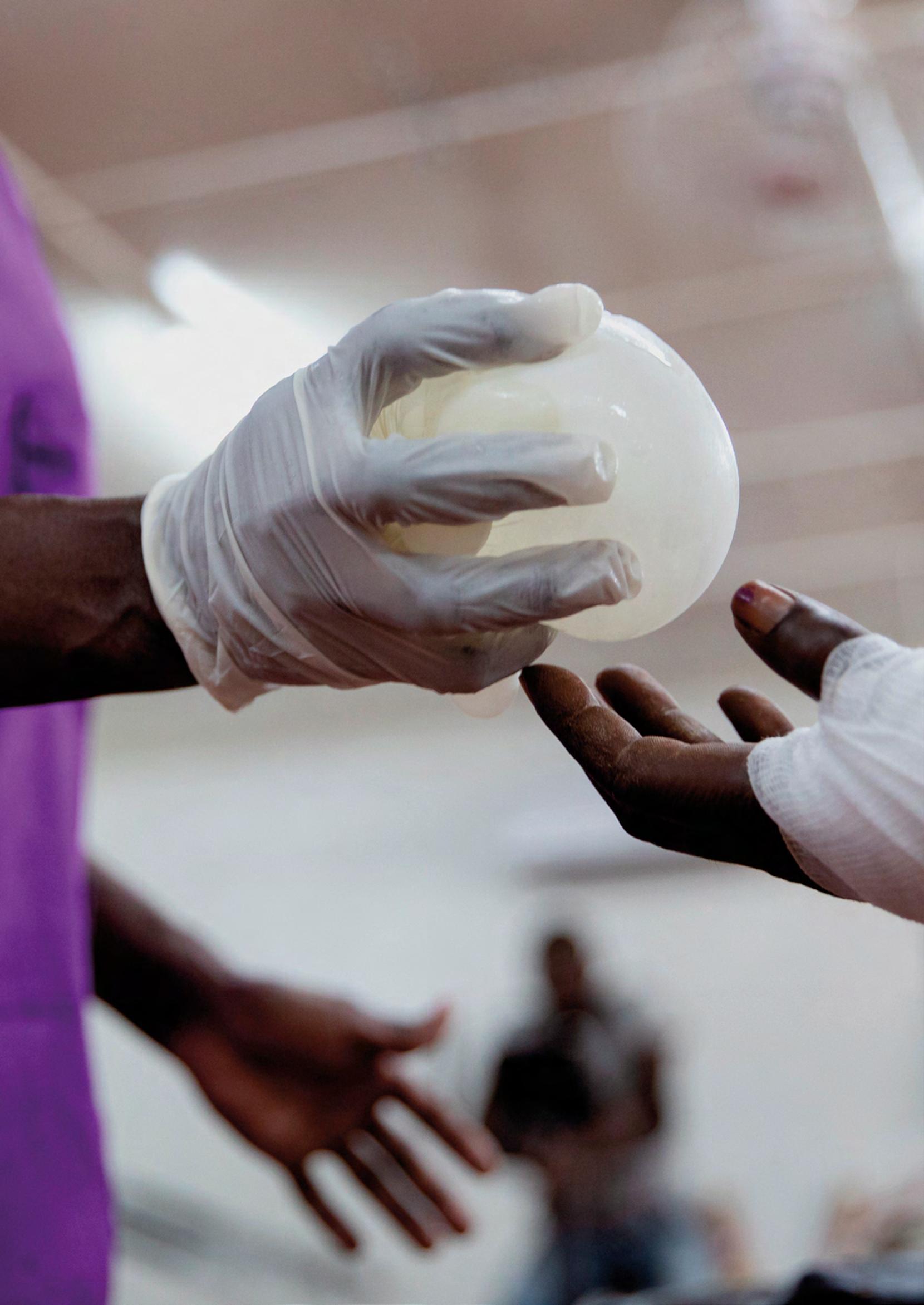 France practices exercises to regain motion in the physiotherapy department of the SICA hospital in Bangui, Central African Republic. © Adrienne Surprenant/Collectif Item for MSF
France practices exercises to regain motion in the physiotherapy department of the SICA hospital in Bangui, Central African Republic. © Adrienne Surprenant/Collectif Item for MSF
Médecins Sans Frontières is a private international association. The association is made up mainly of doctors and health sector workers and is also open to all other professions which might help in achieving its aims. All of its members agree to honour the following principles:
Médecins Sans Frontières provides assistance to populations in distress, to victims of natural or man-made disasters and to victims of armed conflict. They do so irrespective of race, religion, creed or political convictions.
Médecins Sans Frontières observes neutrality and impartiality in the name of universal medical ethics and the right to humanitarian assistance and claims full and unhindered freedom in the exercise of its functions.
Members undertake to respect their professional code of ethics and to maintain complete independence from all political, economic or religious powers.
As volunteers, members understand the risks and dangers of the missions they carry out and make no claim for themselves or their assigns for any form of compensation other than that which the association might be able to afford them.
From Tigray and Afghanistan to the developing impacts of COVID-19 and the climate, 2021 was a year of incredible complexity for people facing crisis and those working alongside them.
In situations of high complexity, Médecins Sans Frontières moves forward by returning to our fundamental principles. Medical ethics; independence, impartiality and neutrality; bearing witness—these are the principles that have underlined our work for the past half-century.
While the nature of the crises that people face, and the challenges we come up against as an organisation, have and will continue to change, these principles remain at the core of our identity. Their significance is that they ask us to remain accountable to patients and communities, and to recognise them at the centre of everything that we do.
In 2021, Médecins Sans Frontières marked 50 years as an organisation with a focus on reflecting on what we’ve learnt, the ways we need to adapt and improve, and on the humanity at the heart of it all.
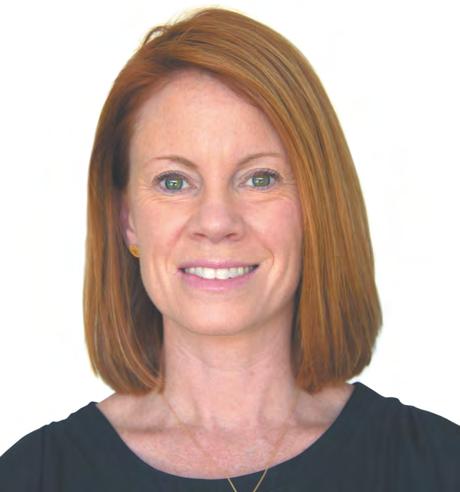
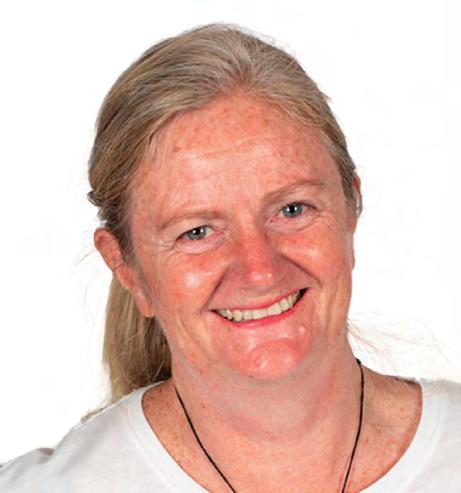
The space in which Médecins Sans Frontières, as a medical humanitarian organisation, works is becoming increasingly constricted, with targeted attacks on healthcare having direct impacts for our staff and the patients and communities we aim to assist.
In June 2021, three of our staff—Tedros Gebremariam Gebremichael, Yohannes Halefom Reda and María Hernández— were brutally killed while carrying out their work to aid people affected by violence in Tigray, northern Ethiopia. This senseless attack shocked the Médecins Sans Frontières community and we condemned this assault on their lives, and on medical humanitarian aid and those in need of it. We continue to honour the bravery and humanity of Tedros, Yohannes and María, and the loss suffered by their loved ones.
Indiscriminate violence, coupled with access constraints and administrative issues, made Tigray a hostile environment for humanitarian groups to work in 2021. Following this incident, in late July one Médecins Sans Frontières section was ordered to suspend activities in Ethiopia for three months. By November, none of our teams were working in Tigray, due to escalating insecurity, a lack of answers on the deaths of Tedros, Yohannes and María, and the impossibility of supplying and supporting teams. We continued to assist Tigrayan refugees across the border in Sudan.
Hundreds of thousands of people have been killed, injured or displaced by the conflict in Tigray, and the ongoing obstruction of humanitarian aid has had huge consequences for communities cut off from care and denied paths to safety.
Médecins Sans Frontières must constantly negotiate access to people and acceptance of our work. Since first working in Afghanistan in 1980, we have sought the explicit agreement of all parties to the conflict that we could run activities safely. This was no different in August 2021, when the Islamic Emirate of Afghanistan (the Taliban) entered Kabul in the last stage of a rapid retake of power after the withdrawal of coalition forces from Afghanistan earlier in the year.
Médecins Sans Frontières teams managed to keep all five of our projects in Herat, Helmand, Kandahar, Khost and Kunduz running throughout the takeover and have continued to provide care, including mother and child care, trauma care, tuberculosis diagnosis and treatment and services for displaced people. This is testament to our staff, in particular Afghan staff, who continued to stand by patients despite immense pressure and challenges.
By the second half of 2021, Afghans were facing not only huge medical needs, the withdrawal of international donor support and frozen funds and assets, but also a drought and deepening economic crisis. Médecins Sans Frontières witnessed the effects as increasing numbers of malnourished children arrived in our waiting rooms.
Katrina Penney President Médecins Sans Frontières Australia © MSF Jennifer Tierney Executive Director Médecins Sans Frontières Australia © MSFCOVID-19 has shown us that for health systems to better withstand the interwoven challenges of the climate crisis, epidemics and pandemics of increasing frequency, and complex conflicts, we will need to prioritise community-centredness, decentralisation, responsiveness to health needs, mobilisation of local supply chains and preventative strategies.
In 2021, the Southeast and East Asia and Pacific (SEEAP) partnership between the Médecins Sans Frontières offices of Australia, Japan and Hong Kong launched the Supply Project to offer regional options for medical supplies, with opportunity to lower costs and set up sustainable access to hard-to-acquire supplies. A psychosocial support team is now fully engaged in recruiting and training local professionals to support the mental health needs of staff working in Bangladesh, the Philippines, Malaysia and Thailand, and a new regional multi-lingual website has been developed to service the needs of new audiences and supporters across Asia.
Climate change is threatening to erode the resilience of communities and health systems, increasing people’s needs where they are already facing a lack of resources and access to care. It is also increasing, altering and accelerating the issues that Médecins Sans Frontières has traditionally responded to, including conflict and migration, extreme weather events, patterns of infectious diseases and water and food insecurity.
From the third consecutive year of floods to hit northern South Sudan, to the emergence of malaria in places it was not seen before, 2021 was a reminder of the urgency of the climate crisis.

Médecins Sans Frontières is increasingly applying a planetary health lens to our work, which means looking at how the environment is shaping the health of patients and communities. In 2021, Médecins Sans Frontières Australia funded ‘Climate SMART MSF’, a joint project of Operational Centre Geneva and Médecins Sans Frontières Canada. The initiative aims to help scale
environmentally sustainable solutions to future-proof and adapt our organisation, so it is responsible, responsive and resilient.
In the second year of the pandemic, we saw diagnostics, vaccines and treatments developed, but only made available to a small percentage of people. By the end of 2021, less than three per cent of people in low-income countries had received a vaccine dose; among them many health workers. The many ‘downstream’ impacts of the pandemic meant many patients requiring care for other conditions were going without.
Our teams opened COVID-19 treatment centres to care for patients, ran prevention activities and vaccinated high-risk groups of people in some countries; Australian and New Zealand donors supported these vaccination campaigns in Lebanon, Uganda and Eswatini. We also continued to advocate for fairer access to COVID-19 treatments and tools.
We need to make greater, and faster, progress on long-held inequalities within our organisation: this work directly relates to the wellbeing, safety and dignity of both patients and staff. We are committed to remaining accountable and transparent throughout this process.
Part of this work, already underway, is the Rewards Review process which aims to transform Médecins Sans Frontières’ contracting and rewards policies and practices to ensure that they are adapted to a global, diverse workforce, and meet our evolving operational and organisational needs. As our organisation has grown and become more complex, this review will contribute to us becoming more equitable, just and global.
Between severe flooding and COVID-19, Australia and New Zealand were no strangers to complexity and challenging circumstances in 2021. Despite this, our supporters have continued to care, reach out, and give generously. We sincerely thank you for your invaluable commitment and trust, which directly supports so many people in crisis. We look forward to reflecting on our lessons, and driving progress, together with many of you in the next year.
A man surveys the damage to his home in Bisober village, inflicted during the conflict in Tigray, Ethiopia. © Eduardo Soteras Jalil Médecins Sans Frontières Australia Annual Activity Impact Report 2021 –In 2021 the Medical Unit contributed to improvements in care for women’s health, paediatrics and paediatric nursing, and sexual violence care by continuing to invest in new packages of care, staff and research.
After the sense that globally we were all going through the COVID-19 pandemic together in 2020, 2021 was a year of divergence. Although COVID-19 vaccines became available, access to them was far from equal or equitable. People’s experiences were very different based on where they lived, and their access to healthcare overall continued to be compromised.
On the other hand, the pandemic had an equalising effect by showing that teams didn’t need to be physically located in the same place to work effectively. In Médecins Sans Frontières, sharing knowledge online also became an important tool to empower our operational colleagues in their practice.
For the Medical Unit we also seized the moment to reorganise and become more diverse. We now have more than half the team located outside Australia working in places closer to Médecins Sans Frontières projects.
A year ago I shared with you how we had implemented a “simple package” for treatment of the serious and chronic blood disorder sickle cell disease in our project in Madarounfa, Niger. Sickle cell disease is particularly prevalent in subSaharan Africa, often deadly in young children. One year on it’s exciting to report that the project has stepped up to a higher level with an advanced package of care through its introduction of a key medicine: hydroxyurea. Thanks to careful planning under the guidance of our paediatric advisors, the Madarounfa team can now offer a treatment regimen with hydroxyurea that reduces sickle
cell-related crisis events and improves survival—an important achievement for everyone involved.
In 2021 we also started to see the fruits of our important research project into abortion-related morbidity (illness) and mortality (death), the AMoCo study, which we commenced in 2017. The first study of its type to be conducted in fragile and conflict-affected settings, it completed data collection this past year, and we’ll be reporting the results in 2022. We look forward to adapting our care, and influencing others to do the same, in response to what we and our study partners learn about the experience of women and this neglected healthcare need.
Developing and supporting staff is an important goal in our strategic plan, and an essential one for improving quality of care. One example in 2021 was the launch of an internal knowledge base and community of practice for sexual violence care, to promote collective knowledgesharing and collaborative learning across the worldwide operations of Médecins Sans Frontières.
Although Médecins Sans Frontières continues to try to avoid silos in our medical approach, we have six operational centres, and typically communities of practice are attached to an individual centre. So it was very exciting to have the sexual violence care advisors from all centres collaborating on this through its inception and development. Now we have a curated knowledge base and moderated space where practitioners in our field project teams can share experiences about implementation and learn from each
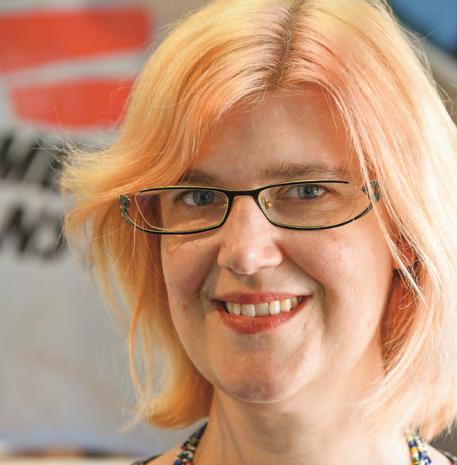 Dr Claire Fotheringham Head of Medical Unit
Médecins Sans Frontières Australia © MSF
Dr Claire Fotheringham Head of Medical Unit
Médecins Sans Frontières Australia © MSF
other. This was a very big project and it was very rewarding to see early signs of engagement after the launch.
Promoting the role of nurses and strengthening nursing care are also part of our strategic goals, and in 2021 our paediatric and neonatal nursing advisor, along with her international colleagues, developed and implemented two important nursing resources as part of the new Neonatal Nursing Care Package: the Neonatal Injectable Medication Handbook and the Neonatal Nursing Care Handbook. Resources such as these enable us to share up-to-date, evidence-based practice with our nurses and nursing care providers and ensure the delivery of quality nursing care to our patients and their families as the years continue.
With COVID-19 vaccines and boosters available and borders opening up again in 2022, we look forward to working in person with colleagues, visiting projects and renewing our bonds. At the same time we’ll be able to take advantage of what we’ve learned about working remotely as effective and impactful teams, especially as we bring on new team members in different locations.
This includes a second full-time midwife (joining one of our paediatricians in Dakar, Senegal), to increase the amount of midwifery advice we can provide for our projects in the women’s health portfolio. Our obstetrician will continue to provide their expertise in complications of pregnancy and support the midwives, but by strengthening our midwifery advisor team we will be able to double our work on respectful maternity care, patientcentred care and quality of care for the mother-baby dyad.

Sadly, in 2022 we say farewell to a longstanding member of the Medical Unit, sexual violence care advisor Margaret Bell. She has done amazing work in a neglected area of care. She has also contributed hugely to Médecins Sans Frontières Australia as a whole. We share our best wishes for her new ventures.
Médecins Sans Frontières Australia’s strategic plan 2021-23 includes the goal to have successfully championed the role of nurses and midwives in the organisation. Despite making up the largest part of the Médecins Sans Frontières global healthcare workforce and providing the most frequent and sustained face-to-face care to patients, nurses and midwives have been professionally undervalued and under-resourced in Médecins Sans Frontières, and this needs to change.
To this end, the Medical Unit strongly supported the motion raised by the Médecins Sans Frontières Australia Association at the International General Assembly in 2021. The motion called for meaningful inclusion of nurses and midwives in leadership and governance to guide strategy and policy at the highest decision-making levels , including through dedicated roles such as nursing directors; for nurses and midwives to be equipped with the requisite skills and competencies to meet patient needs, and to ensure that medical-humanitarian action benefits from the full extent of their education and training; for a more progressive, interdisciplinary approach that reflects the reality of projects and mirrors international best practice standards; and for a broadened scope to operational research to improve nursing and midwifery practice. We were very happy to see it passed.
Midiwfe Nene Sow talks with a patient after screening her for breast and cervical cancer at the MSF-supported Gabriel Toure University Hospital, Bamako, Mali. © Fatoumata Tioye Coulibaly.This is a comprehensive list of all professionals from Australia and New Zealand who were working in Médecins Sans Frontières projects in 2021. Our staff filled 113 departures during the year, contributing to an international workforce of more than 41,000 staff (full time equivalents).
AFGHANISTAN
Christopher Arnott
Anaesthetist
Christopher Binks
Nursing Activity Manager
Jessica Charlston
Nursing Team Supervisor
Kathrine Charlton
Midwife
Prue Coakley
Project Coordinator
Louisa Cormack
Project Coordinator
Jeffrey Fischer
Technical Project Coordinator
Jane Hancock
Nursing Activity Manager
Shelley Harris-Studdart
Midwife Activity Manager
Neville Kelly
Logistics Manager
Natacha Maher
Nursing Activity Manager
Brian Moller
Head of Mission
Tim Pont
Paediatrician
Peter Saunders
Specialised Doctor
BANGLADESH
Natasha Allan
Nursing Activity Manager
Isaac Chesters
Project Finance and HR Manager
Matthew Gosney
Project Finance and HR Manager
Vino Ramasamy HR Coordinator
CHAD
Mikael Burhin
Nursing Team Supervisor
DEMOCRATIC REPUBLIC OF CONGO
Rodolphe Brauner
Project Coordinator
Kaheba Clement Honda
Nursing Activity Manager
Stella Smith
Project Coordinator
ETHIOPIA
Chamath Ariyasinghe
Doctor
Lucy Butler
Finance and HR Coordinator
Kathrine Charlton
Midwife Activity Manager
Shaun Cornelius
Technical Logistics Manager
Jeni Flavell
Nursing Activity Manager
Jairam Kamala
Ramakrishnan
Mental Health Activity Manager
Lisa Searle
Medical Advisor
Rebecca Smith Nursing Activity Manager
GREECE
Aiesha Ali Pharmacy Manager
Malcolm Hugo Mental Health Activity Manager Coordinator
HAITI
Rachel Robertson Medical Activity Manager
Suzel Wiegert Nursing Activity Manager
INDIA
Justine Cain Medical Activity Manager
Rachel Tullet
Medical Advisor
IRAQ Paul Blackery ER Doctor
Jacob Coleman
Nursing Activity Manager
Courtney Dowd ER Doctor
Matthew Gosney
Personnel Administration Manager
Catherine Moody
Head of Mission
Kitrina Norrish Laboratory Manager
JORDAN
Luke Morris
Technical Advisor
Caterina Schneider-King
Finance and HR Coordinator
KENYA
Frederick Cutts
Technical Advisor
Sayontonee Ghosh
Doctor
Adam Pettigrew
Technical Advisor
LEBANON
Christopher Binks
Nurse Specialist Supervisor
Ciara Corrigan
Nursing Activity Manager
LIBERIA
Katherine Franklin Paediatrician
Anna Haskovec
Logistics Team Leader
Mia Kelly-Johnson Logistics Manager
Charlotte Ogilvy Doctor
Tim Pont Paediatrician
Anita Williams
Specialised Activity Manager
LIBYA
Chloe Basford
Nursing Activity Manager
Anna Haskovec Logistics Coordinator
Kitrina Norrish
Laboratory Manager
Steven Purbrick
Head of Mission
Sally Thomas Project Coordinator
MALAWI
Natasha Allan
Nursing Activity Manager
Natasha Blucher
Mental Health Supervisor
Anna-Sofia Lehner
Mental Health Activity Manager
Adam Pettigrew
Electricity Manager
Dustin Sim
Project Pharmacy Manager
MEDITERRANEAN
SEA RESCUE
Catherine Flanigan
Medical Advisor
Eloise Liddy
Communications Manager
Georgina Woolveridge
Doctor
MYANMAR
Sophie Alpen
Medical Activity Manager
Susan Bucknell
Project Coordinator
Hannah Rice
Sexual Violence Program Activity Manager
NIGERIA
Lucy Butler
Finance and HR Coordinator
Tanya Coombes
Project HR Manager
Kartika Sari Henry
Laboratory Manager
Stephanie Johnston
Pharmacist
Candice Lynch
Laboratory Manager
Allen Murphy
Project Coordinator
Ben Shearman
Logistics Deputy Coordinator
Chloe Simpson
IECHP Manager
PAKISTAN
Andrea Atkinson
Obstetrician-Gynaecologist
Lucy Butler
Finance and HR Manager
Kathrine Charlton
Midwife Activity Manager
Madeleine Finney-Brown
Paediatrician
Alyson Penny Midwife
PALESTINE
Ivan Cerrafon
Project Supply Chain Manager
Courtney Dowd
Doctor
Sarah Graham
Clinical Psychologist
Abbie Hamilton
Nursing Team Supervisor
Michael Hoey
Finance Manager
Amal Ibrahim
Psychologist
Jake Miocic
Project Finance Manager
Rachel Robertson
Medical Activity Manager
Thomas Schaefer
Orthopaedic Surgeon
Ben Shearman
Logistics Team Leader
Natalie Thurtle
Medical Coordinator
Scarlett Wong
Mental Health Activity Manager
PAPUA NEW GUINEA
Lindsay Croghan
Logistics Manager
Sarah Gnanaseharam
Nursing Activity Manager
Amiee Groundwater
Construction Manager
Rebecca King
Logistics Manager
Jessica Meagher
Doctor
Kate Neary
Project Finance and HR Manager
PHILIPPINES
Elaine Clark
Anaesthetist
William Johnson
Technical Advisor
SIERRA LEONE
Aiesha Ali
Pharmacy Manager
Jennifer Duncombe
Head of Mission
Adelene Hilbig
Doctor
Karlie Proctor
Nursing Activity Manager
Robert Salvemini
Doctor
Rachel Sun
Pharmacy Manager
Jeanne Vidal
Water and Sanitation
Team Leader
SOMALIA
Luke Brouwer
Technical Advisor
Adam Mangal
Electricity Manager
Zoe Murray
Nursing Activity Manager
SOUTH AFRICA
Rachel Tullet
Medical Advisor
SOUTH SUDAN
Maia Blenkinsop
Infection Prevention and Control Manager
Joanne Clarke
Paediatrician
Hugo De Vries
Construction Manager
Anne Dessagne
HR Manager
Madeleine Finney-Brown
Paediatrician
Jeffrey Fischer
Construction Manager
Rhianon Hutcheson
Nurse Specialist Supervisor
Vivegan Jayaretnam
Project Coordinator
Piotr Konopka
Anaesthetist
Rodney Miller Project Coordinator
Heather Moody
Hospital Facilities Manager
Miho Saito
Midwife Activity Manager
Zoe Stephenson
Paediatrician
Emily Young
Nursing Team Supervisor
SUDAN
Rodolphe Brauner
Project Coordinator
Tecwyn Davies
Doctor
Tanyth De Gooyer
Epidemiology Activity Manager
Alec Kelly
Construction Manager
Anna-Sofia Lehner
Mental Health Activity Manager
Natalie Park
Nursing Activity Manager
Francoise Pierre
Midwife Supervisor
Narelle Raiss
Nursing Activity Manager
Kiera Sargeant
Medical Coordinator
Amanda Skene
Midwife Activity Manager
Georgina Woolveridge
Medical Activity Manager
SYRIA
Malaika El Amrani
Nursing Activity Manager
Catherine Flanigan
Specialised Activity Manager
Sarah Gnanaseharam
Nursing Activity Manager
Alec Kelly
Logistics Manager
Rodney Miller
Project Coordinator
Sam Templeman Medical Coordinator
TAJIKISTAN
Trudy Rosenwald
Mental Health Activity Manager
Arunn Jegan
Head of Mission
TURKEY
Caterina Schneider-King
Finance and HR Coordinator
UGANDA
Virginia Lee
Mental Health Activity Manager
UKRAINE
Thomas Hing
Supply Chain Deputy Coordinator
UNITED ARAB EMIRATES
Adina Dessauer
Specialised Activity Manager
VENEZUELA
Sumitra Mahendran
Project Finance and HR Manager
YEMEN
Hannah Brown
Anaesthetist
Susan Bucknell
Project Coordinator
Louisa Cormack
Head of Mission
Shelley Harris-Studdart
Midwife Activity Manager
Annie Lee
Nursing Activity Manager
Allen Murphy
Project Coordinator
Robert Salvemini
Doctor
Louise Timbs
Head Nurse
Jessie Watson
Project Finance and HR Manager
Rose Wilson
Nursing Activity Manager
Heidi Woods Lehnen
Medical Advisor
VARIOUS/OTHER
Megan Graham
Finance Coordinator
Madeleine Anne Habib
Logistics Team Leader
Jessa Pontevedra
Medical Coordinator
Kiera Sargeant Medical Coordinator
Kyla Ulmer
Project Coordinator
*‘Paramedical’ includes all health professionals who are not doctors. In 2021, Médecins Sans Frontières Australia supported 113 departures of professionals from Australia and New Zealand, to 33 countries.
The 2021 income of Médecins Sans Frontières Australia and Médecins Sans Frontières New Zealand totalled $112.8 million. Of this, $105.5 million was generated from fundraising activities. This is a 8.7 per cent increase from 2020 fundraising income and represents continued generous support from the Australian and New Zealand public.
Approximately 109,136 Australians and New Zealanders participated in the field partner program in 2021, contributing on a monthly basis to Médecins Sans Frontières Australia and Médecins Sans Frontières New Zealand, and another 44,671 provided occasional gifts.
Spending on our social mission was 75.2 per cent of total expenditure, which is the same level of spending as 2020. Consistent with previous years, this was split between projects run by Operational Centre Paris and Operational Centre Geneva.
Our investment policy within Australia remained consistent with previous years. Short term deposits were used to maximise interest, minimise risk and ensure flexibility and accessibility of funds when required. Médecins Sans Frontières Australia continues to rely on the support of volunteers both in the field and in the office. The estimated total salaries forgone by field workers for 2021 was $1.75 million (compared with $2.7 million in 2020) and for office volunteers, $56,700 (compared wih $18,000 in 2020). Additionally, the Board of Directors (except for the President who receives a partial salary) and Association members freely gave their time to Médecins Sans Frontières. The estimated value of the time provided by the Board and the Members was approximately $425,000 (compared with $418,000 in 2020). In 2021, $613,000 was spent on the Southeast and East Asia and Pacific (SEEAP) project (compared with $440,000 in 2020).
In 2021, Médecins Sans Frontières ran medical humanitarian projects in 70 countries. Australian and New Zealand donors supported work in 35 of those countries. Médecins Sans Frontières projects are run by six operational centres (Amsterdam, Barcelona, Brussels, Geneva, Paris and West and Central Africa). The Australian section is a partner of the Paris and Geneva operational centres, and Australian and New Zealand donors contribute funding to projects run by both Paris and Geneva. Australians and New Zealanders also fill field roles run by all operational centres.
Received AU and NZ funding
Received funding from other MSF Offices
Based on funding by Australian and New Zealand donors
NIGER $5,950,000
YEMEN $5,587,914
SUDAN $4,297,232
PAPUA NEW GUINEA $4,111,919
MALAWI $3,900,000
Top-supported countries based on the number of Australian and New Zealand staff departures
PALESTINE 10 YEMEN 8
ETHIOPIA 8 AFGHANISTAN 7
SOUTH SUDAN 8
SUDAN 7
*Extra funding included in ‘other projects’ All figures are in Australian dollars
“Our principles... ask us to remain accountable to patients and communities, and to recognise them at the centre of everything that we do.”
- Katrina Penney, President, and Jennifer Tierney, Executive Director
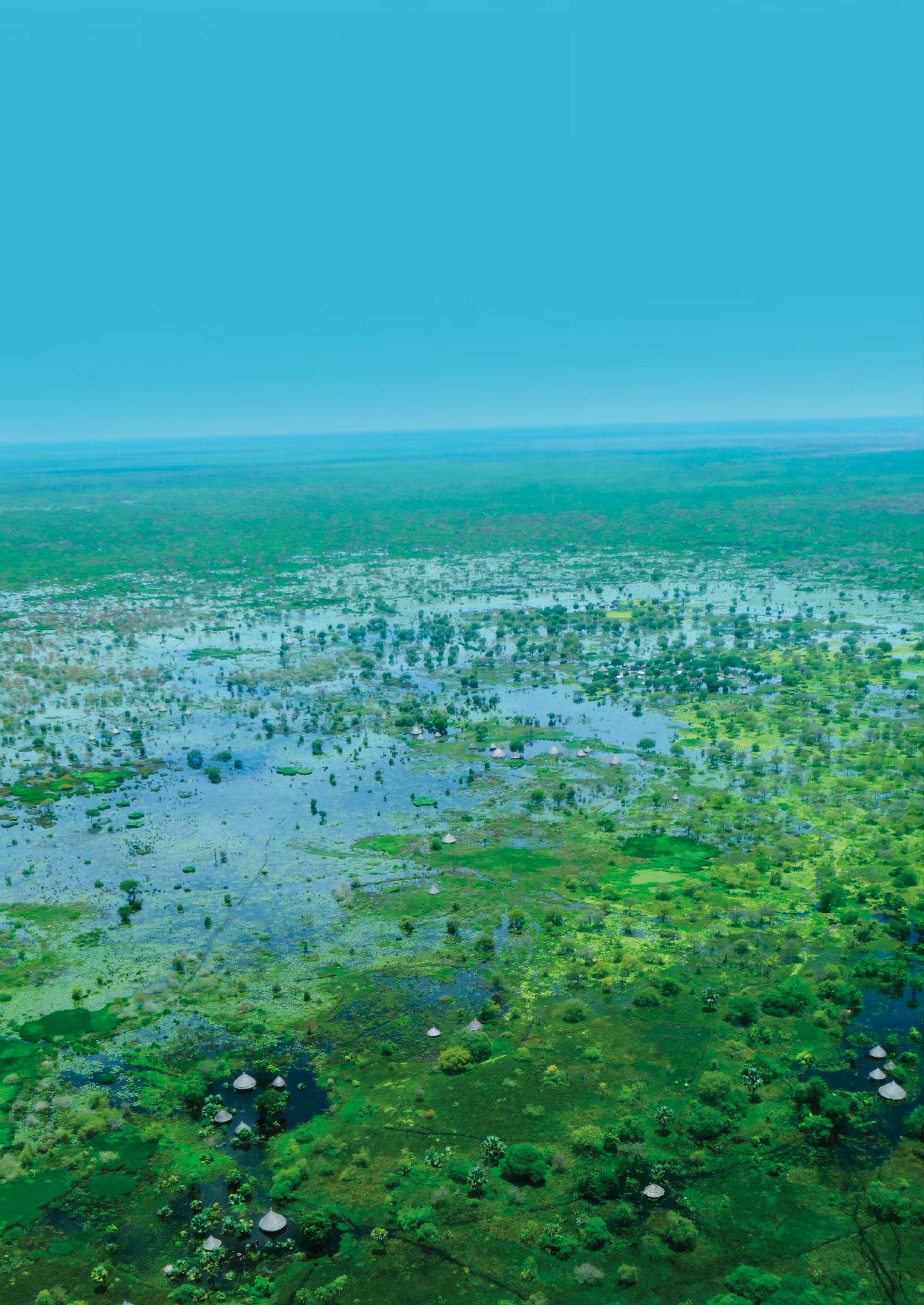
This section describes those projects supported by the generous donations made to Médecins Sans Frontières Australia and Médecins Sans Frontières New Zealand in 2021. Papua New Guinea, Niger, Malawi, Sudan and Yemen were the top-funded countries in 2021, and are followed by all other projects funded by Australian and New Zealand donors. For a complete record of Médecins Sans Frontières’ work in 2021, including projects funded through other Médecins Sans Frontières sections, please visit www.msf.org/resource-centre.
refers to the types of care provided by Médecins Sans Frontières teams in the country in 2021.
highlights a primary achievement of Médecins Sans Frontières teams in the country in 2021, thanks to our supporters.
refers to the number of full-time Project staff in projects run by Operational Centre Paris and Operational Centre Geneva in 2021.
refers to the total cost of the projects described in the country description for 2021 (projects run by Operational Centre Paris and/ or Operational Centre Geneva). All amounts are in Australian dollars.
refers to Médecins Sans Frontières Australia supporters’ contribution to the country’s projects in 2021. All amounts are in Australian dollars.
refers to Médecins Sans Frontières New Zealand supporters’ contribution to the country’s projects in 2021. All amounts are in Australian dollars.
The maps and place names used in this report do not reflect any position by Médecins Sans Frontières on their legal status. An aerial view of a flood-affected area of Fangak County, South Sudan, showing homes surrounded by water. © Damaris Giuliana/MSFIn Papua New Guinea (PNG), Médecins Sans Frontières focused on improving tuberculosis (TB) care, particularly for patients with drugresistant forms of the disease.

In July 2021, handover of the TB project in Kerema to health authorities after seven years was completed, with support to ensure the program’s ongoing viability. The program included screening, diagnosis, inpatient care, awarenessraising activities and patient followup. Of the almost 4,000 TB patients diagnosed between 2014 and 2021, more than 2,000 completed their treatment and 1,000 were cured.
In the capital, Port Moresby, activities in the Six Mile district were expanded after Médecins Sans Frontières noticed that a significant proportion of new multidrug-resistant TB (MDR-TB) patients were coming from this area. We implemented activities to curb the spread of the disease by screening contacts
of confirmed TB patients and offering them preventive treatment. Médecins Sans Frontières also assisted with the rehabilitation of government facilities and the construction of a new TB clinic and laboratory.
For MDR-TB patients, Médecins Sans Frontières initiated treatment with all-oral regimens that improved treatment outcomes.
Supporting during COVID-19
While PNG did not experience major COVID-19 outbreaks until March 2021, the rapid increase in cases after that stretched the health system to the point of collapse. Médecins Sans Frontières supported a national treatment facility in Port Moresby, which had 43 beds for moderately to severely ill patients.
PORT MORESBY
locations funded by Australian and New Zealand donors
IMPACT:
12,023 consultations and 4,280 screenings for TB conducted, and 788 patients initiated on treatment. The outcomes success rate was 92 per cent.
PROJECT STAFF: 126
FUNDING:
TOTAL AU $6,066,428 $3,900,000 NZ $211,919
KEY ACTIVITIES
COVID-19 care, tuberculosis (particularly multi-drug resistant tuberculosis) care.
ProjectMédecins Sans Frontières scaled up activities in Niger in 2021 in response to the volatile humanitarian situation, caused by conflict, internal displacement, chronic food insecurity and disease outbreaks.
In Niger, floods, droughts and agricultural shortfalls exacerbated food insecurity and people often struggled to access basic services, including healthcare.
Zinder region
In Zinder, the combination of an early malaria peak and a poor agricultural season led to a significant increase in the number of paediatric patients. Médecins Sans Frontières also saw an unprecedented number of severely malnourished children coming across the border from Nigeria. At the Magaria hospital, we set up observation rooms with extended observation time from 24 to 48 hours, which not only increased capacity but also relieved pressure on the inpatient wards. During the year, our teams admitted 37,179 children under the age of five years to the facility.
Meanwhile, we continued to develop preventive and community-based approaches to reduce the number of patients with complications from malnutrition, for example by providing early treatment for malaria, acute respiratory infections and diarrhoea. A total of 137,264 consultations were
provided by Médecins Sans Frontièrestrained community members.
Maradi region
At the Madarounfa district hospital, Médecins Sans Frontières offered inpatient therapeutic feeding for children under five years old and paediatric care, including treatment for chronic conditions such as sickle cell disease, HIV and tuberculosis. In 2021, we admitted 14,570 children to the paediatric unit and 9,601 children to the inpatient feeding centre. We also provided support to seven health centres in the district, with a focus on paediatric consultations, management of malaria and routine vaccinations. We supported 54 community malaria workers to manage cases at the community level, who provided 39,755 consultations throughout the year, as well as a team of health promoters.
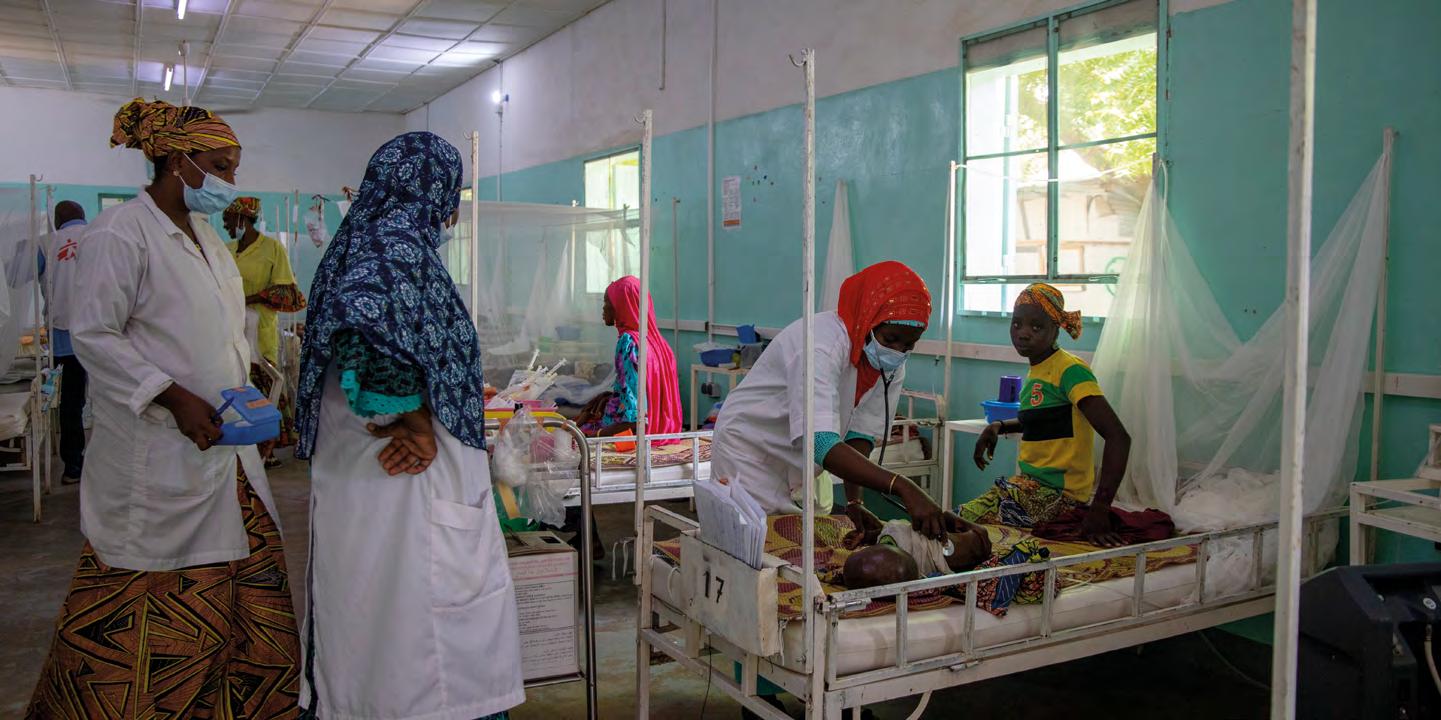
Throughout the year, Médecins Sans Frontières supported the health authorities’ responses to epidemics and floods in Maradi, Zinder, Niamey and Dosso regions, as well as vaccination campaigns against measles, meningitis and cholera.
IMPACT:
Improved monitoring and management of chronic diseases in Madarounfa, in particular sickle cell disease, with care extended for children up to 15 years of age and the launch of a patient cohort study.
PROJECT STAFF: 748.3
FUNDING: TOTAL AU $27,662,595 $5,950,000
Chronic disease management, malaria care, nutrition, paediatric care, vaccinations.
Project locations funded by Australian donors MADAROUNFA MAGARIA ZINDER NIAMEY DOSSO MARADI Every year in Niger, when the rainy season and the lean season begin, malaria and malnutrition cases rise particularly among children under five. In 2021 our teams increased their capacity to respond to the growing needs in the paediatric unit at Magaria’s hospital. © Mario Fawaz/MSF
NAME: Dr Maman Karsou
HOME: Magaria, Niger
ROLE: Emergency coordinator
In mid-2021 Dr Maman Karsou led a mass campaign in Niamey and Magaria in his homeland, Niger, to vaccinate more than 600,000 children against measles and meningitis in collaboration with the local Ministry of Health.
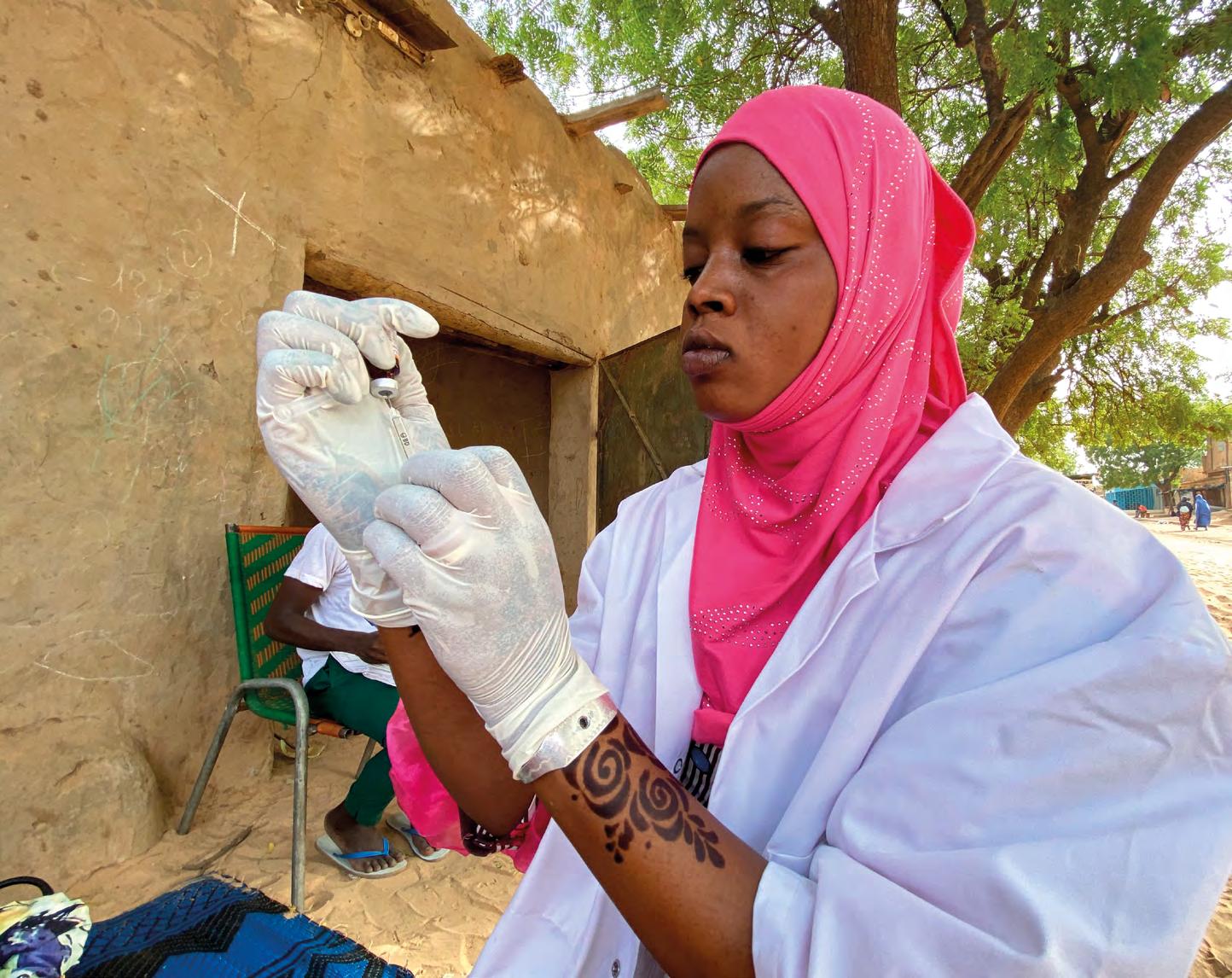
The first challenge we faced was the concerning decrease in immunisations compared to previous years. Our teams had to deal with rumours and false information that had been circulating around the coronavirus vaccine which had a significant influence on the regular immunisation schedule. People had doubts about the vaccines given to them and this was arguably our biggest challenge. The second challenge was the socio-economic impact on the health systems. We faced a delay in the procurement of the vaccine against meningitis and measles due to a decrease in the annual stock of vaccines in Niger.
Since the start of the COVID-19 pandemic, we saw a greater mobilisation of funding for the development of vaccines against the coronavirus all over the world. Yet, in countries that are more vulnerable to epidemics such as Niger, one does not replace the other.
An equitable distribution of funds must be secured to avoid a deterioration of the health situation in the country.
Beyond the challenges directly linked to COVID-19, there was a reality that we can no longer ignore: climate change is undeniably impacting the occurrence of epidemics.
During the dry season, heavy dust plays a role in the spread of meningitis, an airborne bacteria. With climate change the rainfall has become erratic and as a result we have seen cases of meningitis and measles remain high.
We need to step up our efforts in education and community engagement especially in contexts where rumours are widespread, which in turn dissuade people from being vaccinated. Correcting this is the responsibility of everyone: communities, authorities, medical and humanitarian organisations as well as financial partners.
Despite progress in tackling HIV, prevalence of the disease remains high in Malawi.
In 2021, Médecins Sans Frontières continued to run programs to improve care for HIV patients, as well as for women with cervical cancer.
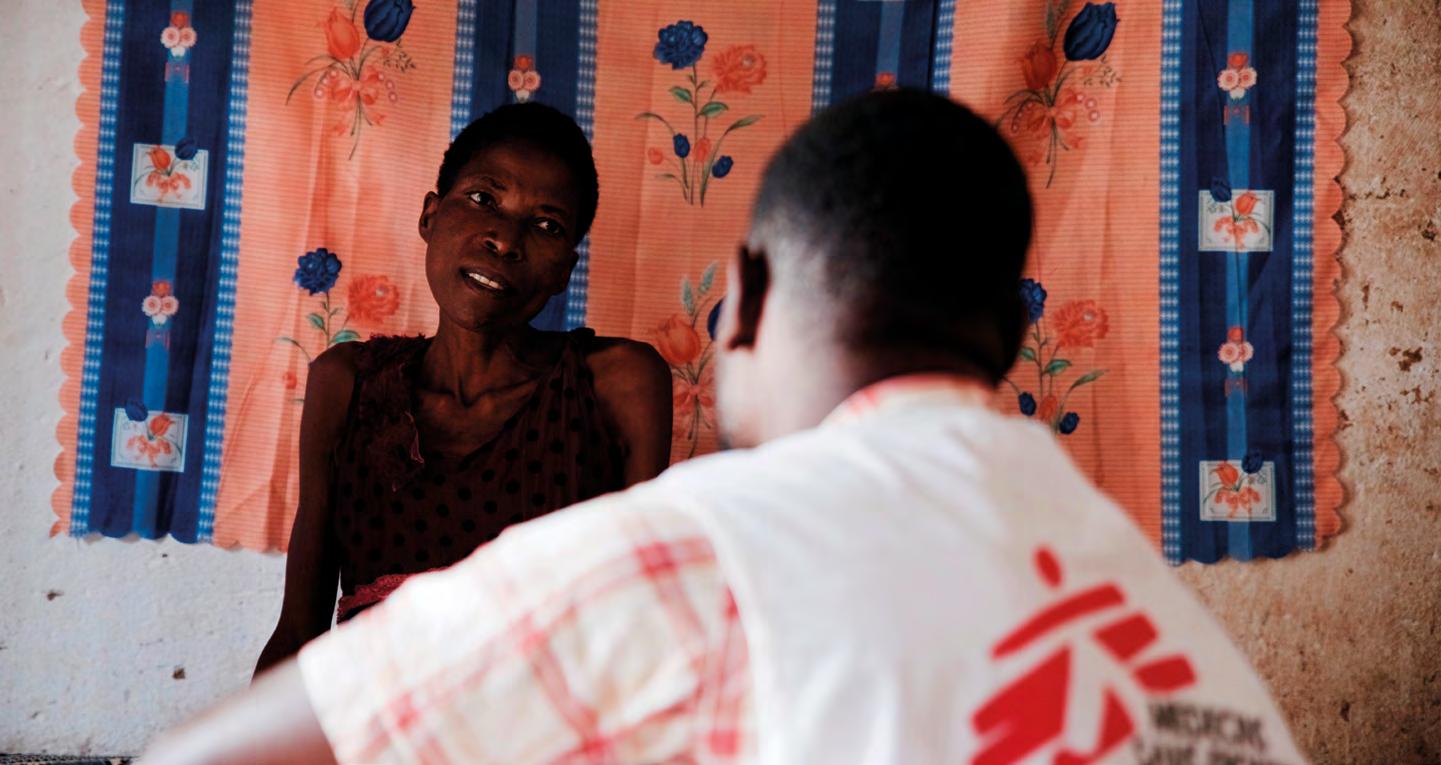
In Chiradzulu district, in southern Malawi, Médecins Sans Frontières focused on increasing early detection of HIV and improving care for people who need enhanced monitoring and specialist treatment, such as patients presenting with a high viral load or those suffering from mental health conditions, co-infections (including tuberculosis) or malnutrition. We also supported the Ministry of Health by following up severely sick and advanced HIV patients during their stay at Boma hospital and post-discharge.
Médecins Sans Frontières continued to run dedicated Saturday ‘teen clubs’, which offer HIV screening, care, follow-up and psychological support for younger patients. Attendance at these clubs, which provide a safe, friendly space where teenagers can benefit from peer support, has been shown to enhance adherence to treatment and a patient’s overall wellbeing.
In Blantyre district, Malawi’s main economic hub, Médecins Sans Frontières has developed a comprehensive oncological program in close collaboration with the Malawian Ministry of Health. In 2021 the program offered screening, diagnosis and treatment for cervical cancer, which accounts for 40 per cent of all cancers among women in Malawi and kills over 2,000 each year.
Based in Queen Elizabeth Hospital in the district’s main city, our activities included outpatient treatment for pre-cancerous and cancerous lesions, as well as surgery, chemotherapy and dedicated home-based palliative care for people in the advanced stages of the disease. The cervical cancer screening units were integrated in eight health centres in Blantyre and Chiradzulu districts, where we also ran a mobile screening unit.
Médecins Sans Frontières teams also supported the local health authorities’ response to the COVID-19 pandemic at Queen Elizabeth Hospital by providing additional staff, oxygen and medical supplies.
IMPACT: Patient support activities were offered to patients in our oncological program, including social support through psychosocial support, therapeutic education and transport vouchers.
PROJECT STAFF:
Cervical cancer care, COVID-19 activities, HIV care.
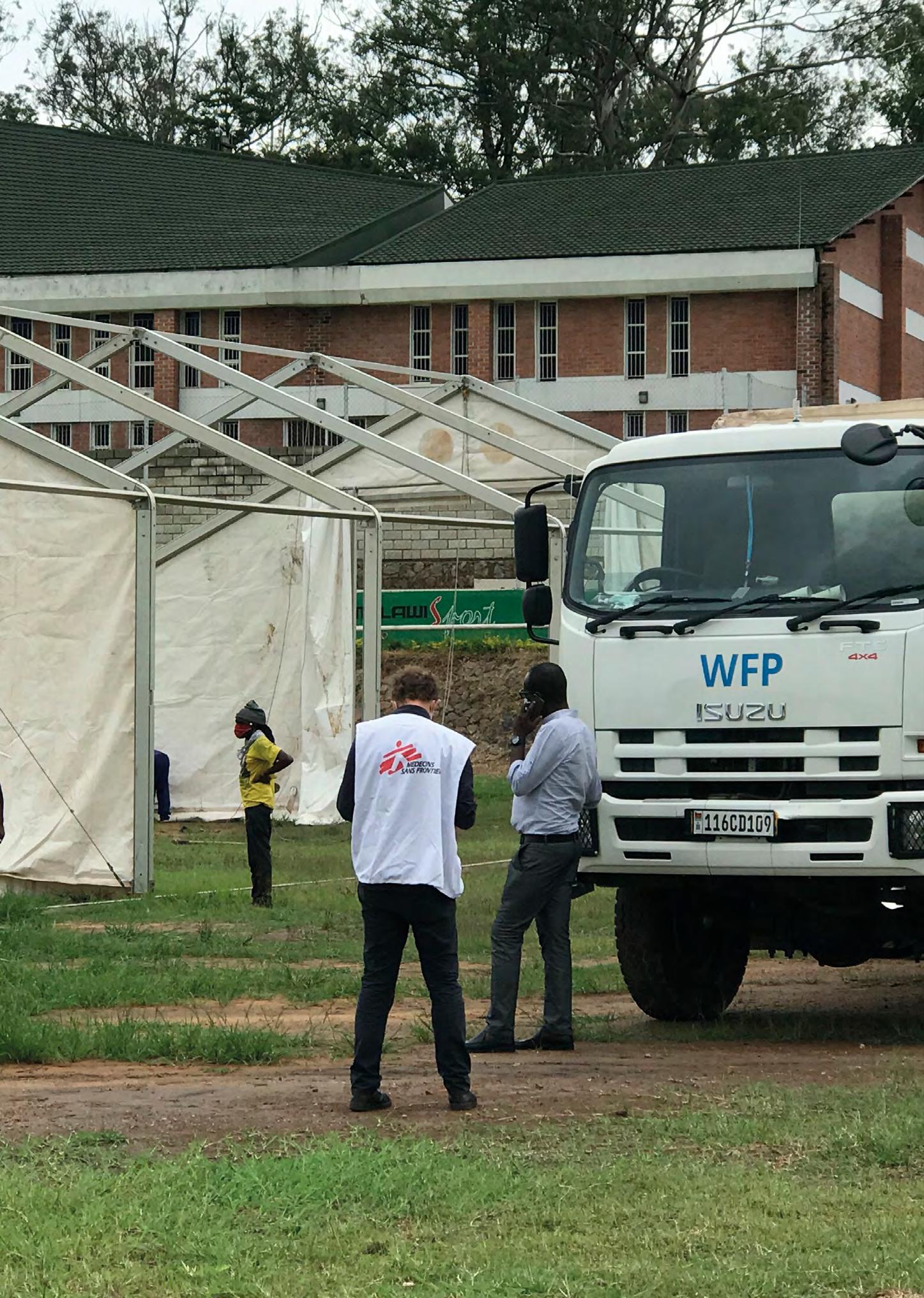
Sudan’s military takeover at the end of October 2021 prompted massive demonstrations across the country.
In response to the violent crackdowns that ensued, we launched a mass-casualty plan to support hospitals.
Médecins Sans Frontières teams in Omdurman, a city close to the capital Khartoum, worked in emergency rooms, trained staff in mass-casualty planning and donated medical supplies. When COVID-19 cases rose during the year, we ran health promotion activities in communities south of Khartoum.
In 2021, we continued to run our regular medical activities at Omdurman Teaching Hospital, providing basic healthcare and emergency services for refugees, displaced people and host communities.
Médecins Sans Frontières has been working in Al-Gedaref and Kassala states in eastern Sudan since November 2020, when conflict broke out in Tigray, Ethiopia, and people began fleeing across the border into Sudan.
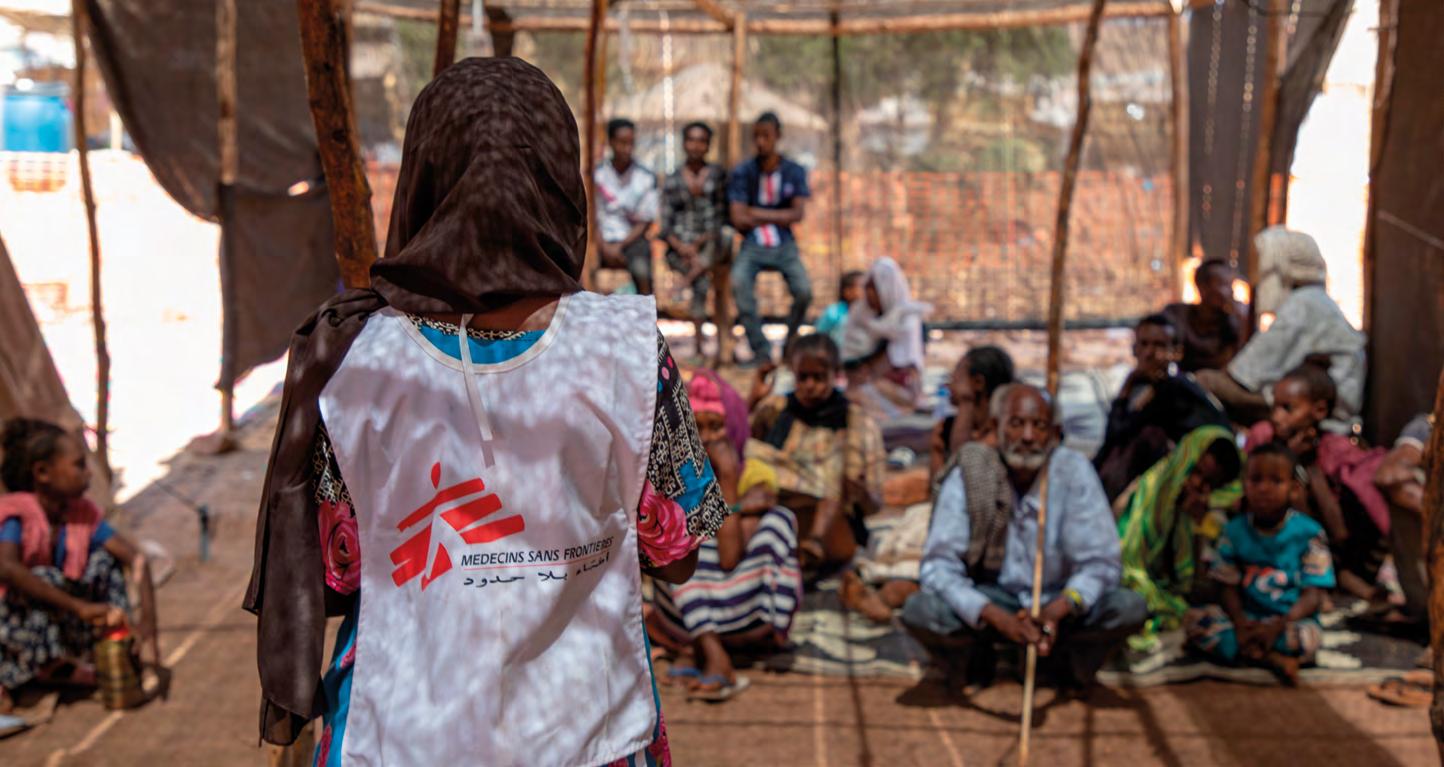
By June 2021, nearly 14,000 refugees were located in the transit and border area of Hamdayet (Kassala), where shelter, access to food, sanitation and clean drinking water continued to be an issue. Most refugees in Hamdayet, especially
those without shelter, were living in the village hosted by the local community. From Hamdayet, many people were being relocated to Um Rakuba and AlTanideba camps in Al-Gedaref state.
In 2021 Médecins Sans Frontières continued to assist both Ethiopian refugees and local communities in the two states, running activities via mobile clinics, health centres and hospitals. Our services included basic and maternal healthcare, vaccinations, malnutrition screening, mental healthcare, water and sanitation and treatment for neglected tropical diseases.
IMPACT:
Services provided at border crossing points, in refugee camps and in villages in Al-Gedaref and Kassala states to reach Ethiopian refugees and local communities, including construction of a field hospital in Um Rakuba camp.
PROJECT STAFF: 186.8
FUNDING: TOTAL AU $17,306,105 $3,720,485 NZ $576,747
Basic healthcare, COVID-19 health promotion, emergency care, nutrition, mass-casualty response, maternal healthcare, vaccinations, water and sanitation.
As of late June, more than 63,000 people had crossed from Tigray into Sudan as refugees. Most refugees in Sudan still didn’t have proper access to basic needs such as shelter, water and food.Project locations funded by Australian and New Zealand donors
Our teams were working at the points where refugees cross the border providing health checks, including screening for malnutrition.
we spread the message within the community that we could provide survivors with medical and psychological care.
NAME: Kiera Sargeant
HOME: Beachport, South Australia
ROLE: Medical coordinator
Kiera Sargeant was part of the team running Médecins Sans Frontières’ emergency response for refugees fleeing across the border into eastern Sudan from Tigray, northern Ethiopia, from November 2020 until January 2021.
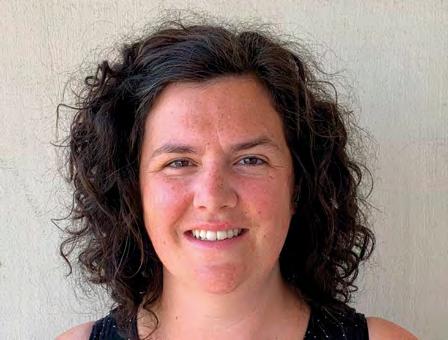
At first most people crossed into Sudan by swimming or wading across the fast-flowing river which marks the border with Ethiopia, while others crossed by boat or land. Initially people’s physical health condition was okay, as they had not travelled long distances. But [soon] we saw a shift, with new arrivals often exhausted and in a worse health condition due to the journey. Often people told us that they had to hide for days at different points until they could continue on their way.
The main medical conditions our teams saw were respiratory tract infections and acute watery diarrhoea, as well as people with chronic health conditions, such as diabetes and hypertension. We treated shrapnel and bullet wounds, and some (people) were expressing mental health related concerns to us. We heard reports of sexual violence and
The sudden influx of refugees put a strain on existing infrastructure and the health services in Sudan. This came on top of existing fuel shortages and steep inflation in Sudan, which caused logistical and financial difficulties for everyone involved. The pandemic also created challenges to bringing in experienced medical staff that were needed as there was already a shortage in the country.
Many of the refugees became separated from family members as they fled, so one of their main issues was concern for family and loved ones, due to the limited phone network in the Tigray region. We saw several unaccompanied children, most of whom were separated from their families as they ran away from their homes. We referred the children to the UN Refugee Agency’s (UNHCR) child protection services.
Hadahra, a refugee in Hamdayet, Sudan: “I am an old, sick woman so I eat little. But for the rest of my family, they go to the forest or to the river banks to collect wood to sell and then pay for food. They risked their lives and some of them were killed.” © MSF
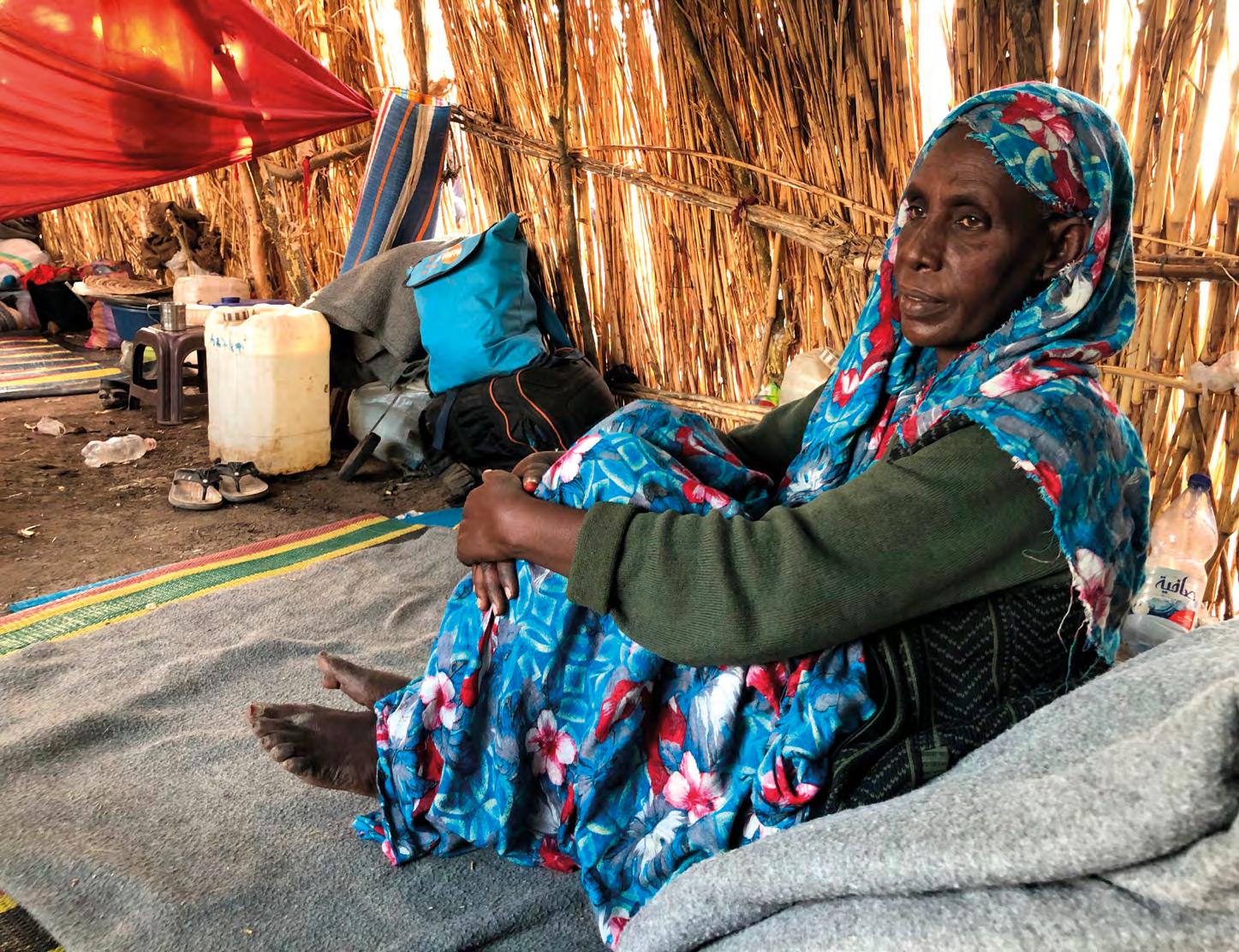
As the war in Yemen entered its seventh year in 2021, civilians continued to bear the brunt of the fighting. Many were injured, killed or displaced in clashes between the various groups.
The escalation of conflict between the warring parties increased the vulnerability of the Yemeni people. Médecins Sans Frontières not only provided lifesaving care to people injured in these outbreaks of violence, but also treated patients suffering the long-term effects of war, such as mental health conditions, malnutrition and difficulties in accessing essential services such as mother and child healthcare.
During 2021, we deployed teams to treat war-wounded patients across the country, from Mocha in the west to Marib in the east.
Our hospital in Mocha responded to multiple mass-casualty incidents in November as the frontline south of Hodeidah, where Ansar Allah was fighting a coalition of armed groups allied to the government, saw intense fighting.
The violence in Marib between Ansar Allah and Yemeni government forces was particularly fierce, forcing thousands of people to flee their homes. The camps where they settled often lacked basic necessities such as food, water and adequate shelter. In March, we launched an emergency response in Marib General Hospital and worked throughout the year to increase its capacity to deal with frequent influxes of warwounded and other trauma patients.
In Aden, we continued to run a trauma hospital treating people for war-related injuries as well as injuries from traffic accidents, providing surgery and comprehensive post-operative care.
In northern Yemen, Médecins Sans Frontières’ projects at the rural hospital of Ad-Dahi and Al-Salakhanah hospital in Hodeidah, and in Khamir, in Amran, recorded slight increases in the numbers of malnourished children treated.
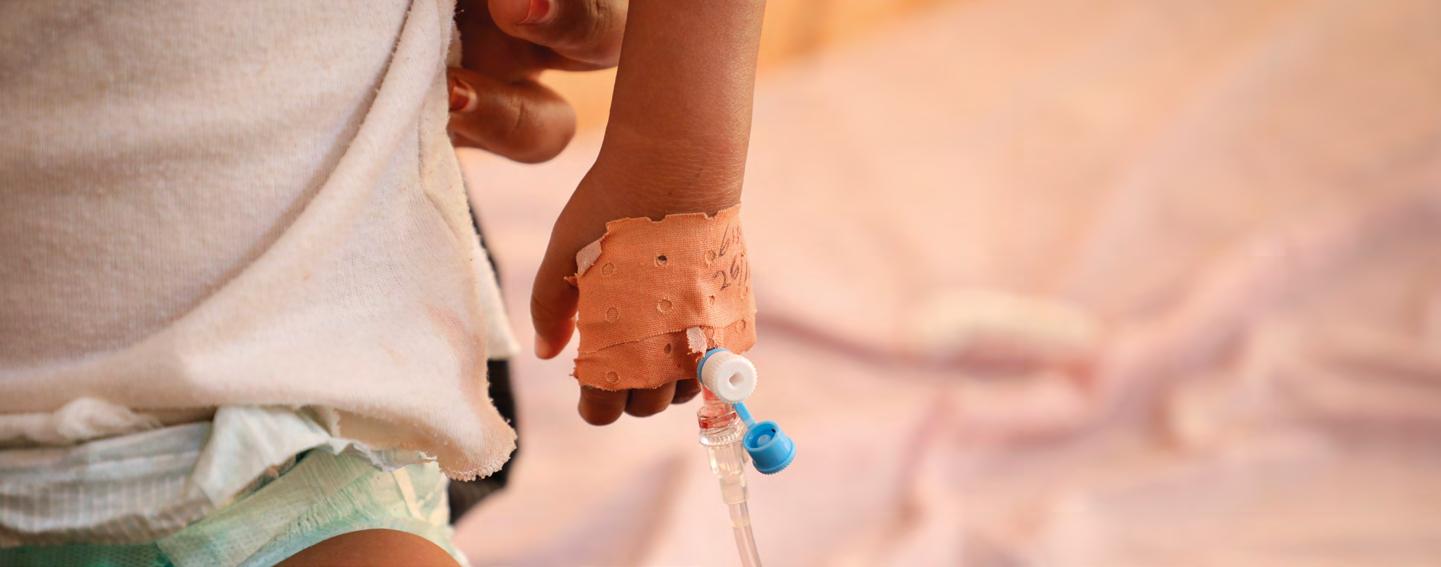
Much of the malnutrition we saw in Yemen was caused by a lack of access to basic healthcare for children—if children become ill and cannot get the treatment they need, they are much more likely to become malnourished. Inflation also made it increasingly difficult for Yemenis to feed their children and afford the cost of transporting them to hospital, which contributes both to malnutrition and the late treatment of illnesses.
In Ad-Dahi, we supported inpatient services, including paediatric and neonatal care, and the emergency room, while in Al-Salakhanah, we managed the emergency ward, operating theatre, intensive care unit and inpatient department.
In Khamir, we continued to support a Ministry of Health-run hospital with a focus on trauma care and mother and child healthcare. Timely access to safe and good-quality medical care for expectant mothers and newborns is a major issue across Yemen, with needs vastly exceeding available resources.
IMPACT:
Mental healthcare integrated into our programs in Ad-Dahi and Al-Salakhanah hospitals by the end of 2021.
PROJECT STAFF: 1,204.8
FUNDING:
TOTAL AU $57,664,002 $5,022,797 NZ $565,117
COVID-19 care, maternal, neonatal and paediatric healthcare, mental healthcare, nutrition, trauma care.
A baby is treated at the Ad-Dahi rural hospital in Hodeidah after her mother brought her in with a high fever. © Majd Aljunaid/MSF
In Ibb, one of the most populated governorates in Yemen, Médecins Sans Frontières continued to run the emergency room, operating theatre, intensive care unit and inpatient department in AlQaida general hospital. We performed an average of 310 surgical interventions per month, reaching a total of 4,135 during the year, and trained the local team to ensure preparedness in case of mass casualty events. Individual and group mental health sessions were also provided in the hospital. We also donated medical equipment and supplies to the maternity department and X-ray unit.
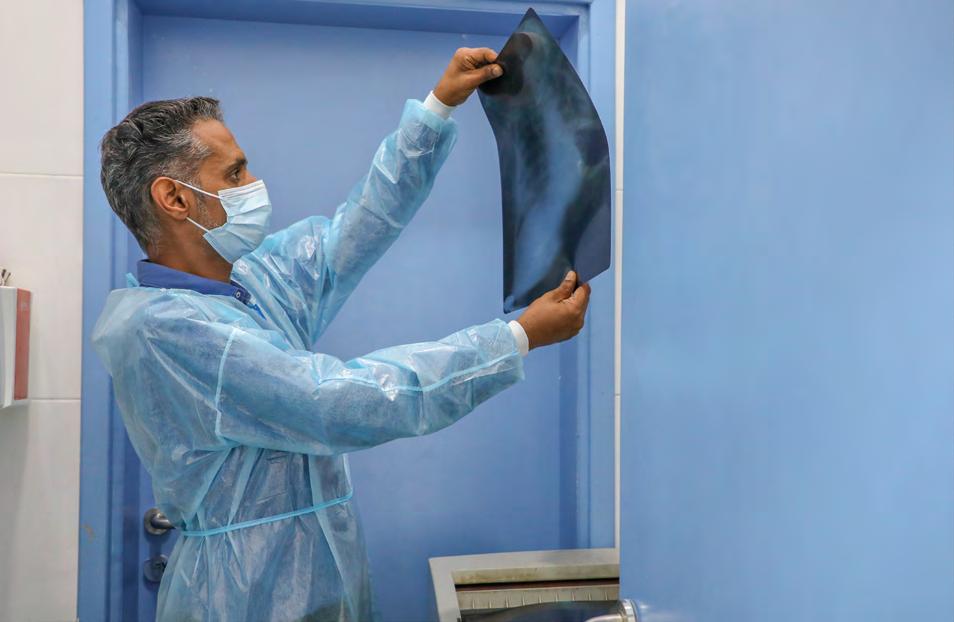
The COVID-19 pandemic continued to have a severe impact on Yemen in 2021, with peaks of the disease in spring and autumn. Médecins Sans Frontières managed treatment centres in Sana’a and Aden, where we ran some of the country’s only intensive care units. Death rates were high, and we know that many people in remote areas were unable to obtain treatment because it was not available locally and they could not afford to travel to the cities where we were working.
Rumours and misinformation about COVID-19 circulated freely, exacerbating fears of the disease and stigmatisation of those affected by it. Moreover, the Ansar Allah authorities continued to
refuse to address the spread of the virus publicly. Their refusal to use the vaccine, combined with other factors, such as issues with the supply of doses and the roll-out of vaccinations in government-controlled areas, as well as public distrust, meant that Yemen had one of the lowest rates of vaccination in the world in 2021.
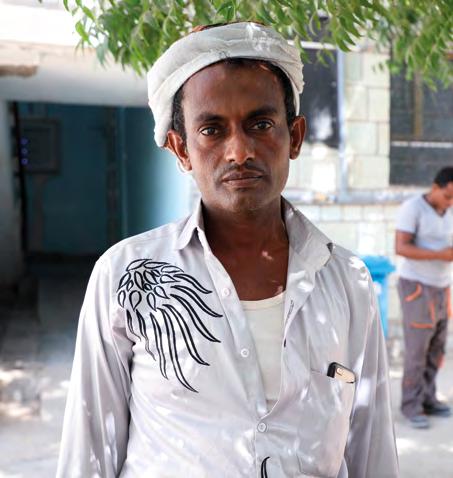
An inefficient humanitarian response Médecins Sans Frontières continued to call for a radical overhaul of the aid system in Yemen in 2021. Despite the large amounts of money spent overall on
In Hodeidah, like elsewhere in Yemen, years of brutal conflict have disrupted people’s lives, decimated the economy, and destroyed livelihoods. In 2021, many people in Hodeidah could no longer afford food to feed their families or fuel to travel to work or seek medical care. Poverty, lack of transportation and a fuel crisis proved significant barriers for people living in rural areas who needed to attend a hospital.
Abdo’s father Ismail explained his son’s situation and the difficulties his family experienced accessing adequate care.
Abdo, the one-year-old son of Ismail (pictured), was admitted to the intensive care unit of the Médecins Sans Frontièressupported Ad Dahi rural hospital in early 2021 with diarrhoea and malnutrition.
“The child was sick. He was suffering from diarrhoea and weakness in the body. We [were] in the desert in the Moor Valley where we live, [and] we struggled a lot to reach the main road to bring him to this hospital where doctors treated him.
“He was admitted to the intensive care unit and then to the inpatient ward. Now, thank God, his health has improved a little and we
the humanitarian response, much of the international aid continued to be inefficient because it lacked both the flexibility to respond effectively to emergencies and the planning to ensure the provision of healthcare over the long term.
The authorities in Yemen also needed to do much more to support and facilitate the work of humanitarian organisations. Limits on humanitarian action remained too severe and continued to prevent the timely and independent provision of humanitarian aid where it was most needed.
are waiting for him to fully improve. But we are tired of going home and back.”
Dr Duha Shamsaddin was the medical activity manager at Ad Dahi hospital. She described the condition of paediatric patients as well as the challenges young mothers face, which over the past few years has led to a steadily growing increase in the number of patients presenting with severe malnutrition at the hospital.
“Meningitis, diarrhoea, and severe acute malnutrition with complications were... the main morbidities (illnesses). Seven out of 10 paediatric patients admitted to the hospital were underweight and suffering from malnutrition with health complications.
“Many of the mothers, they were less than 18 years old, they weighed less than 40 kilograms, they were malnourished, they lacked antenatal care, and they delivered their babies at home. All of this contributed to increasing the pre-term labour and the mortality and morbidity for both mothers and children.”
In the Médecins Sans Frontières Kahdestan clinic on the outskirts of Herat city, health services for internally displaced people such as maternal health and general consultations for children, including childhood vaccinations and nutritional care; at the regional hospital in Herat city, inpatient therapeutic feeding for children, and support for the paediatric emergency room and intensive care unit launched in mid-December; COVID-19 care at our treatment centre in Herat and triage of suspected COVID-19 cases at the regional hospital.
KEY ACTIVITIES
Specialist healthcare to address some of the vast health needs of Rohingya refugees living in the Cox’s Bazar camps, and the needs of patients from the host community, including general healthcare, treatment of chronic diseases such as diabetes, hypertension and hepatitis C, emergency care for trauma patients, women’s healthcare and mental healthcare; COVID-19 prevention, screening and treatment, including supporting a government-run vaccination campaign; water and sanitation activities, including the constructive of an extensive water network powered by solar energy.
IMPACT:
Increased bed capacity in the Herat inpatient therapeutic feeding centre for children, to 74 beds by mid-October, to meet high demand for care.
PROJECT STAFF:
353
FUNDING:
TOTAL AU
$11,156,918 $1,000,000
Nyesh, eight months old, was admitted to the Médecins Sans Frontières-supported paediatric department of Herat regional hospital with severe malnutrition and pneumonia. © MSF
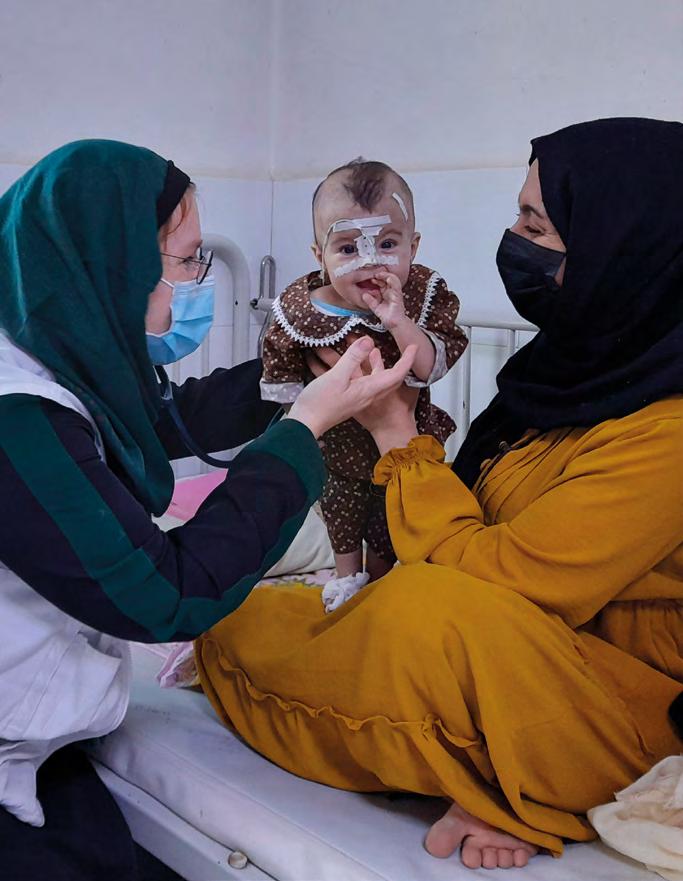
COX’S BAZAR DISTRICT
IMPACT:
Médecins Sans Frontières was the largest provider of specialist psychiatric care for people suffering from severe mental health conditions, such as psychosis and anxiety disorders.
PROJECT STAFF:
244
FUNDING:
TOTAL AU $6,573,915 $2,500,000
In March 2021, a fire destroyed thousands of shelters and facilities in the Cox’s Bazar camps. © Pau Miranda
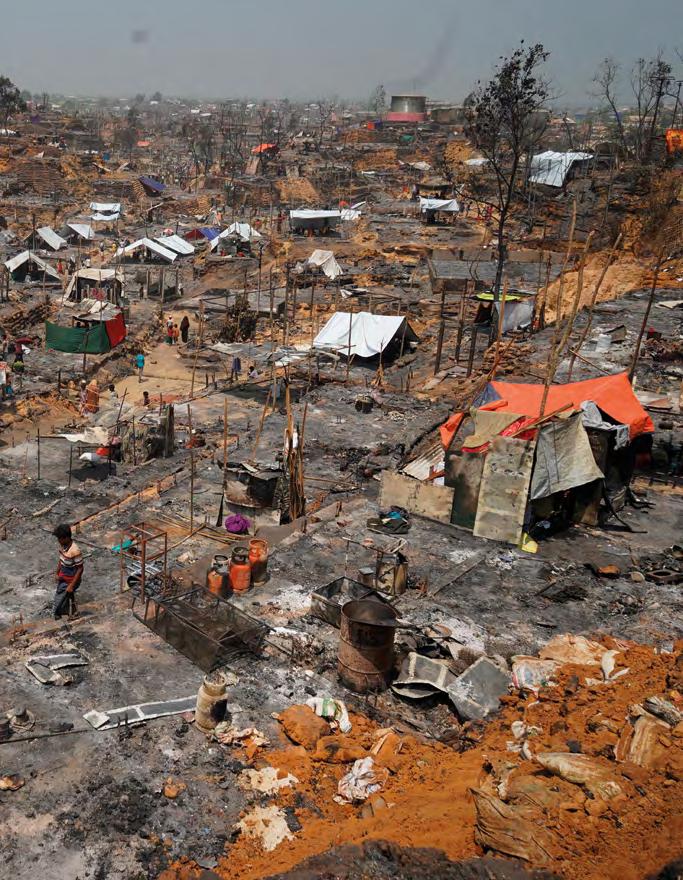 Project locations funded by Australian donors
HERAT
Project locations funded by Australian donors
Project locations funded by Australian donors
HERAT
Project locations funded by Australian donors
Aid for displaced and local communities affected by rising conflict and insecurity. In CentreNord, medical aid with a focus on epidemics and seasonal malaria peaks, meningitis, hepatitis E, measles, water-borne diseases, mental health and sexual violence, and water trucking and borehole construction to address water shortages; in Boucle du Mouhoun, activities to improve access to secondary healthcare, including surgical care and sexual violence care, via a health post and three mobile clinics; in Nord, medical services at a health centre and support for health facilities in Titao town, as well as mobile clinics providing primary healthcare for remote villages; emergency responses to outbreaks of violence and displacement.
KEY ACTIVITIES
Community-based hepatitis C care in Phnom Penh city and Battambang province in collaboration with the Ministry of Health, using a simplified model of care suitable for implementation at primary level across Cambodia and adoption into the Ministry of Health’s clinical guidelines, and highly effective drugs called direct-acting antivirals. Activities were expanded to a further eight districts in 2021 and handed over to the local health authorities, after five years of the program.
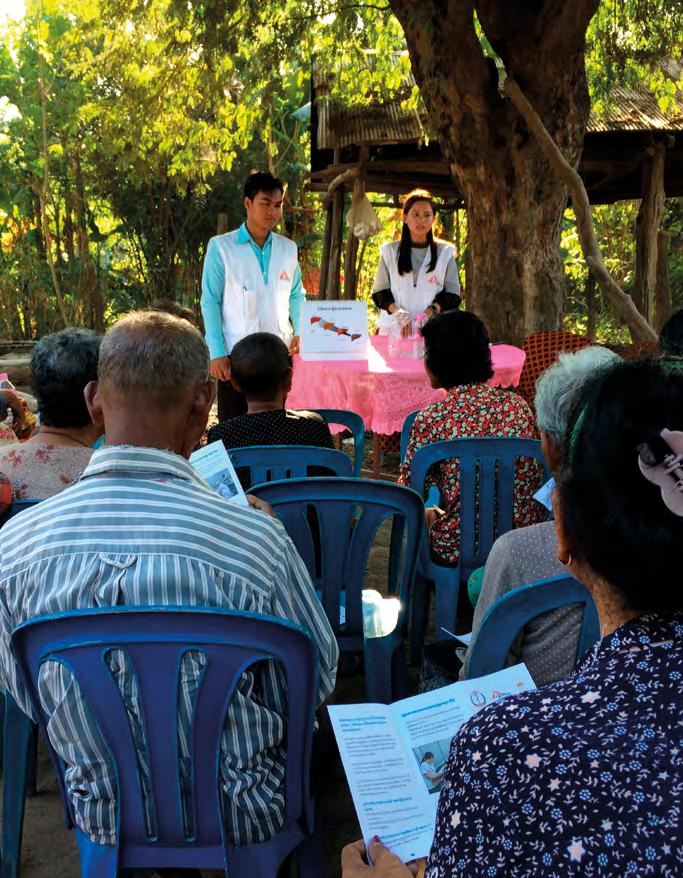
Médecins
IMPACT:
2,525 consultations
PROJECT STAFF:
394
FUNDING:
TOTAL AU
$10,988,283 $3,400,000
IMPACT:
More than 19,000 people treated for hepatitis C in five years, and cure rates of approximately 97 per cent achieved for patients in this time.
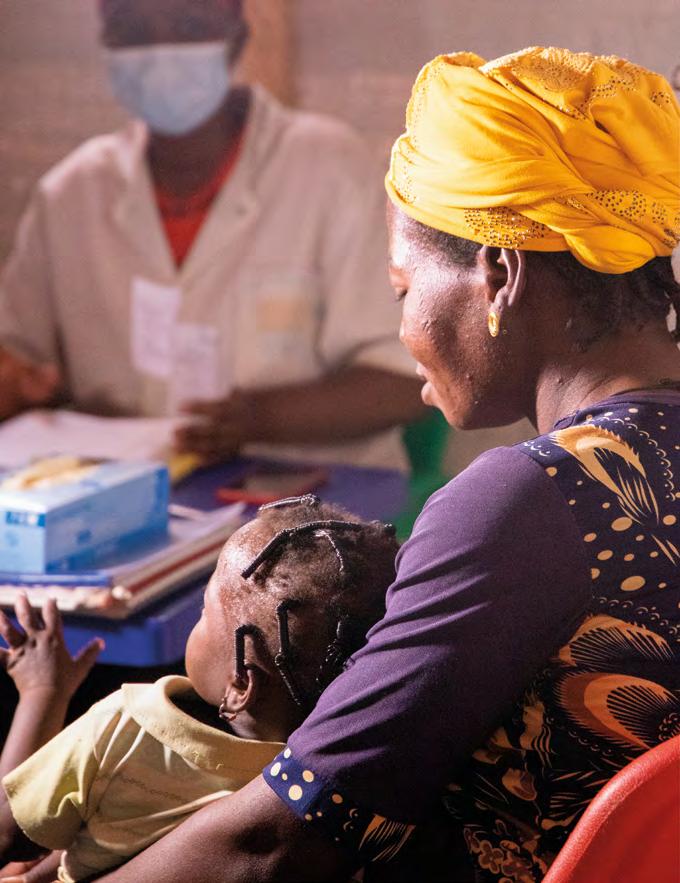
PROJECT STAFF: 37
FUNDING:
TOTAL AU $1,573,992 $1,000,000
Australia Annual Activity Impact Report 2021 – 25
A young girl with malaria and her mother attend a consultation at the Médecins Sans Frontières clinic in Kaya city, Centre-Nord. © Mario Fawaz/MSF Médecins Sans Frontières staff explain the transmission of hepatitis C to locals in a village in Battambang province (2019). © Simon Ming/MSF provided by community health workers in Boucle du Mouhoun.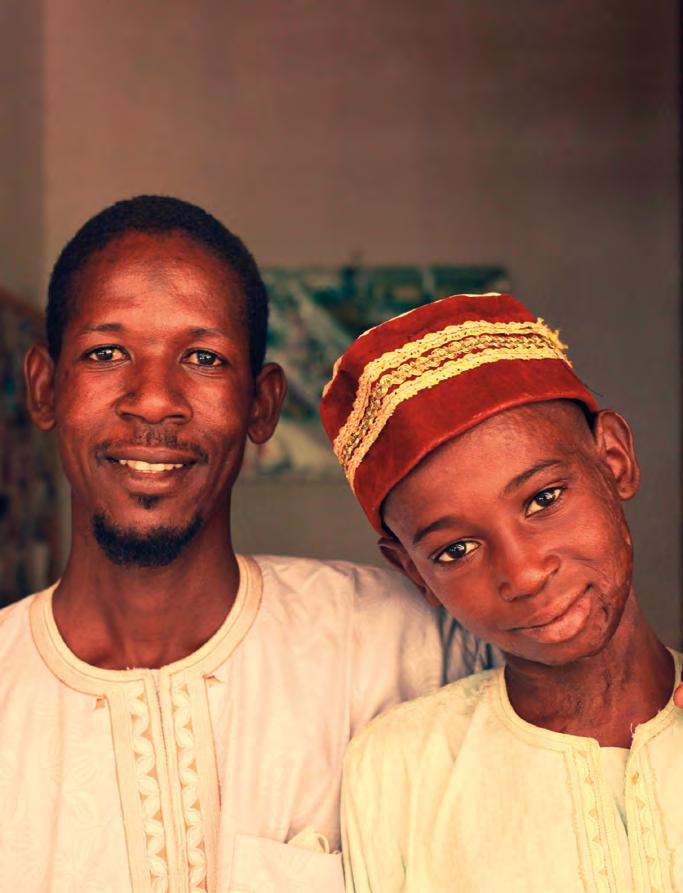
In Maroua, Far North, support for the regional hospital, the region’s main specialist health centre, with complex surgical care and mental healthcare for people injured in conflict and other emergencies, until the project was closed in February; in Kolofata and Mora, general healthcare including consultations for paediatric malnutrition and diseases such as malaria and diarrhoea, and decentralised care via community health workers, who were trained to treat simple cases of common diseases.
KEY ACTIVITIES
Emergency, surgical and post-operative care at the Médecins Sans Frontières trauma surgery hospital in Bangui, including physiotherapy and mental health support; care for people living with HIV, including supporting community-based patient groups who provide peer support and assist each other with adherence to treatment and collection of medications; care for tuberculosis and non-communicable diseases; training for volunteer health workers to diagnose and treat diseases such as malaria and diarrhoea at the community level; maternal healthcare and paediatric care including nutrition; integrated treatment, including mental health support, for survivors of sexual violence in the majority of our projects; emergency response to violence in Bouar.
IMPACT:
Handover of activities at Maroua regional hospital to the Ministry of Health, following the refurbishment of an intensive care unit and training staff. More than 14,000 surgeries and 8,000 mental health consultations were provided between 2016 and 2021.
PROJECT STAFF: 102.1
FUNDING:
TOTAL AU $5,303,854 $1,450,000
Nine-year-old Bouba was badly burnt while harvesting cotton with his father, and recovered after 16 months of care at Maroua regional hospital (2020). © Scott Hamilton/MSF
IMPACT:
In Bria and Carnot, development of the HIV program to include monitoring of chronic transmissible and noncommunicable diseases, with a view to providing better ongoing care for patients after hospitalisation.
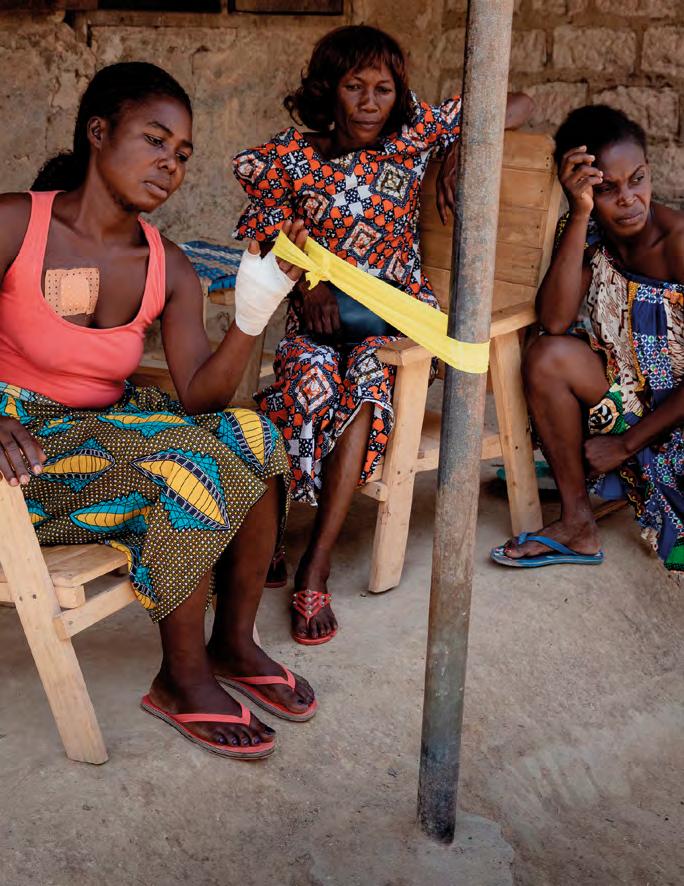
PROJECT STAFF:
985
FUNDING:
TOTAL AU $28,506,744 $1,000,000
France practices physiotherapy exercises at her home after an operation at the SICA hospital in Bangui. © Adrienne Surprenant/Collectif Item for MSF Project locations funded by Australian donorsIn Ouaddaï region, measles outbreak response followed by opening of a longer-term paediatric project based in Adré, to address a lack of healthcare in the region and assist refugees fleeing conflict in West Darfur, Sudan; maternal and paediatric healthcare in collaboration with the Ministry of Health in Moissala, Mandoul region, as well as a seasonal malaria chemoprevention campaign; in N’Djamena, nutrition services and therapeutic feeding for children and families at community level, in four outpatient feeding centres, and in an inpatient centre for complicated cases; emergency response to assist people seeking shelter in Chad from intercommunal violence in northern Cameroon, including medical consultations, hospital referrals and distribution of water.
IMPACT: Emergency response for malnourished children during the ‘lean season’ in N’Djamena developed into a program to better meet needs of families and children throughout the year.
PROJECT STAFF: 293
FUNDING: TOTAL AU $14,006,655 $500,000 NZ $1,110,277
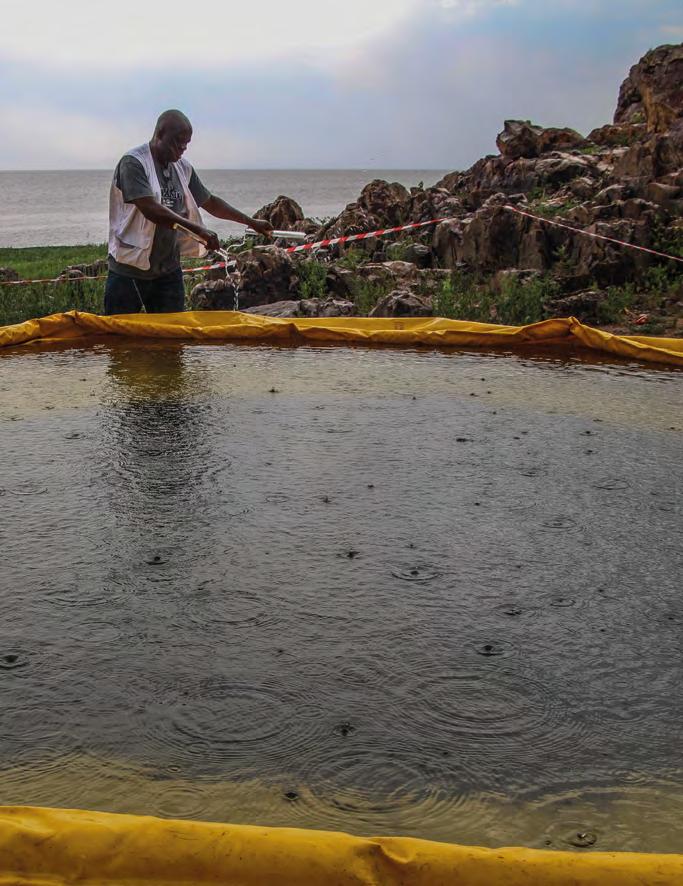
Emergency responses to measles outbreaks, comprising vaccination campaigns, treatment and support to authorities to strengthen preventative vaccination, diagnosis and epidemiological surveillance; responses to outbreaks of cholera, malaria and Ebola, supporting surveillance, triage, diagnosis and care; COVID-19 testing, patient care and infection prevention and control support; in Goma, care for patients living with advanced HIV; in North Kivu, maternal and paediatric healthcare, surgery and treatment for malnutrition; comprehensive treatment for survivors of sexual violence in conflict-affected provinces; general and specialist health services for displaced people in Nizi, including care for common diseases, sexual and reproductive healthcare and water and sanitation activities; emergency response to Nyiragongo volcano eruption.
IMPACT:
Vaccination coverage survey and seroprevalence study carried out to assess the effectiveness of vaccination campaigns against measles, which is endemic in the country.
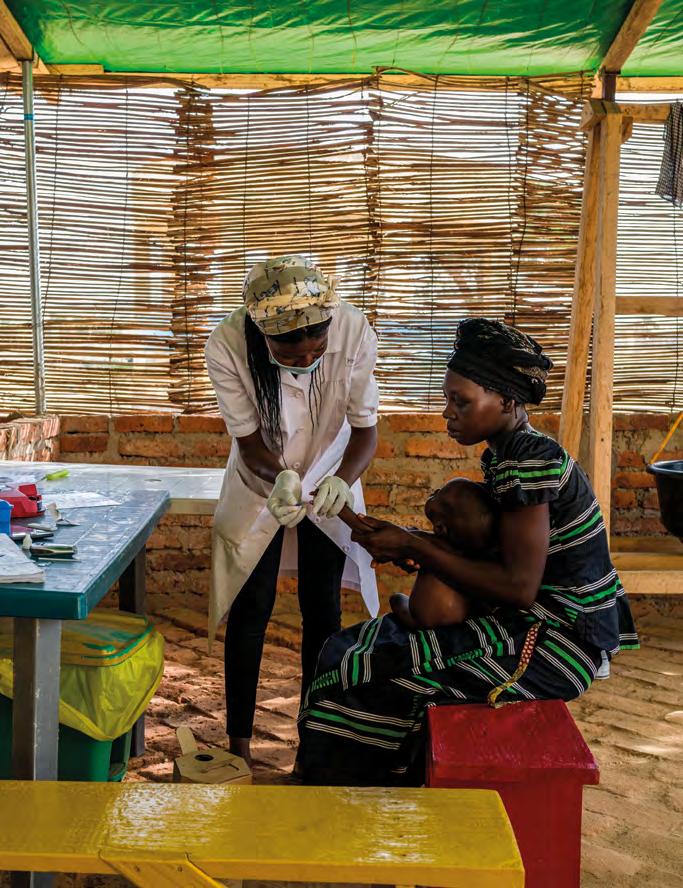
PROJECT STAFF: 552.4
FUNDING: TOTAL AU
$28,362,593 $1,800,000
A nurse takes a child’s vital signs and assesses him for malaria in N’Djamena. © Lys Arango Project locations funded by Australian and New Zealand donors ADRÉ MOISSALA N’DJAMENA A cholera response in Mulongo in Haut-Lomami included water chlorination activities to provide clean water for households in the region. © Yves Ndjadi/MSF Project locations funded by Australian donors HAUT-LOMAMI ITURI TANGANYIKA HAUT-KATANGA LUALABA NORTH KIVUActivities to tackle the dual epidemic of HIV and tuberculosis, including a new short-course treatment study to improve care for drug-resistant tuberculosis in Shiselweni and Lubombo regions, and communitybased care for HIV with provision of drug refills, testing and chronic care at community delivery points; support to Nhlangano health centre during COVID-19 waves; the launch of the Oxygen Plant Project in mid-2021 with the aim to improve care for COVID-19 and other oxygen-dependent medical conditions; integration of COVID-19 vaccination campaigns into daily medical activities, with a focus on rural communities in Shiselweni, and support for Ministry of Health-run vaccination campaigns; integrated care for non-communicable diseases such as hypertension.
Medical and humanitarian aid to address urgent health needs in Amhara and Tigray regions for people affected by the conflict and violence, until activities were suspended in July; in Tigray, mobile clinics activities, support for basic and specialist healthcare facilities, establishment of alternative referral systems to restore access to specialist services, support for hospitals in collaboration with the Regional Health Bureau and activities at displacement sites, including distribution of emergency and essential medical supplies and water and sanitation support; in Amhara, basic healthcare for displaced people and water and sanitation activities in communities.
IMPACT:
A new short-course treatment study for drug-resistant TB enabled patients to finish their course in just nine to 12 months rather than two years, with less severe side effects.
PROJECT STAFF: 123.4
FUNDING:
TOTAL AU $6,065,650 $500,000
A counsellor in a fixed clinic in Shiselweni district, from which Médecins Sans Frontières provides HIV and tuberculosis prevention and treatment. © MSF
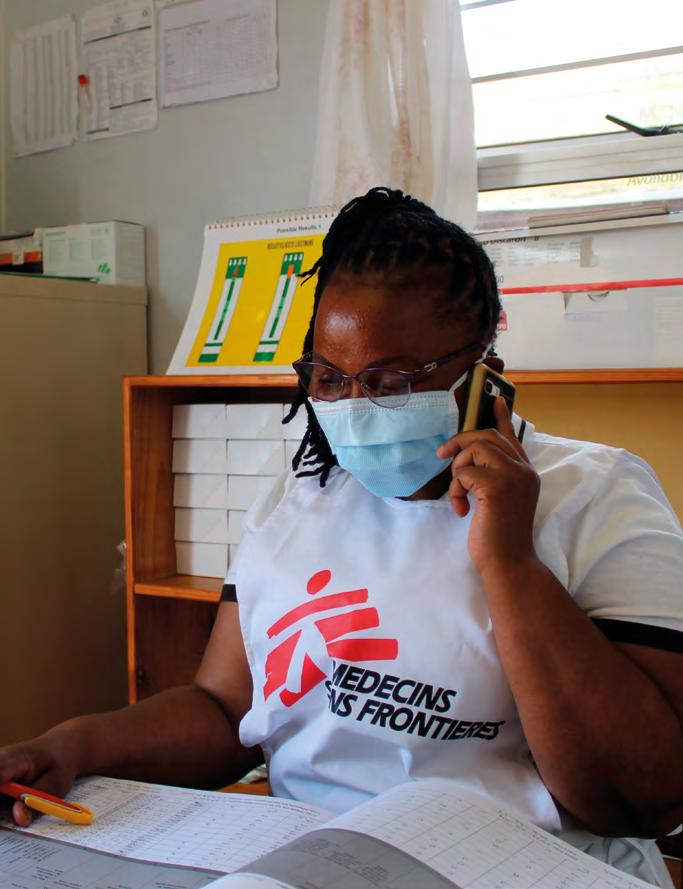
IMPACT:
Rehabilitation of basic and specialist healthcare facilities damaged by attacks and looting (of 106 facilities assessed between mid-December 2020 and March 2021, 87 per cent were no longer functioning).
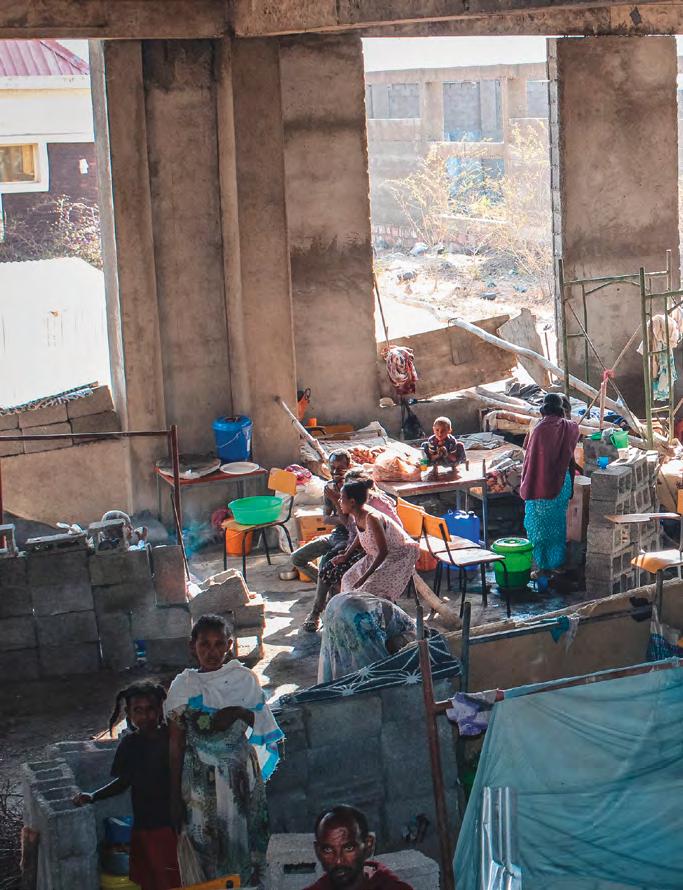
PROJECT STAFF: 496
FUNDING: TOTAL AU $24,535,850 $7,500
People who have been internally displaced by the conflict in Tigray shelter at a site in an unfinished university building in Shire. © Claudia Blume/MSF Project locations funded by Australian donors Project locations funded by Australian donors SHISELWENI TIGRAY AMHARAAt our trauma hospital in Tabarre neighbourhood in Port-au-Prince, surgery and follow-up care for patients with life-threatening injuries from gunshots, stabbings and traffic accidents; burns care at Droullaird hospital in Cité Soleil, until all activities (except those of the emergency department) were transferred to our Tabarre hospital due to clashes between armed groups; following the 14 August earthquake, orthopaedic surgery and follow-up care for survivors at Hôpital Saint Antoine in Jérémie, surgical and post-operative care for trauma patients at Hôpital Immaculée Conception, patient referrals and deployment of staff to support medical facilities in the affected areas; mass casualty response to a fuel truck explosion in Cap-Haïtien.
A physiotherapist works with a child whose arm was crushed during the August earthquake, at Tabarre hospital, Port-auPrince.
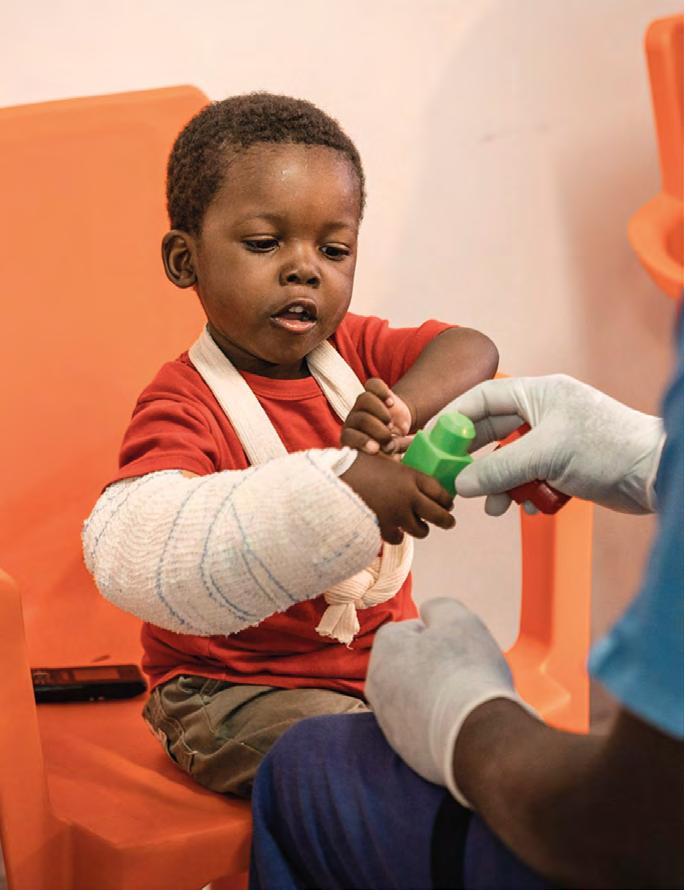
Hurricane assistance in Choloma, in the northern department of Cortés, for people still suffering the consequences of the two hurricanes (Eta and Iota) that struck at the end of 2020; family planning services, ante- and postnatal consultations and basic obstetric care at a mother-and-child clinic; medical and psychological care for sex workers and the LGBTQI community through a new clinic in San Pedro Sula.
IMPACT:
Our Tabarre hospital team in Portau-Prince responded to several large influxes of patients wounded during high levels of violence, and mobilised an emergency and then longer-term response to the August earthquake in the south.
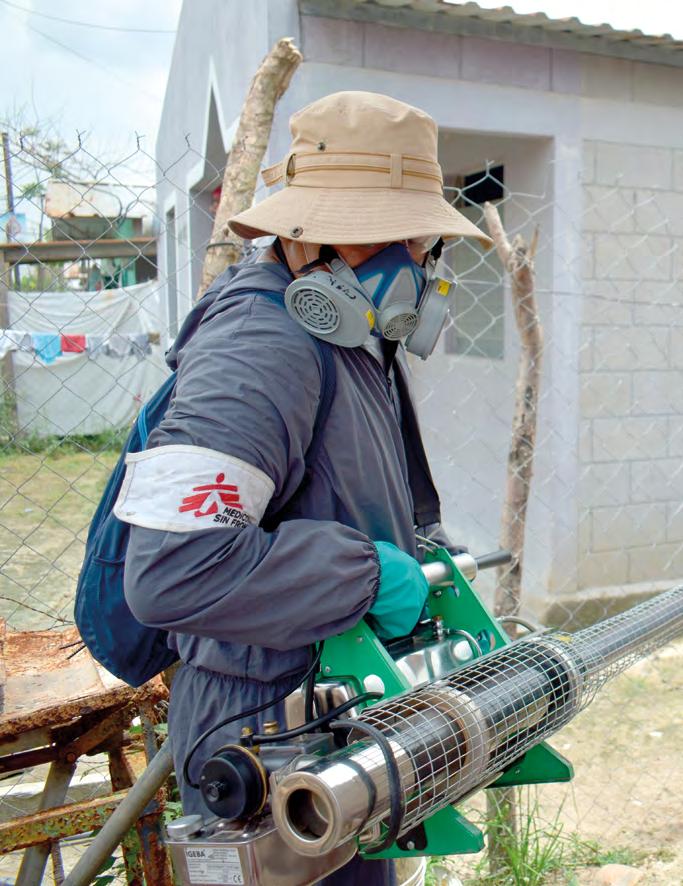
PROJECT STAFF: 676
FUNDING: TOTAL AU $22,174,862 $2,000,000
IMPACT:
6,593 antenatal consultations and 3,462 family planning consultations provided during the year.
PROJECT STAFF: 109.1
FUNDING: TOTAL AU $4,587,403 $1,500,000
© Pierre Fromentin/MSF A Médecins Sans Frontières staff member fumigates the interior and exterior of houses in an area of Cortes department affected by flooding following hurricanes Eta and Iota. © Cecilia Duran/MSF Project locations funded by Australian donors Project locations funded by Australian donors JÉRÉMIE LES CAYES PORT-AU-PRINCE CAP-HAÏTIEN CHOLOMAIn Tehran and Mashhad cities, clinical and psychological support for communities at particular risk of infectious diseases such as hepatitis, HIV, tuberculosis and sexually transmitted infections (STIs), namely drug users, sex workers, children living on the street and transgender people, in collaboration with local organisations. Comprehensive medical services in Tehran including peer support counselling, psychosocial support, medical and mental health consultations, anteand postnatal care, family planning, communicable disease testing and treatment for STIs; in Mashhad, general healthcare consultations, hepatitis C screening, treatment and follow-up, counselling, social support, health education and referrals to specialist health facilities.
KEY ACTIVITIES
Post-operative care in Baghdad for patients with injuries sustained during war, violence or accidents; COVID-19 care at the Médecins Sans Frontières-run COVID-19 Intensive care unit at Al-Kindi hospital in Baghdad, including physiotherapy and mental health support in collaboration with the hospital’s management and medical teams; care for severe and critical COVID-19 patients in the Intensive care unit of Baghdad Medical City, as well as training and on-the-job coaching for healthcare workers; at Sinuni general hospital in Sinjar, maternity care, surgical care, mental health support and treatment for patients with mild and moderate forms of COVID-19.
IMPACT:
Mental health support project for Afghan refugees east of Mashhad explored in March-April and launched in October.
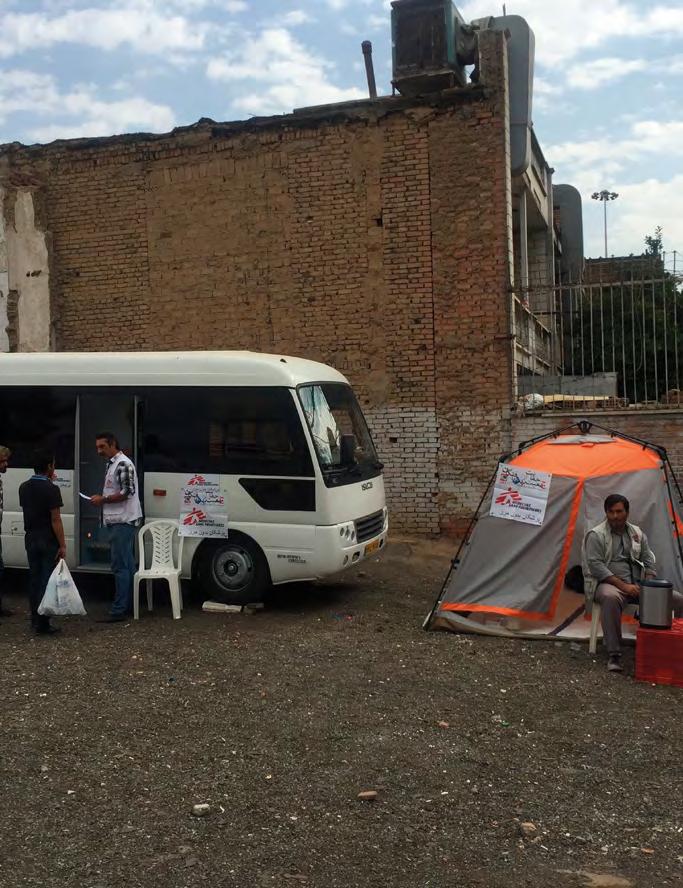
PROJECT STAFF: 106
FUNDING:
TOTAL AU $3,346,295 $1,700,000
IMPACT:
Expansion of our dedicated COVID-19 intensive care unit at AlKindi hospital, Baghdad, to 52 beds (from 24 in 2020) to accommodate large numbers of critically ill patients, as people increasingly sought care late.
PROJECT STAFF:
214.6
FUNDING:
TOTAL AU
$12,502,515 $2,000,000
Nurses check on patients in the Médecins Sans Frontièresrun Intensive care unitof the COVID-19 ward at Al-Kindi hospital, Baghdad. © Hassan Kamal Al-Deen/MSF
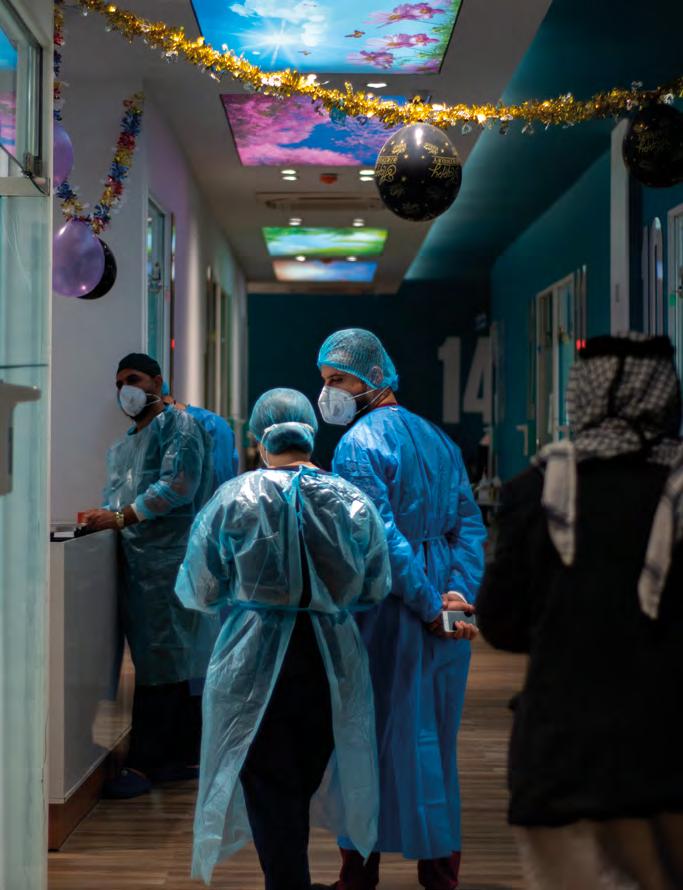 Mobile clinic activities in Tehran (2019). © MSF
Project locations funded by Australian donors
Project locations funded by Australian donors
TEHRAN MASHHAD
NINEWA
BAGHDAD
Mobile clinic activities in Tehran (2019). © MSF
Project locations funded by Australian donors
Project locations funded by Australian donors
TEHRAN MASHHAD
NINEWA
BAGHDAD
Reconstructive surgery at our hospital in Amman for war-wounded patients from Iraq, Yemen, Syria and Palestine, including orthopaedic, plastic and maxillofacial surgery, as well as a package of holistic care services such as physiotherapy, pain management, mental healthcare, social support and a school for child patients; COVID-19 care for moderately unwell patients requiring oxygen therapy in a section of the Amman hospital, which we transformed into COVID-19 wards in March and April.
KEY ACTIVITIES
In Eastlands, Nairobi, emergency medical care including pre-hospital care and trauma stabilisation, a 24/7 call centre and ambulance service, and comprehensive sexual violence care in Lavender House referral centre plus four Ministry of Health clinics; also in Eastlands, activities in our new youth-friendly centre to address the consequences of urban violence, including general medical care, sexual and reproductive healthcare and recreational and educational activities; in Homa Bay county, HIV care, treatment for chronic diseases at two basic healthcare facilities and COVID-19 care at the referral hospital’s isolation centre.
IMPACT:
A total of 495 patients admitted to the Amman program, as activities were steadily resumed despite the disruption of COVID-19 lockdowns and travel restrictions in 2020.
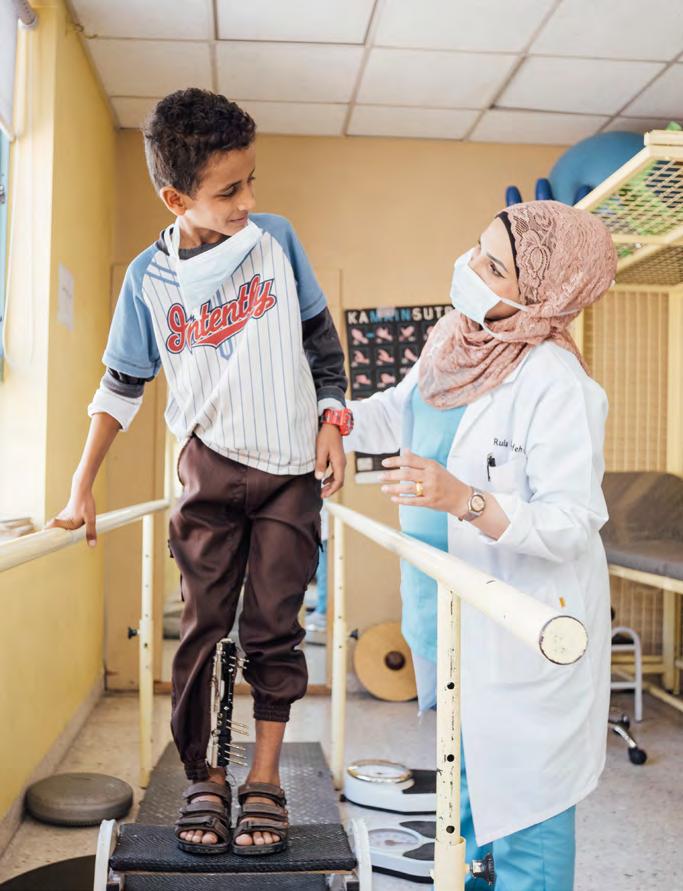
PROJECT STAFF:
232
FUNDING:
TOTAL AU $17,004,735 $2,200,000
IMPACT:
Youth-friendly centre project in Nairobi designed through participatory approach with youth, community members and stakeholders; the project provided 3,646 consultations in the year.
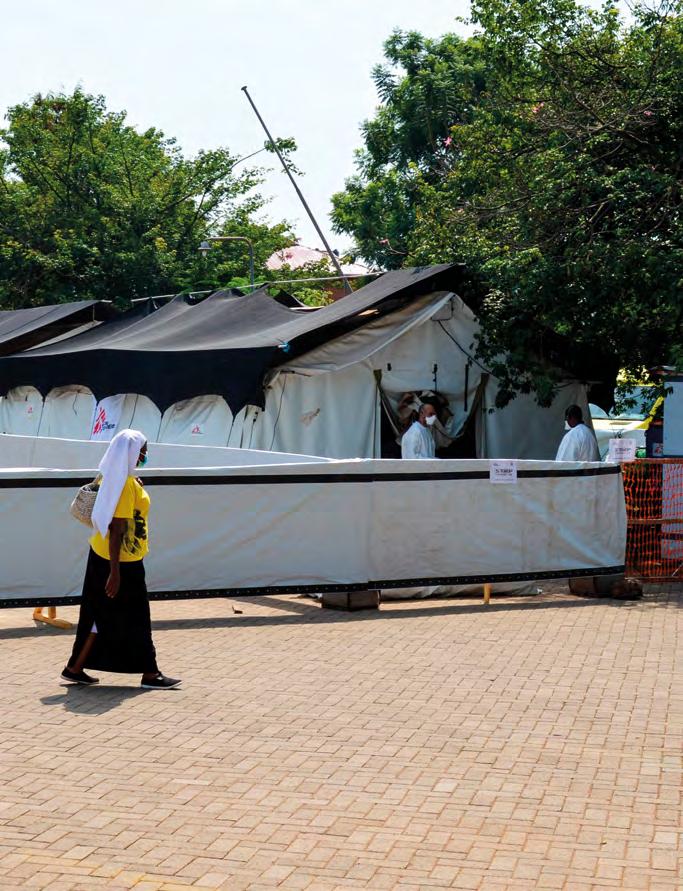
PROJECT STAFF:
232
FUNDING:
TOTAL AU $10,647,869 $1,200,000
Ahmed, 11, learns how to walk again at the Amman hospital after being injured in an explosion in Yemen. © Peter Bräunig The Médecins Sans Frontières-run COVID-19 isolation centre in the Homa Bay referral hospital, during June. Project locations funded by Australian donors Project locations funded by Australian donors AMMAN NAIROBI HOMA BAY Médecins Sans Frontières Australia Annual Activity Impact Report 2021 – 31In Zahle, Bekaa, comprehensive paediatric care for vulnerable communities through an intensive care unit and inpatient department at Elias Haraoui Governmental Hospital, as well as a program offering comprehensive care and blood transfusions for children with thalassemia (a hereditary blood disorder), and outreach activities to raise awareness of Médecins Sans Frontières’ services; in Beirut, homebased medical consultations, nursing care and medication provision for people in areas recovering from the 2020 port explosion, with a focus on elderly and disabled people with no or minimal financial and social support and/or limited mobility; COVID-19 activities including vaccinating people most at risk in collaboration with the Ministry of Public Health.
Healthcare workers wait to be vaccinated against COVID-19 by Médecins Sans Frontières mobile clinic staff at a nursing home in Tripoli. © Mohamad Cheblak/MSF
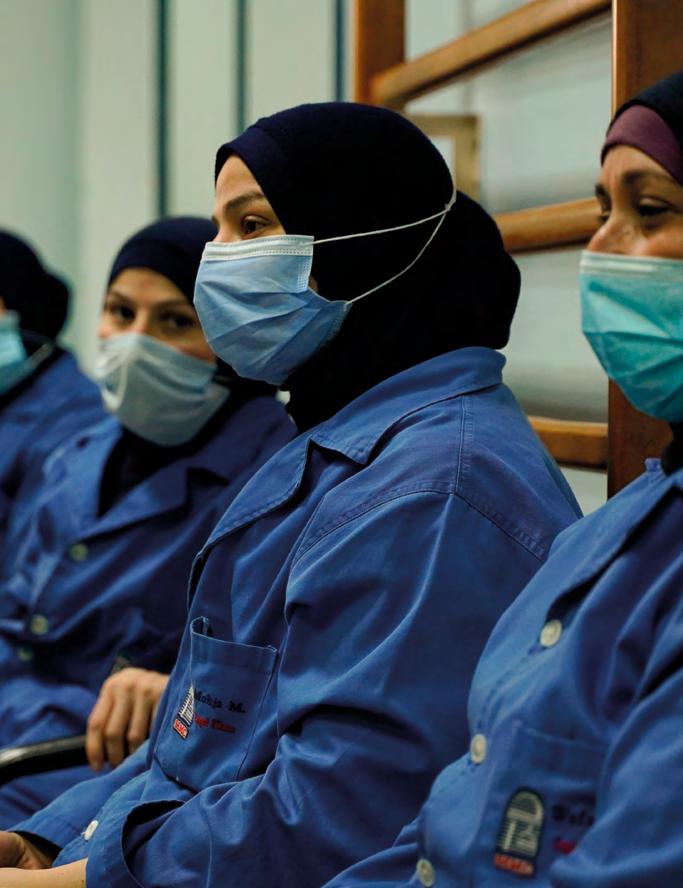
Specialised paediatric care in Bardnesville Junction Hospital in Monrovia, including paediatric urological, reconstructive plastic and emergency surgery, and treatment of malnutrition, malaria and lower respiratory tract infections; in Montserrado county, communitybased care for people with mental health conditions and epilepsy through supporting health facilities with diagnosis, treatment and supply of essential medicines, including supervision for health workers, hospital referrals and coordination of psychosocial workers and health volunteers to work with patients’ families and communities to address stigma; Ebola preparedness activities in Nimba and Lofa counties.
A patient treated for cerebral malaria at Bardnesville Junction Hospital, with his mother and some of the staff who cared for him (2020). © Tim Pont/MSF
IMPACT:
Support for local health authorities to ensure rapid access to COVID-19 vaccination from March for elderly people, detainees, migrants and refugees and healthcare workers, via Tripoli vaccination centre and mobile clinics.
PROJECT STAFF: 104
FUNDING: TOTAL AU
$8,920,850 $2,500,000
MONROVIA MONTSERRADO COUNTY
IMPACT:
Paediatric surgery program and hands-on paediatric training programs for Liberian health workers resumed in Monrovia following disruption due to COVID-19 in 2020.

PROJECT STAFF: 365
FUNDING: TOTAL AU
$10,946,115 $800,000
Project locations funded by Australian donors NIMBA COUNTY LOFA COUNTY Project locations funded by Australian donors TRIPOLI BEIRUT ZAHLEMedical and mental healthcare for migrants, refugees and asylum seekers in detention centres, including identification of vulnerable people and referral of patients requiring specialist care to hospitals in Tripoli; general healthcare and referrals for survivors of torture and trafficking in Bani Walid; community-based mobile clinics offering basic healthcare and referrals for migrants; first aid and basic medical care, as well as emergency referrals and follow-up care for patients in a critical condition, at disembarkation points for people intercepted at sea and brought back to Libya by the Libyan coastguard; in Misrata, a tuberculosis program and assistance for the national tuberculosis program through a tuberculosis unit, technical support, diagnosis, treatment and counselling.
An urban-setting mobile clinic offering basic healthcare and referrals for migrants, refugees and asylum seekers.
In Bamako, provision and facilitation of access to screening, diagnosis and treatment for breast and cervical cancers, including working with the Ministry of Health to run a breast cancer awareness campaign to encourage screening during Pink October; preventive and curative nutrition and paediatric services at community and hospital level in Koutiala district; in Ténenkou district, women’s healthcare and neonatal and paediatric care at a referral health centre; COVID-19 activities at two hospitals in Bamako, including inpatient care, contacttracing, home-based follow-up and health promotion.
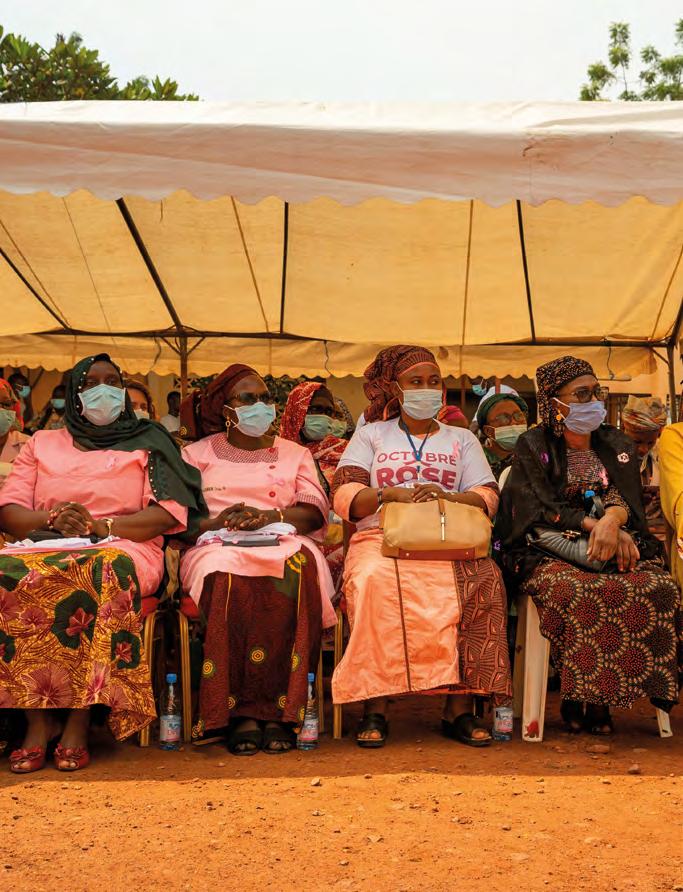
IMPACT:
Following the closure of most detention centres on the west coast, activities shifted to community-based outreach care to support migrants living in urban settings and exposed to extreme violence and human trafficking.
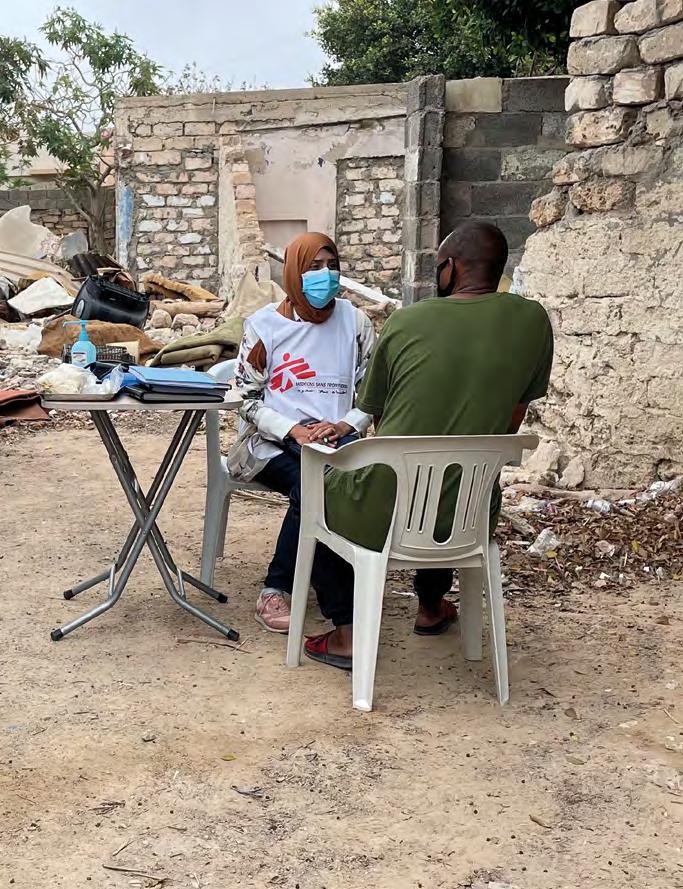
PROJECT STAFF: 114
FUNDING: TOTAL AU $7,944,912 $1,300,000
IMPACT: 81,612 women screened for cervical and breast cancers, and 645 new patients enrolled in the program to access care.
PROJECT STAFF: 603
FUNDING: TOTAL AU $18,866,043 $3,000,000
Health workers, partners, associations and authorities at the opening ceremony of the Pink October campaign in Bamako. © Mohamed Dayfour/MSF © Maya Abu Ata/MSF Project locations funded by Australian donors Project locations funded by Australian donors TÉNENKOU KOUTIALA BAMAKO Tripoli Zuwara ZUWARA MISRATAIn Maputo, Mozambique’s capital, handover to local health authorities and partner organisations of our drop-in centre and related activities for people who use drugs as first established in 2017, including testing and referrals for HIV, tuberculosis and hepatitis C, needle/syringe distribution, opioid substitution therapy and overdose treatment; these activities will continue to provide treatment and protection from harm for service users, and help prevent the spread of HIV, hepatitis C and other bloodborne diseases.
A recovering drug user takes her dose of methadone during her consultation at Médecins Sans Frontières’ methadone treatment centre in Maputo, part of a larger harm-reduction project for people who use drugs in the Mozambique capital.
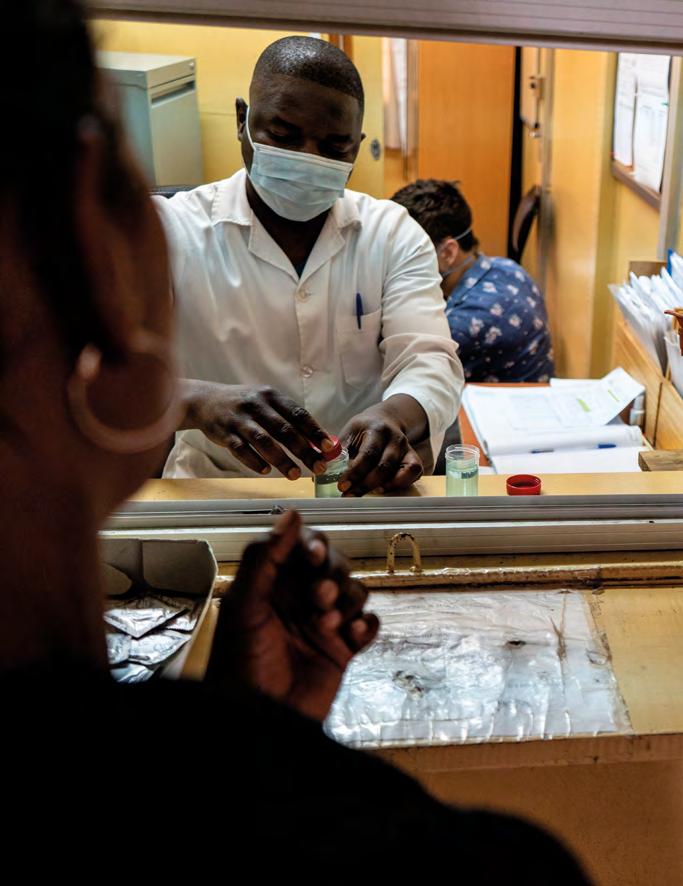 © Tadeu Andre/MSF
© Tadeu Andre/MSF
In Myanmar’s biggest city, Yangon, and Kachin state’s Myitkyina and Hpakant townships, care for patients with moderate to severe symptoms in three independent COVID-19 treatment centres; in Muse and Lashio, Shan state, and Dawei, Tanintharyi region, establishment of a COVID-19 information hotline for the general community and provision of supplies to public institutions including a prison, and infection prevention and control training for frontline healthcare workers.
Colleagues help each other don personal protective equipment before entering the Médecins Sans Frontières COVID-19 ward at Yangon’s Aung San Tuberculosis Hospital to treat patients affected by Myanmar’s third wave of the pandemic. © Ben
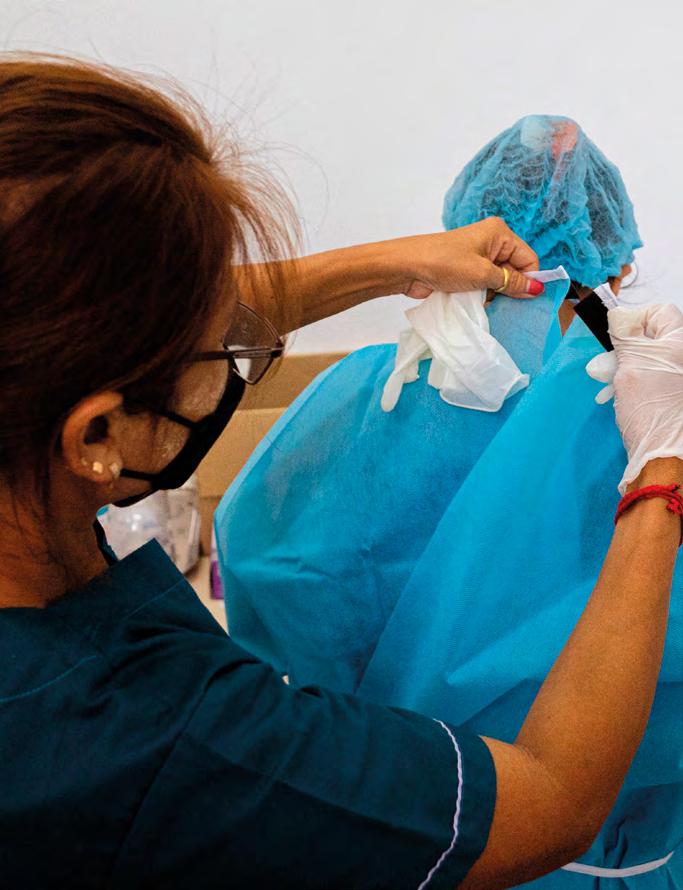 Small/MSF
Small/MSF
IMPACT:
Handover of five-year-long, partnered project establishing comprehensive harm reduction activities for people using drugs in Maputo.
PROJECT STAFF:
49
FUNDING:
TOTAL AU $1,706,484 $200,000
IMPACT:
Stepped up activities to respond to the COVID-19 pandemic amid a deepening political crisis and an overwhelmed public health system.
PROJECT STAFF: 69.6
FUNDING:
TOTAL AU
1,890,887 $300,000
Project locations funded by Australian donorsIn Jigawa state, comprehensive emergency obstetric and neonatal care and fistula surgery in Jahun general hospital with support for basic emergency obstetric and neonatal care in four local government areas; in Borno state, lifesaving care in Gwange paediatric hospital, extended with a therapeutic feeding centre for malnourished children during the malaria peak, and preventive and curative care for internally displaced people and their host communities in Ngala and Rann; emergency response to a cholera outbreak in Jahun and a measles outbreak in Gwange.
KEY ACTIVITIES
In Khyber Pakhtunkhwa province, maternal and newborn care services maintained and improved in Peshawar Women’s Hospital through a re-organisation of maternity activities and reinforcement of infection prevention and control in response to a COVID-19 outbreak, assisting an average of 600 deliveries monthly; a cutaneous leishmaniasis program with clinics in Peshawar and Bannu districts; in Gujranwala, Punjab province, a new project to diagnose and treat people with multidrug-resistant tuberculosis, embedding a decentralised approach to enable patients to receive care nearer their homes, with the first patients seen in December 2021.
IMPACT: Emergency response in Katsina state to address alarming levels of acute malnutrition among children via four supported outpatient therapeutic feeding centres and a new inpatient centre.
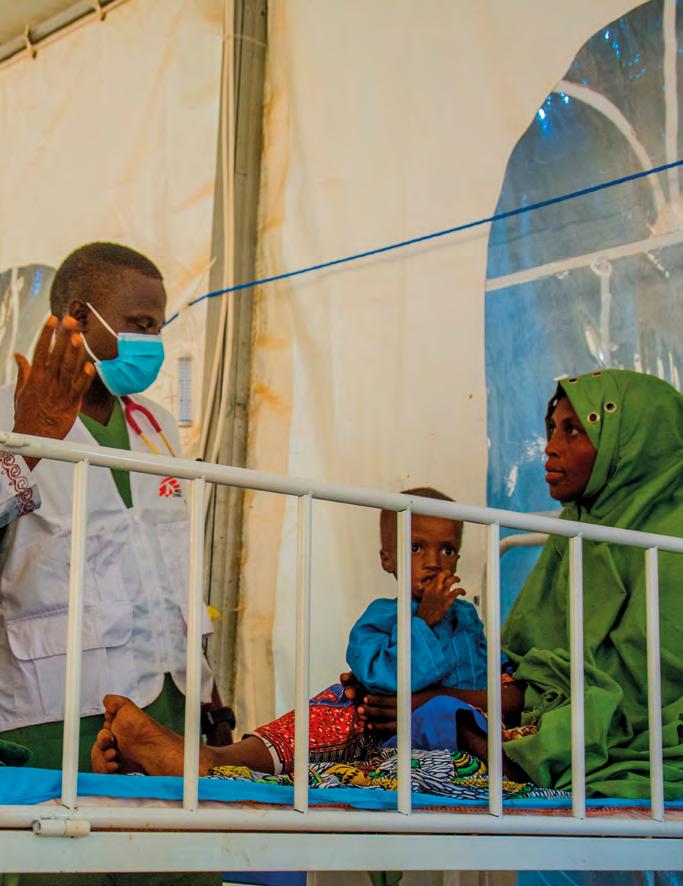
PROJECT STAFF: 766.1
FUNDING: TOTAL AU $27,599,801 $1,700,000 NZ $565,118
IMPACT: Birthing services at Peshawar Women’s Hospital, including for rural women, Afghan refugees, settled nomads and women originally from tribal areas, who would otherwise deliver at home in the absence of a more affordable alternative.
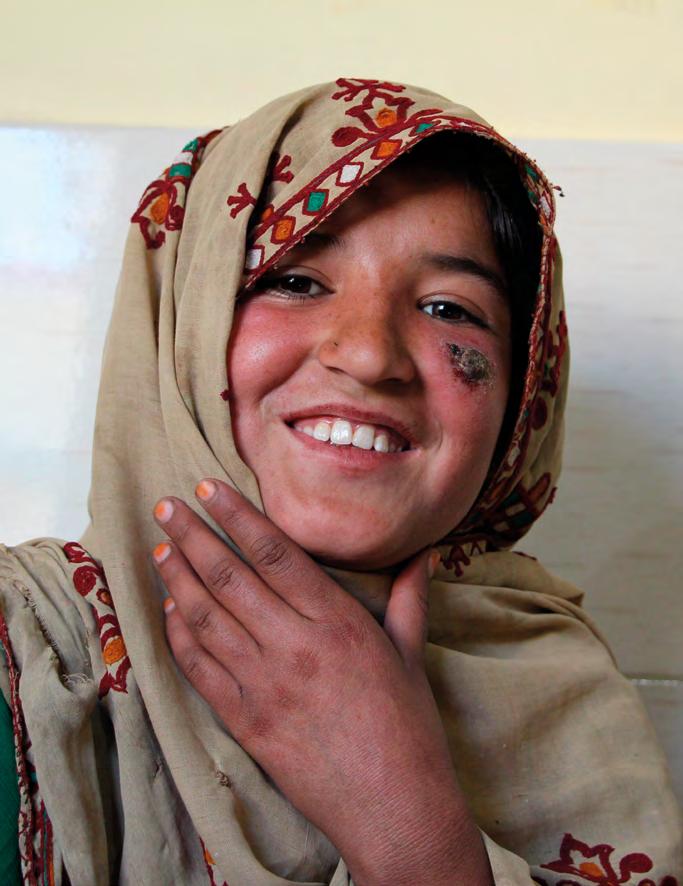
PROJECT STAFF: 325
FUNDING: TOTAL AU $7,170,408 $100,000
Médecins Sans Frontières medical staff attend to Aliyu and her mother Fatima Kasimu in Kofar Sauri inpatient therapeutic feeding centre, Katsina, Nigeria. © Harrison Fortune Ayesha Bibi, a patient being treated for cutaneous leishmaniasis by Médecins Sans Frontières. © Zahra Shoukat/MSF Project locations funded by Australian and New Zealand donors Project locations funded by Australian donors JIGAWA BORNO RIVERS KATSINAEmergency response in May to outbreaks of violence in Jerusalem and a military campaign in Gaza, supporting the Palestinian Red Crescent Society to assess and stabilise hundreds of injured people and donating essential medical supplies to Al-Makkased trauma facility, and assisting with additional staff, medical supplies and improved triage in the emergency rooms of several Gazan hospitals; ongoing surgical and post-operative care and psychosocial support to trauma patients and victims of burns in Gaza; mental healthcare in West Bank sites, and a new mobile clinic for women and children under full Israeli occupation providing general outpatient consultations, screening for malnutrition, mental health support and sexual and reproductive health services.
KEY ACTIVITIES
In the capital, a new tuberculosis project in coordination with the City of Manila to introduce active case-finding complemented with contact tracing, preventive treatment and new materials for patient education and counselling; in conflict-affected Marawi in the south, expanded support to rural health units to continue assisting large communities, including people internally displaced, with general and mental healthcare and treatment for chronic diseases, alongside surveillance in case of epidemics or further displacements; COVID-19 monitoring in project areas throughout the year and provision of technical support, training and donations in Marawi; emergency mobilisation in the wake of Typhoon Rai (Odette) to assess unmet medical and humanitarian needs.
IMPACT:
Scaled-up surgery in Al-Awda hospital during the Israeli military campaign in Gaza 10-21 May, carrying out more than 100 operations.
PROJECT STAFF: 279
FUNDING:
TOTAL AU $17,126,532 $1,500,000
For most Palestinians in Gaza, the military campaign in May wasn’t the first time they experienced airstrikes, but it made it even harder for people to cope. © Fady Hanona
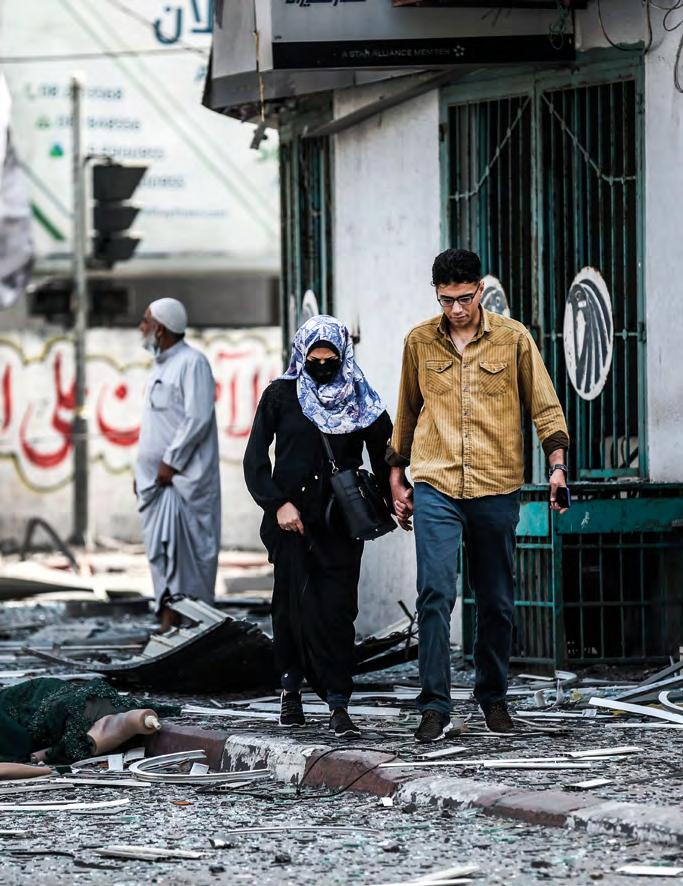
IMPACT:
Introduction of tuberculosis active case-finding to improve low case detection and limited diagnosis in metro Manila’s Tondo slum.
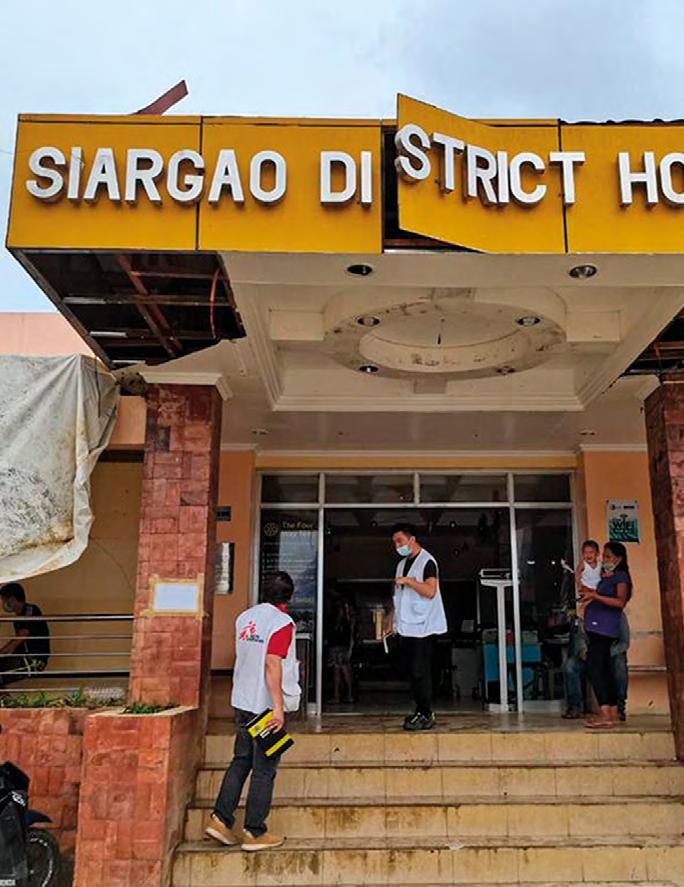
PROJECT STAFF: 70
FUNDING: TOTAL AU $3,291,642 $800,000
In December 2021 Médecins Sans Frontières mobilised teams to assess the impact of Typhoon Rai (Odette) in the southern Philippines, starting in Marawi and Lanao del Sur where we were already managing medical projects. © MSF
Project locations funded by Australian donors Project locations funded by Australian donors GAZA STRIP QALQILYA JERUSALEM NABLUS TUBAS WEST BANK MARAWIIn Somaliland, tuberculosis care with a focus on drug-resistant forms of the disease, supporting the Ministry of Health and National Tuberculosis Program in the general hospitals of Hargeisa and Berbera cities; awareness raising campaigns for people in remote areas, urban centres and sites for internally displaced people to encourage testing and treatment for drugresistant tuberculosis; COVID-19 preparedness and prevention activities in support of the Ministry of Health at several treatment centres, including medical supply support, water and sanitation and technical support for health workers.
At Aweil State Hospital, maternal healthcare, paediatric care including treatment for COVID-19 and noncommunicable diseases such as diabetes, a new seasonal malaria chemoprevention program and management of severe cases of malaria in our outpatient department; secondary healthcare at Old Fangak hospital with 24/7 provision of emergency care, maternal healthcare and inpatient care for adults and children, and treatment for severe acute malnutrition; response to severe flooding in Jonglei state (Fangak and Ayod counties), including treatment for malaria, malnutrition, respiratory tract infections and acute watery diarrhoea, vaccinations and distribution of relief items such as plastic sheeting, mosquito nets and soap.
IMPACT:
Increased outpatient support during the COVID-19 pandemic to protect patients and hospital staff, including provision of two-months’ supply of medication to reduce outpatient visits and counselling and monitoring of medication-related side effects via phone.
PROJECT STAFF: 40
FUNDING: TOTAL NZ $2,727,941 $211,919
IMPACT:
Launch of a seasonal malaria chemoprevention program in Aweil to prevent malaria infection and reduce high numbers of deaths during the peak malaria season, reaching tens of thousands of children by the end of 2021.
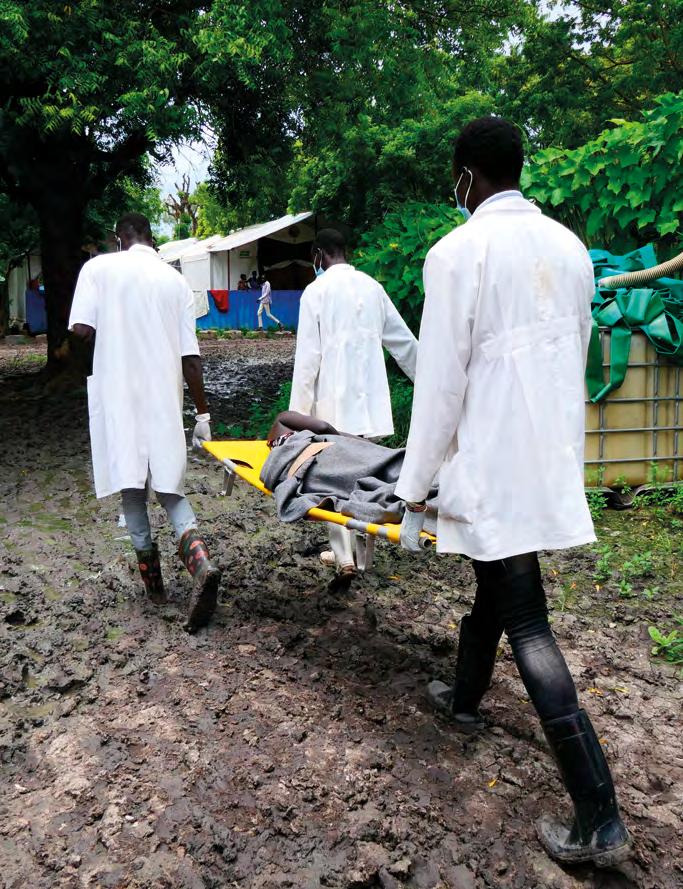
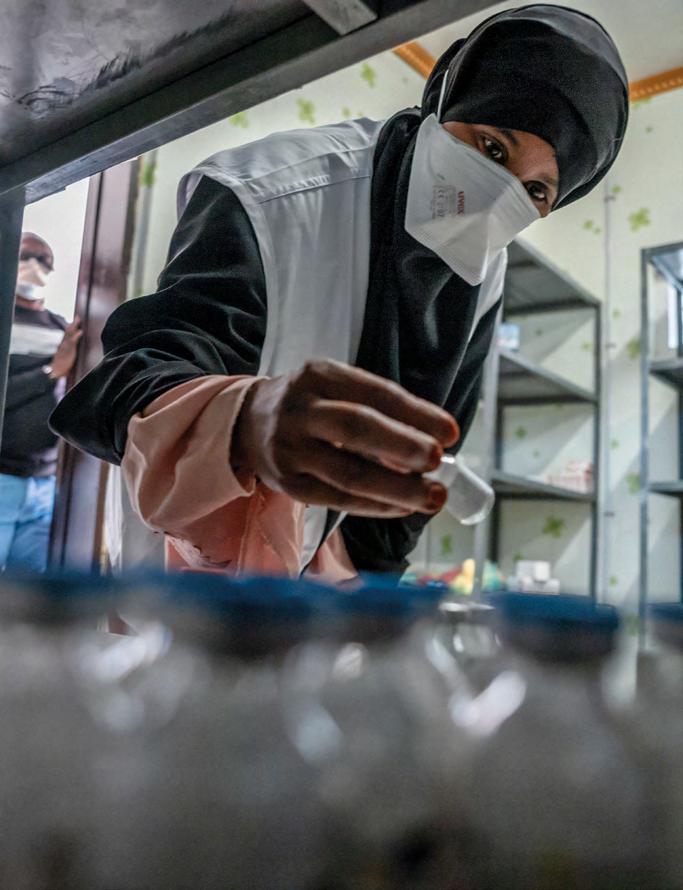
PROJECT STAFF:
637
FUNDING: TOTAL AU $20,169,896 $1,100,000
The pharmacy of the drug-resistant tuberculosis program in Hargeisa hospital. © Sean Sutton The Médecins Sans Frontières medical team carry a woman who is seven-months pregnant to the Old Fangak hospital. © Damaris Giuliana/MSF Project locations funded by Australian donors HARGEISA BERBERA AWEIL FANGAKIn Idlib governorate, specialised burns care at our unit in Atmeh, as well as services for displaced people living in camps via mobile clinics and supported health centres, including general consultations, treatment for infectious and chronic diseases and skin conditions, mental health support, COVID-19 prevention, water and sanitation and community-based surveillance to assess medical and humanitarian needs; in Tal-Abyad, Raqqa governorate, re-establishment of routine immunisation services in partnership with local organisations and a measles vaccination campaign; in Aleppo governorate, re-opening of our COVID-19 community treatment centres in Afrin and Al-Bab, and support for two primary healthcare centres.
KEY ACTIVITIES
In Arua, HIV care for children, adolescents, unstable patients and those with advanced-stage disease, including point-of-care viral load testing with the aim of rapid detection and early treatment; HIV screening, treatment and followup for communities in Kasese and Kitawenda districts; tuberculosis and multi-drug resistant tuberculosis screening and treatment in Arua; sexual and reproductive healthcare and general outpatient services for adolescents and young adults in Kasese; clinical and psychological care for survivors of sexual and gender-based violence, safe abortion care and mental health services in refugee settlements in Arua and Terego districts; support for the national COVID-19 response with triage, testing, vaccination for patients with comorbidities and case management.
IMPACT:
1,374 surgical procedures and 10,983 physiotherapy sessions provided at the specialised burns care unit in Atmeh.
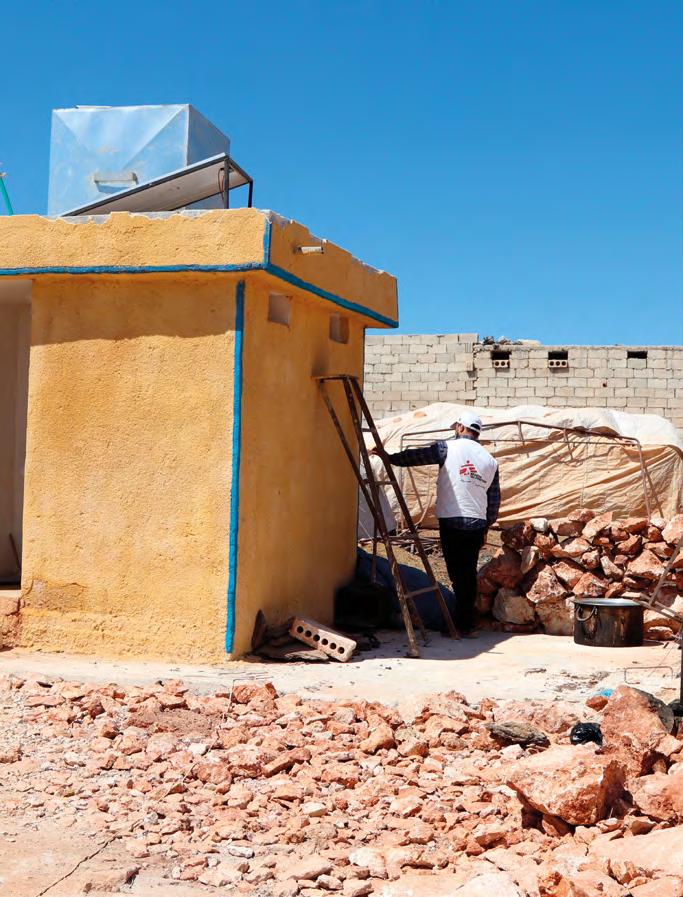
PROJECT STAFF:
145
FUNDING: TOTAL AU $5,174,811 $500,000 NZ $565,117
IMPACT:
Our youth-friendly, ‘one-stop’ clinic integrated in a local health centre in Kasese, offered services including health promotion and education, prevention, screening and treatment for sexually transmitted diseases, safe abortion care and peer support and counselling.
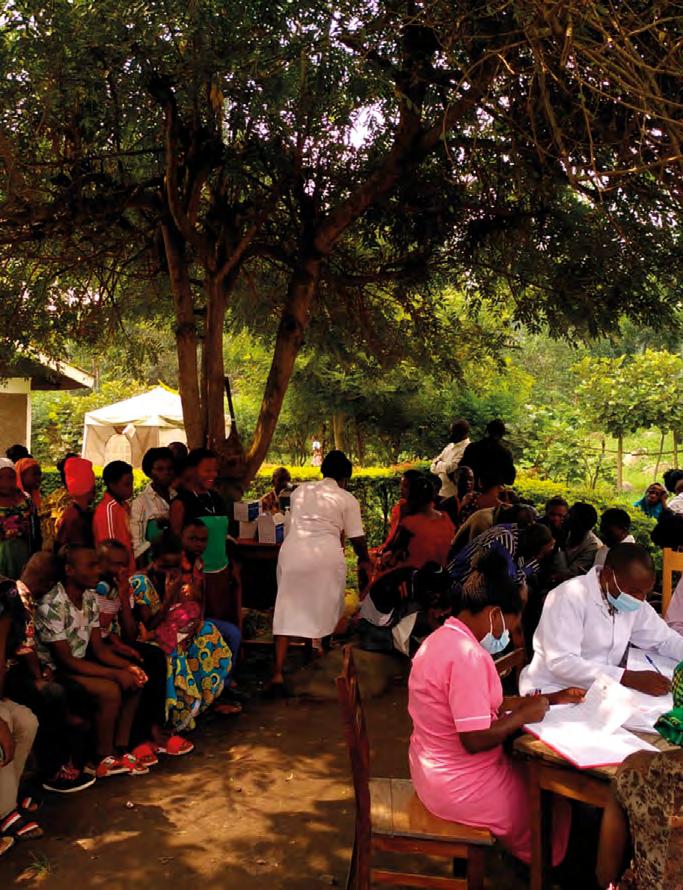
PROJECT STAFF: 207
FUNDING: TOTAL AU $6,686,343 $400,000
A staff member checks a latrine built by Médecins Sans Frontières in a camp for displaced people in Idlib. © Abdurzaq Alshami A COVID-19 vaccination site in Kasese district, during the Ministry of Health vaccination campaign supported by Médecins Sans Frontières. © Théo Wanteu/MSF Project locations funded by Australian and New Zealand donors Project locations funded by Australian donors IDLIB ALEPPO RAQQA ARUA KASESE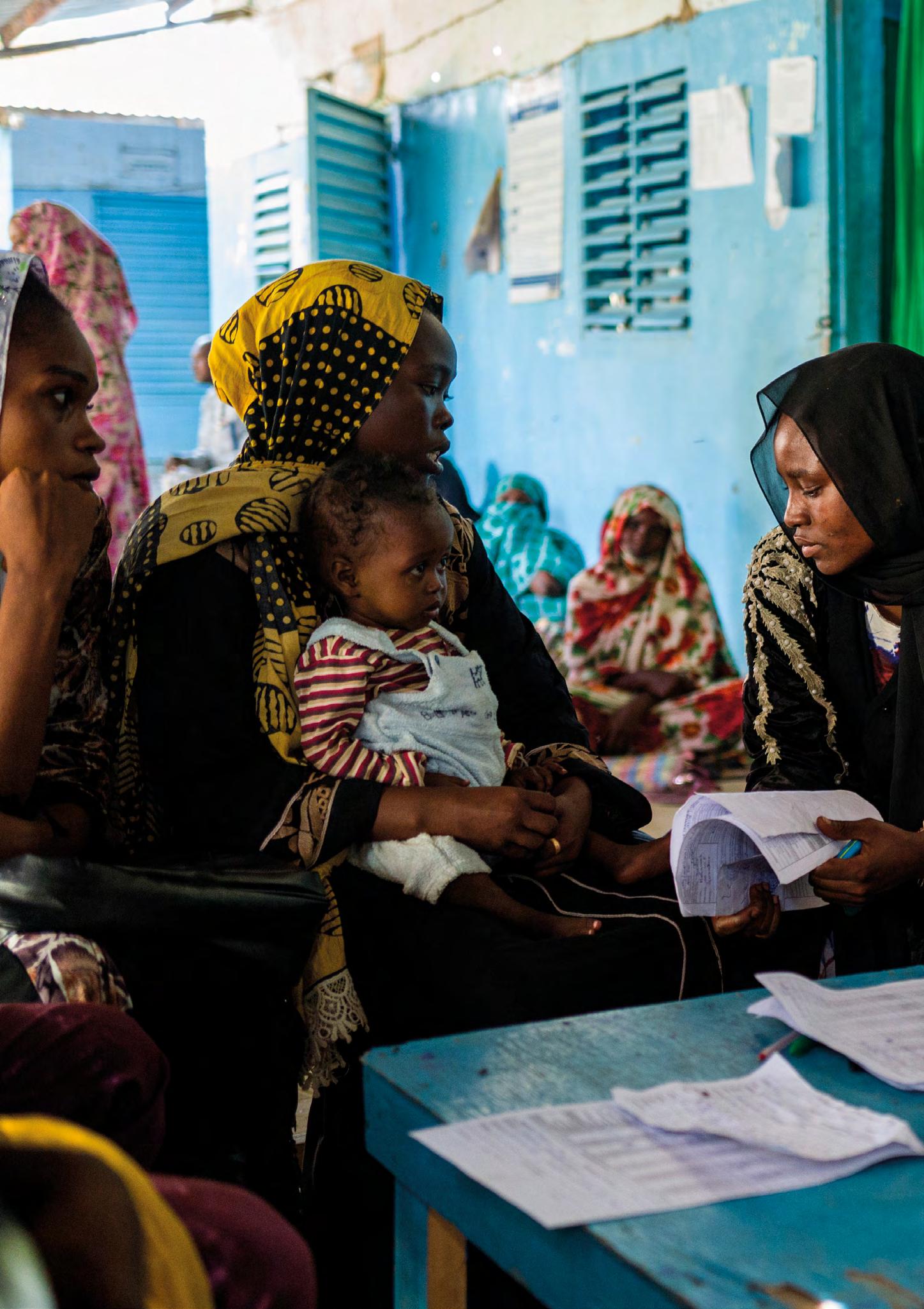 Community workers at a health centre supported by Médecins Sans Frontières in the Gozator district of Ndjamena, Chad, meet a mother and her daughter, who has malnutrition, to understand the reasons for the girl’s condition deteriorating after treatment. © Lys Arango
Médecins Sans Frontières Australia Annual Activity Impact Report 2021 – 39
Community workers at a health centre supported by Médecins Sans Frontières in the Gozator district of Ndjamena, Chad, meet a mother and her daughter, who has malnutrition, to understand the reasons for the girl’s condition deteriorating after treatment. © Lys Arango
Médecins Sans Frontières Australia Annual Activity Impact Report 2021 – 39
Australia Limited
ABN 74 068 758 654
Consolidated Financial Report for the Financial Year Ended 31 December 20 21
The Directors of Médecins Sans Frontières Australia submit herewith the annual Financial Report of the company for the financial year ended 31 December 2021. The names and particulars of the directors during or since the end of the financial year are:
Katrina Penney President from 29 May 2021. Re-elected to Board 29 May 2021. Previously member of the Board 2013-2019. Founding Trustee MSF New Zealand Charitable Trust and founding member of the Auckland MSF support network. Returning Officer for the Northland Electorate for 2020 NZ general election. Board member Alzheimer’s Northland Society Resident of New Zealand. Owner/Operator L&P Avo. Attended eight out of eight Directors’ meetings.
Dwin Tucker
Vice President from 29 May 2021. President from 23 May 2020 to 29 May 2021. Treasurer from 29 April 2016 to 23 May 2020. Appointed to the Board 1995-1998 as Treasurer. Elected to the Board 16 May 2015. Re-elected 25 May 2018. Director, Deafness Forum, ClearaSound and TurnkeyIO. Resident of Australia. Attended thirteen out of thirteen Directors’ meetings.
Maurine Elizabeth Hilton
Thorp Treasurer from 23 May 2020. Elected 18 May 2013, re-elected 29 April 2016, reelected 12 May 2019. Lawyer and consultant. Resident of Australia. Attended thirteen out of thirteen Directors’ meetings.
Kerry Atkins Elected to the Board 12 May 2019. CPA qualified, Graduate of the Humanitarian Leadership Program at Deakin University. Director of Finance and Operations, and Company Director, The Nature Conservancy Limited Resident of Australia. Attended thirteen out of thirteen Directors’ meetings.
Alice Cameron Elected to the Board 22 May 2020. Consultant. Resident of New Zealand. Resigned 12 May 2021. Attended four out of four Directors’ meetings.
Maria Cartwright Elected to the Board 29 May 2021. Registered nurse and midwife. Retired. Resident of Australia. Attended seven out of eight Director’s meetings.
Jacqueline Hewitt Appointed to the Board 31 August 2016. Elected to the Board 6 May 2017. Reelected to the Board 22 May 2020. Position vacated 27 January 2021. Medical Doctor – Pediatric Endocrinologist. Resident of Australia. Attended nil out of one Directors’ meeting.
Bethany Lansom Elected to the Board 22 May 2020. Resident of Australia. Principal Policy Officer, Preparedness, State Preparedness & Response Branch, NSW Ministry of Health. Attended twelve out of thirteen Directors’ meetings.
Carol Nagy Appointed to the Board 22 October 2020. Elected to the Board 29 May 2021. Resigned 11 November 2021. Clinical Nurse in emergency and intensive care. Resident of Australia. Attended eleven out of twelve Directors’ meetings.
Dr Vin Massaro Appointed to the Board 20 October 2020. Elected to the Board 29 May 2021. Resigned 13 December 2021. Professorial Fellow of the University of Melbourne and Independent member of the Board of the Royal Australian and New Zealand College of Radiologists. Resident of Australia. Attended twelve out of thirteen Directors’ meetings.
Patricia Schwerdtle Vice President from 23 May 2020. Appointed to the Board on 21 June 2017. elected 25 May 2018. Term as Director ended 29 May 2021. Registered Nurse and Academic, Heidelberg Institute of Global Health, Heidelberg University, Germany. Nursing and Midwifery, Monash University, Melbourne. Resident of Germany. Attended five of five Directors’ meetings
Dr Meguerditch Terzian Appointed to the Board on 6 March 2017. Medical Doctor and President, Médecins Sans Frontières France. Resident of France. Attended twelve out of thirteen Directors’ meetings.
Dr Mohammad-Ali Trad Appointed to the Board 16 October 2020. Elected to the Board 29 May 2021. Infectious Diseases Physician in Launceston General Hospital and Honorary Senior Clinical Lecturer at the University of Tasmania. Resident of Australia. Attended twelve out of thirteen Directors’ meetings.
Ms Jennifer Tierney, Executive Director of Médecins Sans Frontières Australia Limited (‘MSF’)
Ms Emma Sullivan Smith, Association Coordinator of Médecins Sans Frontières Australia Limited (‘MSF’)
The Group’s short-and long-term objectives are to:
Continue to deliver our core medical humanitarian work
• Attracting and developing high quality field workers and efficiently matching them to the needs of the movement;
• Raising funds to build sustainable financial health of the movement so that we can deliver care to patients;
• Speaking out and advocating on behalf of our patients, bearing witness to their needs and inspiring support in our social purpose;
• Being a source of medical expertise in women’s health, paediatric and neonatal health, and sexual violence care, and providing direct support to our medical humanitarian projects.
The Group’s strategy for achieving these objectives:
Transform our working practice to respond flexible and effectively to our patients’ needs.
Our approach is focused around 3 themes:
• Putting patients first: championing patient centred care in all the projects in which we work, focusing our communications around a patient-centred narrative, supporting regional partnerships which are patient-centred, environmentally responsible, locally relevant and more efficient.
• Engaging our communities: shifting our communications approach to improve our engagement with our audiences, continuing to provide excellent donor care and employing new technologies and ways of working to ensure our organisation is prepared for the future.
• Valuing our people: offering an inclusive workplace environment and culture and developing our culture so that we work with greater agility and responsiveness to the needs of our patients.
The principal activities of the Group during the financial year to 31 December 2021 have been:
• Fundraising from the Australian and New Zealand general public in order to finance the field operations of Médecins Sans Frontières.
• Liaison with institutions and individuals in Australia and internationally, with a view to obtaining funding or other operational support for field projects, and for coordination with other organisations involved in overseas humanitarian relief.
• Provision of medical expertise in women’s health, child health and sexual violence care through direct visits to Médecins Sans Frontières medical humanitarian projects overseas, technical support and oversight, preparation of medical field staff, medical training, medico-operational research, medical communications, and medical policy development.
• Operational participation in the field projects of the international movement of Médecins Sans Frontières, through financing field operations; assignment of field staff humanitarian relief workers; participation as faculty in various Australian and international training courses for such field staff; and evaluation missions to field projects.
• Engaging with communities in the form of dissemination of public information on humanitarian and development issues; provision of materials and spokespeople to journalists in the print and electronic media; publication of newsletters; participation in seminars; and guest lectureships at secondary schools and universities.
The nature of each of these activities has not changed significantly during the year. They are described in the Annual Review that will be available to the public from July 2022.
The Group measures performance through the establishment and monitoring of benchmarks including:
• 100% compliance with all regulatory requirements
• Risk identification, monitoring, and mitigation strategy
• Fundraising meets the needs of the movement to fund operations;
• Proportion of financial resource spend between social mission and administrative costs within an appropriate range;
• Australian and New Zealand recruitment and placement executed to meet resource needs identified within the Médecins Sans Frontières movement;
• Patient-centred operational impact for Sydney Medical Unit expertise in women’s paediatric and neonatal health and sexual violence care continues; and
• Grown in engagement – field communications, awareness raising and advocacy to inspire support for our patients’ needs.
The performance against these key performance indicators is as follows:
• Private revenue in 2021 has increased by 8.3%;
• Financial resources allocated 75.2% social mission costs to 24.8% administration in 2021;
• 36 new recruits and 113 field placements made during 2021 in accordance with identified needs;
• In 2021, 49 projects in 45 countries received technical oversight, field support and training in women’s health, child health, and sexual violence care
The net operating surplus for the financial year to 31 December 2021 was $8,936,480 (2020: operating surplus of $1,531,943).
During the financial year there was no other significant change in the state of affairs of the Group, other than that referred to in the financial statements or notes thereto. Medecins Sans Frontieres Australia Limited has continued to be impacted by Covid in 2021 in multiple ways, including experiencing a higher cost to send fieldworkers overseas, primarily working from home for office staff and having to adjust our fundraising approach.
Médecins Sans Frontières Australia Limited continued the strategy of face-to-face fundraising whereby the organisation contracts a third party to approach members of the public, in public places, to recruit new field partners. The financial impact continues to be that a cost is created at the outset that is more than made up over subsequent years of income. Médecins Sans Frontières Australia Limited continues to diversify its sources of funding and to increase regular field partner donations.
Médecins Sans Frontières Australia Limited continues to pay field staff from Australia when they go to the field. The financial impact of this is not significant as the salary cost incurred by Médecins Sans Frontières Australia Limited is recharged to the relevant operational centres.
In total, during 2021, Médecins Sans Frontières Australia Limited committed $45,606,303 (2020: $43,598,653) of funds to the field to Médecins Sans Frontières France, and $19,545,558 (2020: $18,170,852) to Médecins Sans Frontières Switzerland. Additionally, Médecins Sans Frontières Australia Limited committed $364,346 to Climate SMART (Médecins Sans Frontières Canada) (2020: Nil).
In selecting the projects which Médecins Sans Frontières Australia Limited supports through its grant payments to Operational Centre Paris and Operational Centre Geneva, the DFAT list of developing countries is consulted to ensure compliance requirements are fulfilled.
Over the course of the year the Group has received donations in kind from a number of sources. These donations may be physical assets for use in the Group, items to be sent to the field or services provided to Médecins Sans Frontières at reduced rates.
The value of donations in kind received during the year to 31 December 2021 is $575,332 (2020: $248,917). This amount has been brought to account in the financial statements.
In addition to donations in kind the Group recruits a number of staff in the field for Médecins Sans Frontières operational centres There are five Médecins Sans Frontières operational centres and they are located in Belgium, France, Holland, Spain and Switzerland. Many of the field staff are professional staff. The Group estimates that the total salaries forgone by field staff working within their professional capacity in Australia for the year ended 31 December 2021 to be approximately $1,752,805 (2020: $2,332,814).
The Group estimates that the total salaries forgone by field staff working within their professional capacity in Australia who undertook missions of less than three months to be approximately $345,005 (2020: $365,871).
Médecins Sans Frontières Australia Limited also have a number of volunteers who freely give their time in the Australia office to assist in office-based activities. The estimated value of this is approximately $56,756 (2020: $17,966).
The Board of Directors (except for the President of the Board, who receives a partial salary) and Association also freely give their time to Médecins Sans Frontières Australia Limited. The estimated value of the time provided by the Board of Directors is approximately $424,640 (2020: $417,600).
This time donated by office volunteers, and salaries which would have been paid to the volunteers sent to the field, are not brought to account in the financial statements since they cannot be reliably measured (estimates above are based on high level analysis only).
The mission of Médecins Sans Frontières Australia Limited is to provide assistance to people in distress, to victims of natural or man-made disasters and victims of armed conflict and to increase awareness of the plight of these people. The international Médecins Sans Frontières movement as a whole, targets a social mission ratio whereby around 80% of expenditure is directly devoted to this social mission. In 2021 Médecins Sans Frontières Australia Limited spent $78,170,856 to the social mission therefore representing 75.2% of total expenditure (2020: $77,693,278). A number of factors impact the ratio and will continue to be ongoing factors:
• Maintaining sufficient levels of cash reserves in subsequent years to preserve the safety of operational funding.
• Responding to the operational needs of the operational centres.
• Administrative and Fundraising requirements.
There has not been any matter or circumstance that has arisen since the end of the financial year that has significantly affected, or may significantly affect, the operations of the Group, the results of those operations, or the state of affairs of the Group in future financial years.
It is likely that in future financial years, the Group will continue to provide operational, financial, and human resource support to the field operations of Médecins Sans Frontières financed substantially by income from private fundraising. Where possible, subject to the availability of resources, the company intends to increase its level of support for the field operations of Médecins Sans Frontières.
Médecins Sans Frontières Australia Limited is looking to further consolidate its presence into New Zealand and in partnership with regional Médecins Sans Frontières sections, expand its presence into new countries in South East Asia.
The Board of Médecins Sans Frontières Australia Limited approved the Transformation program launched on 9 March 2022, which over the next two years will be implementing new technologies and new ways of working, designed to improve our social mission ratio. The program will enable us to take better care of our staff, here and overseas. We will have a better analysis that allows us to invest our funds wisely, send more money to the field and spend less money on administration. We will be at lower risk, able to make insightful decisions to inform our direction, and scale MSF Australia and New Zealand for future growth.
Under the terms of the Group’s constitution, the Group is not authorised to pay dividends.
During the financial year, the Group paid a premium in respect of a contract insuring the directors and officers of the company (as listed on page 3 of the Financial Report) against a liability incurred as such a director to the extent permitted by the Australian Charities and Not-for-profits Commission Act 2012. The contract of insurance prohibits disclosure of the nature of the liability and the amount of the premium.
The Company has not otherwise, during or since the financial year, except to the extent permitted by law, indemnified or agreed to indemnify an officer of the company or of any related body corporate against a liability incurred as such an officer.
To the extent permitted by law, the Group has agreed to indemnify its auditors, Ernst & Young Australia, as part of the terms of its audit engagement agreement against claims by third parties arising from the audit (for an unspecified amount). No payment has been made to indemnify Ernst & Young during or since the financial year.
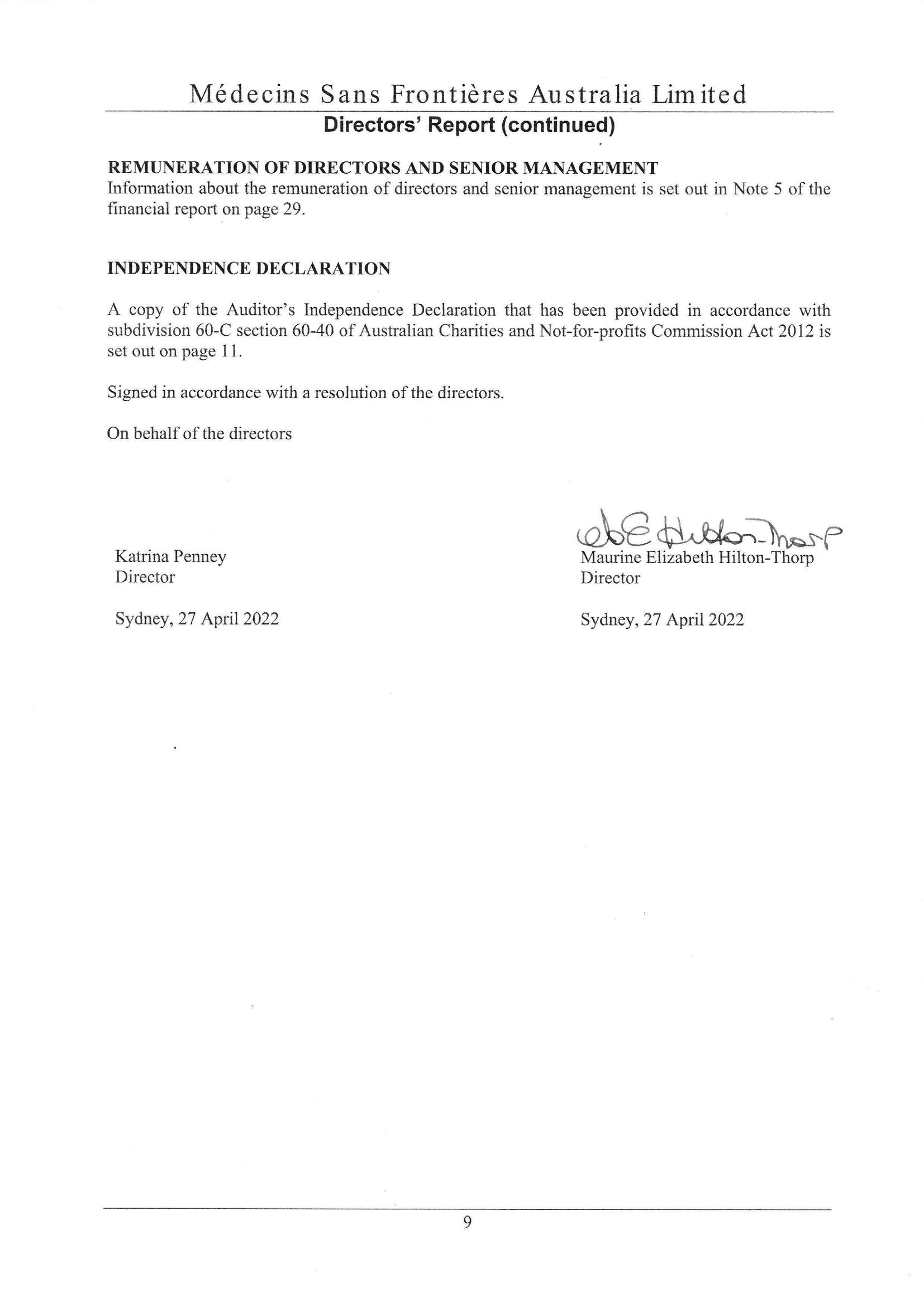

In relation to our audit of the financial report of Médecins Sans Frontières Australia Limited for the financial year ended 31 December 2021 , and in accordance with the requirements of Subdivision 60-C of the Australian Charities and Not -for-profits Commission Act 2012 , to the best of my knowledge and belief, there have been:
a. No contraventions of the auditor independence requirements of any applicable code of professional conduct; and
b. No non-audit services provided that contravene any applicable code of professional conduct. Ernst
& Young Anton Ivanyi Partner 27 April 2022

We have audited the financial report of Médecins Sans Frontières Australia Limited (the Company) and its subsidiaries (collectively the Group), which comprises the consolidated statement of financial position as at 31 December 2021, the consolidated statement of comprehensive income, consolidated statement of changes in equity and consolidated statement of cash flows for the year then ended, notes to the financial statements, including a summary of significant accounting policies , and the directors' declaration.
In our opinion, the accompanying financial report of the Group is in accordance with the Australian Charities and Not-for-Profits Commission Act 2012 , including:
a) giving a true and fair view of the consolidated financial position of the Group as at 31 December 2021 and of its consolidated financial performance for the year ended on that date; and
b) complying with Australian Accounting Standards
Reduced Disclosure Requirements and the Australian Charities and Not -for-Profits Commission Regulation 2013 .
We conducted our audit in accordance with Australian Auditing Standards. Our responsibilities under those standards are further described in the Auditor’s Responsibilities for the Audit of the Financial Report section of our report. We are independent of t he Group in accordance with the ethical requirements of the Accounting Professional and Ethical Standards Board’s APES 110 Code of Ethics for Professional Accountants (the Code) that are relevant to our audit of the financial report in Australia. We have also fulfilled our other ethical responsibilities in accordance with the Code.
We believe that the audit evidence we have obtained is sufficient and appropriate to provide a basis for our opinion.
The directors are responsible for the other information. The other information is the directors’ report accompanying the financial report.
Our opinion on the financial report does not cover the other information and accordingly we do not express any form of assurance conclusion thereon.
In connection with our audit of the financial report, our responsibility is to read the other information and, in doing so, consider whether the other information is materially inconsistent with the financial report or our knowledge obtained in the audit or otherwise appears to be materially misstated.
Tel: +61 2 9248 5555
Fax: +61 2 9248 5959
ey.com/au
If, based on the work we have performed, we conclude that there is a material misstatement of this other information, we are required to report that fact. We have nothing to report in this regard.
The directors of the Company are responsible for the preparation of the financial report that gives a true and fair view in accordance with Australia n Accounting Standards – Reduced Disclosure Requirements and the Australian Charities and Not -for-Profits Commission Act 2012 and for such internal control as the directors determine is necessary to enable the preparation of the financial report that gives a true and fair view and is free from material misstatement, whether due to fraud or error.
In preparing the financial report, the directors are responsible for assessing the Group’s ability to continue as a going concern, disclosing, as applicable, matte rs relating to going concern and using the going concern basis of accounting unless the directors either intend to liquidate the Group or to cease operations, or have no realistic alternative but to do so.
Our objectives are to obtain reasonable assurance about whether the financial report as a whole is free from material misstatement, whether due to fraud or error, and to issue an auditor’s report that includes our opinion. Reasonable assurance is a high level of assurance, but is not a guarantee that an audit conducted in accordance with the Australian Auditing Standards will always detect a material misstatement when it exists. Misstatements can arise from fraud or error and are considered m aterial if, individually or in the aggregate, they could reasonably be expected to influence the economic decisions of users taken on the basis of this financial report.
As part of an audit in accordance with the Australian Auditing Standards, we exercise professional judgment and maintain professional scepticism throughout the audit. We also:
• Identify and assess the risks of material misstatement of the financial report, whether due to fraud or error, design and perform audit procedures responsive to thos e risks, and obtain audit evidence that is sufficient and appropriate to provide a basis for our opinion. The risk of not detecting a material misstatement resulting from fraud is higher than for one resulting from error, as fraud may involve collusion, forgery, intentional omissions, misrepresentations, or the override of internal control.
• Obtain an understanding of internal control relevant to the audit in order to design audit procedures that are appropriate in the circumstances, but not for the purpose of expressing an opinion on the effectiveness of the Group’s internal control.
• Evaluate the appropriateness of accounting policies used and the reasonableness of accounting estimates and related disclosures made by the directors.
• Conclude on the appropriateness of the directors’ use of the going concern basis of accounting and, based on the audit evidence obtained, whether a material uncertainty exists related to events or conditions that may cast significant doubt on the Group’s ability to continue as a going concern. If we conclude that a material uncertainty exists, we are required to draw attention in our auditor’s report to the related discl osures in the financial report or, if such disclosures are inadequate, to modify our opinion. Our conclusions are based on the audit evidence obtained up to the date of our auditor’s report. However, future events or conditions may cause the Group to cease to continue as a going concern.
Tel: +61 2 9248 5555 Fax: +61 2 9248 5959
• Evaluate the overall presentation, structure and content of the financial report, including the disclosures, and whether the financial report represents the underlying transactions and events in a manner that achieves fair presentation.
• Obtain sufficient appropriate audit evidence regarding the financial information of the entities or business activities within the Group to express an opinion on the financial report. We are responsible for the direction, supervision an d performance of the Group audit. We remain solely responsible for our audit opinion.
We communicate with the directors regarding, among other matters, the planned scope and timing of the audit and significant audit findings, including any significant def iciencies in internal control that we identify during our audit.
Report on the requirements of the NSW Charitable Fundraising Act 1991 and the NSW Charitable Fundraising Regulations 2015 and the requirements of the WA Charitable Collections Act (1946) and the WA Charitable Collections Regulations (1947)
We have audited the financial report as required by Section 24(2) of the NSW Charitable Fundraising Act 1991 and the WA Charitable Collections Act (1946) . Our procedures included obtaining an understanding of the internal control structure for fundraising appeal activities and examination, on a test basis, of evidence supporting compliance with the accounting and associated record keeping requirements for fundraising appeal activities pursuant to the NSW Charitable Fundraising Act 1991 and the NSW Charitable Fundraising Regulations 2015 and the WA Charitable Collections Act (1946) and the WA Charitable Collections Regulations (1947) .
Because of the inherent limitations of any assurance engagement, it is possible that fraud, error or noncompliance may occur and not be detected. An audit is not designed to detect all instances of noncompliance with the requirements described in the above -mentioned Act(s) and Regulations as an audit is not performed continuously throughout the period and the audit procedures performed in respect of compliance with these requirements are undertaken on a test basis. The audit opinion expressed in this report has been formed on t he above basis.
In our opinion:
a) the financial report of the Company has been properly drawn up and associated records have been properly kept during the financial year ended 31 December 2019, in all material respects, in accordance with:
i. sections 20(1), 22(1- 2), 24(1- 3) of the NSW Charitable Fundraising Act 1991;
ii. sections 10(6) and 11 of the NSW Charitable Fundraising Regulations 2015;
iii. the WA Charitable Collections Act (1946); and
iv. the WA Charitable Collections Regulations (1947).
Ernst & Young

200 George Street
Sydney NSW 2000 Australia
GPO Box 2646 Sydney NSW 2001
Tel: +61 2 9248 5555
Fax: +61 2 9248 5959
ey.com/au
b) the money received as a result of fundraising appeals conducted by the Company during the financial year ended 31 December 20 21 has been properly accounted for and applied, in all material respects, in accordance with the above mentioned Act(s) and Regulations.

Sydney
27 April 2022


Notes to the financial statements are included on pages 19 to 42

Notes to the financial statements are included on pages 19 to 42
Notes to the financial statements are included on pages 19 to 42
Notes to the financial statements are included on pages 19 to 42
Médecins Sans Frontières Australia Limited is a public company limited by guarantee, incorporated, and operating in Australia.
Principal registered office and principal place of business:
Level 4
1-9 Glebe Point Road
Glebe, NSW 2037
Tel: (02) 8570 2600
Further information on the nature of the operations and principal activities of the Group is provided in the Directors’ Report.
The Financial statements were authorised for issue, in accordance with a resolution of directors, on 27April 2022
The Group is a registered charity and a reporting entity. Therefore the financial statements of the Group are tier 2 general purpose financial statements which have been prepared in accordance with Australian Accounting Standards – Reduced Disclosure Requirements (AASB – RDRs) (including Australian Interpretations) adopted by the Australian Accounting Standards Board (AASB) and the Australian Charities and Not-for-profits Commission Regulation 2013.
The Financial Report is a general-purpose financial report, which has been prepared in accordance with the requirements of the Australian Charities and Not-for-profits Commission Act 2012 and Australian Accounting Standards – Reduced Disclosure Requirements and other authoritative pronouncements of the Australian Accounting Standards Board. The Financial Report has also been prepared on a historical cost basis. All amounts are presented in Australian dollars, unless otherwise noted.
In addition, the Group presents an additional statement of financial position at the beginning of the preceding period when there is a retrospective application of an accounting policy, a retrospective restatement, or a reclassification of items in financial statements.
Compliance with International Financial Reporting Standards (IFRS)
The Financial Report also complies with International Financial Reporting Standards (IFRS) as issued by the International Accounting Standards Board.
The consolidated financial statements of the Group include a wholly owned subsidiary, Médecins Sans Frontières New Zealand Charitable Trust which commenced operations in April 2017. Control is achieved when the Group is exposed, or has rights, to variable returns from its involvement with the investee and has the ability to affect those returns through its power over the investee.
Specifically, the Group controls an investee if, and only if, the Group has:
(i) Power over the investee (i.e. existing rights that give it the current ability to direct the relevant activities of the investee)
(ii) Exposure, or rights, to variable returns from its involvement with the investee
(iii) The ability to use its power over the investee to affect its returns
Generally, there is a presumption that a majority of voting rights results in control. To support this presumption and when the Group has less than a majority of the voting or similar rights of an investee, the Group considers all relevant facts and circumstances in assessing whether it has power over an investee, including:
(i) The contractual arrangement(s) with the other vote holders of the investee
(ii) Rights arising from other contractual arrangements
(iii) The Group’s voting rights and potential voting rights.
The Group re-assesses whether or not it controls an investee if facts and circumstances indicate that there are changes to one or more of the three elements of control. Consolidation of a subsidiary begins when the Group obtains control over the subsidiary and ceases when the Group loses control of the subsidiary. Assets, liabilities, income, and expenses of a subsidiary acquired or disposed of during the year are included in the consolidated financial statements from the date the Group gains control until the date the Group ceases to control the subsidiary.
Surplus or deficit and each component of Other Comprehensive Income (“OCI”) are attributed to the parent of the Group. When necessary, adjustments are made to the financial statements of subsidiaries to bring their accounting policies into line with the Group’s accounting policies. All intra-group assets and liabilities, equity, income, expenses, and cash flows relating to transactions between members of the Group are eliminated in full on consolidation.
A change in the ownership interest of a subsidiary, without a loss of control, is accounted for as an equity transaction. If the Group loses control over a subsidiary, it derecognises the related assets (including goodwill), liabilities, non-controlling interest, and other components of equity, while any resultant gain or loss is recognised in surplus or deficit. Any investment retained is recognised at fair value.
Cash comprises cash on hand and demand deposits. Cash equivalents are short-term, highly liquid investments that are readily convertible to known amounts of cash and which are subject to an insignificant risk of changes in value.
Over the course of the year the Group has received donations in kind from a number of sources. These donations may be items used in the office, or services provided at reduced rates. Donations in kind of plant and equipment are recorded at fair value. Items to be used in the office and services provided for no consideration are also brought to account in the financial statements at the fair value of the items or services received.
In addition to donations in kind, both office volunteers and field staff sent to the field donate their time to Médecins Sans Frontières Australia Limited. This time donated by office volunteers and salaries foregone by volunteers sent to the field are not brought to account in the financial statements since they cannot be reliably measured.
The Group is in the business of fundraising from the general public. Revenue from contracts with our donors is recognised when cash is received.
The Group does not receive government grants, either state or federal
Liabilities for wages and salaries, including non-monetary benefits, annual leave and accumulating sick leave expected to be settled within 12 months of the reporting date are recognised in respect of employees' services up to the reporting date.
They are measured at the amounts expected to be paid when the liabilities are settled. Expenses for non-accumulating sick leave are recognised when the leave is taken and are measured at the rates paid or payable.
The liability for long service leave is recognised and measured as the present value of expected future payments to be made in respect of services provided by employees up to the reporting date using the projected unit credit method. Consideration is given to expected future wage and salary levels, experience of employee departures, and periods of service. Expected future payments are discounted using market yields at the reporting date on national government bonds with terms to maturity and currencies that match, as closely as possible, the estimated future cash outflows.
e)
Fundraising expenses include those costs, which are directly attributable to fundraising, such as function expenses, promotions, printing and mailing and employee expenses. These expenses are brought to account in the period in which they are incurred.
f)
Field costs include expenses associated with remitting funds to our Operational Centres and the costs of deploying and paying our field staff.
Trade and other receivables, which comprise amounts due from Médecins Sans Frontières International entities, GST recoverable and others, are recognised and carried at original invoice amount. The carrying amount of the receivable is deemed to reflect fair value. These receivables are non-interest bearing.
An allowance for doubtful debts is made when there is objective evidence that the Group will not be able to collect the debts. Bad debts are written off when identified.
The net amount of GST recoverable from, or payable to, the taxation authority is included as part of liabilities as a receivable.
h)
Revenues, expenses, and assets are recognised net of the amount of goods and services tax (GST), except:
i. where the amount of GST incurred is not recoverable from the taxation authority, it is recognised as part of the cost of acquisition of an asset or as part of an item of expense; or
ii. for receivables and payables which are recognised inclusive of GST.
Cash flows are included in the cash flow statement on a gross basis. The GST component of cash flows arising from investing and financing activities which is recoverable from, or payable to, the taxation authority is classified as operating cash flows.
i) Income tax
Section 50-5 of the Income Tax Assessment Act provides that certain bodies will be exempt from income tax. The Group is exempt from income tax in accordance with the Act; accordingly no provision for income tax has been recorded.
j) Leases
The Group assesses at contract inception whether a contract is, or contains, a lease. That is, if the contract conveys the right to control the use of an identified asset for a period of time in exchange for consideration.
The Group applies a single recognition and measurement approach for all leases, except for short-term leases as leases of low-value assets. The Group recognises lease liabilities to make lease payments and right-of-use assets representing the right to use the underlying assets.
The Group recognises right-of-use assets at the commencement date of the lease (i.e. the date of the underlying asset is available for use). Right-of-use assets are measured at cost, less any accumulated depreciation and impairment of losses, and adjusted for any remeasurement of lease liabilities. The cost of right-of-use assets includes the amount of lease liabilities recognised, initial direct costs incurred, and lease payments made at or before the commencement date less any lease incentives received. Right-of-use assets are depreciated on a straight-line basis over the shorter of the lease term and the estimated useful lives of the assets as follows:
• Office Building 3 to 15 years
• Other equipment 3 to 5 years
If ownership of the leased asset transfers to the Group at the end of the lease terms or the cost reflects the exercise of a purchase option, depreciation is calculated using the estimated useful life of the asset.
The right-of-use assets are also subject to impairment
At the commencement date of the lease, the Group recognises lease liabilities measured at the present value of lease payments to be made over the lease term. The lease payments include fixed payments (including in-substance fixed payments) less any lease incentives receivable, variable lease payments that depend on an index or a rate, and amounts expected to be paid under residual value guarantees. The lease payments also include the exercise price of a purchase option reasonably certain to be exercised by the Group and payments of penalties for terminating the lease, if the lease term reflects the Group exercising the option to terminate. Variable lease payments that do not depend on an index or a rate are recognised as expenses (unless they are incurred to produce inventories) in the period in which the event or condition that triggers the payment occurs. In calculating the present value of lease payments, the Group uses its incremental borrowing rate at
the lease commencement date because the interest rate implicit in the lease is not readily determinable. After the commencement date, the amount of lease liabilities is increased to reflect the accretion of interest and reduced for the lease payments made. In addition, the carrying amount of lease liabilities is remeasured if there is a modification, a change in the lease term (e.g. changes to future payments resulting from a change in an index or rate used to determine such lease payments) or a change in the assessment of an option to purchase the underlying asset.
The Group’s lease liabilities are included in the Non-current liabilities.
The Group applies the short-term lease recognition exemption to its short-term leases of equipment (i.e. those leases that have a lease term of 12 months or less from the commencement date and do not contain a purchase option). It also applies the lease of low-value assets recognition exemption to lease of office equipment that considered to be low value. Lease payments on short-term leases and leases of low-value assets are recognises as expense on a straight-line basis over the lease term.
Trade payables and other accounts payable are recognised when the Group becomes obliged to make future payments resulting from the purchase of goods and services.
Plant and equipment and leasehold improvements are stated at cost, less accumulated depreciation, and impairment. Cost includes expenditure that is directly attributable to the acquisition of the item.
Depreciation is provided on plant and equipment and is calculated on a straight-line basis so as to write off the net cost of each asset over its expected useful life. Leasehold improvements are depreciated over the period of the lease or estimated useful life, whichever is the shorter, using the straight-line method. The estimated useful lives, residual values and depreciation method are reviewed at the end of each annual reporting period, with the effect of any changes recognised on a prospective basis.
The carrying values of plant and equipment are reviewed for impairment at each reporting date, with recoverable amount being estimated when events or changes in circumstances indicate that the carrying value may be impaired.
An item of plant and equipment is derecognised upon disposal, when the item is no longer used in the operations of the Group or when it has no sale value. Any gain or loss arising on derecognition of the
asset (calculated as the difference between the net disposal proceeds and the carrying amount of the asset) is included in surplus or deficit in the year the asset is derecognised.
Provisions are recognised when the Group has a present obligation (legal or constructive) as a result of a past event. It is probable that the Group will be required to settle the obligation, and a reliable estimate can be made of the amount of provision.
The amount recognised as a provision is the best estimate of the consideration required to settle the present obligation at reporting date, taking into account the risks and uncertainties surrounding the obligation. Where a provision is measured using the cash flows estimated to settle the present obligation, its carrying amount is the present value of those cash flows.
Revenue is measured at the fair value of consideration received or receivable. Revenue is recognised net of the amounts of goods and services tax (GST) payable to the Australia Taxation Office.
Donations
Donations collected, including cash and goods for resale, are recognised as revenue when the Group gains control, economic benefits are probable and the amount of the donation can be measured reliably.
Legacies & Bequests
Legacies & bequests are recognised when received.
Investment income mainly comprises interest income. Interest income is recognised as it accrues, using the effective interest method
The gain or loss on disposal of all non-current assets is determined as the difference between the carrying amount of the asset at the time of disposal and the net proceeds on disposal.
The Group’s consolidated financial statements are presented in Australian dollars, which is also the parent company’s functional currency. For each entity, the Group determines the functional currency and items included in the financial statements of each entity are measured using that functional currency. The Group uses the direct method of consolidation and on disposal of a foreign operation.
the gain or loss that is reclassified to surplus or deficit reflects the amount that arises from using this method.
Transactions in foreign currencies are initially recorded by the Group’s entities at their respective functional currency spot rates at the date the transaction first qualifies for recognition.
Monetary assets and liabilities denominated in foreign currencies are translated at the functional currency spot rates of exchange at the reporting date.
Differences arising on settlement or translation of monetary items are recognised in surplus or deficit with the exception of monetary items that are designated as part of the hedge of the Group’s net investment in a foreign operation. These are recognised in Other Comprehensive Income (OCI) until the net investment is disposed of, at which time, the cumulative amount is reclassified to surplus or deficit. Tax charges and credits attributable to exchange differences on those monetary items are also recorded in OCI.
Non-monetary items that are measured in terms of historical cost in a foreign currency are translated using the exchange rates at the dates of the initial transactions. Non-monetary items measured at fair value in a foreign currency are translated using the exchange rates at the date when the fair value is determined.
The gain or loss arising on translation of non-monetary items measured at fair value is treated in line with the recognition of the gain or loss on the change in fair value of the item (i.e., translation differences on items whose fair value gain or loss is recognised in OCI or surplus or deficit are also recognised in OCI or surplus or deficit, respectively).
On consolidation, the assets and liabilities of foreign operations are translated into Australian dollars at the rate of exchange prevailing at the reporting date and their statements of surplus or deficit are translated at exchange rates prevailing at the dates of the transactions. The exchange differences arising on translation for consolidation are recognised in OCI. On disposal of a foreign operation, the component of OCI relating to that particular foreign operation is reclassified to surplus or deficit.
Where necessary, comparative figures have been reclassified to conform with changes in the presentation for the current year.
Several amendments and interpretations apply for the first time in 2021, but do not have an impact on the consolidated financial statements of the Group. The Group has not early adopted any standards, interpretations or amendments that have been issued but are not yet effective.
The application of Australian Accounting Standards requires making judgments, estimates and assumptions to be made about carrying values of assets and liabilities that are not readily apparent from other sources. The estimates and associated assumptions are based on historical experience and various other factors that are believed to be reasonable under the circumstance, the results of which form the basis of making the judgments. Actual results may differ from these estimates
The estimates and underlying assumptions are reviewed on an ongoing basis. Revisions to accounting estimates are recognised in the period in which the estimate is revised if the revision affects only that period, or in the period of the revision and future periods if the revision affects both current and future periods.
The following are the critical judgements that management has made that have the most significant effect on the amounts recognised in the financial statements:
i. Provisions for employee benefits – management judgement is applied in determining the future increase in wages and salaries, future on cost rates and experience of employee departures and expected period of service. Refer to Note 11 for further details.
ii. Make good provisions - Provisions for future costs to return certain leased premises to their original condition are based on the Group’s past experience with similar premises and estimates of likely restoration costs. These estimates may vary from the actual costs incurred as a result of conditions existing at the date the premises are vacated.
The above judgements are considered to have a significant effect on the accounts and the basis of estimation are included within Note 2.
Revenue from operations consisted of the following items:
Surplus before tax consisted of the following items:
The directors and other members of key management personnel of Médecins Sans Frontières Australia Limited during the year were
• Ms Katrina Penney (President, non-executive), from 29 May 2021
• Mr Dwin Tucker (Vice-President, non- executive) from 29 May 2021, President from 23 May 2020
• Ms Maurine Elizabeth Hilton-Thorp (Treasurer, non-executive)
• Ms Kerry Atkins (non-executive)
• Ms Alice Cameron (non-executive), Resigned 21 May 2021
• Ms Maria Cartwright (non-executive), Elected 29 May 2021
• Ms Jacqueline Hewitt (non-executive), Resigned 27 January 2021
• Ms Bethany Lansom (non-executive)
• Ms Carol Nagy (non-executive), Elected 29 May 2021, Resigned 11 November 2021
• Dr Vin Massaro (non-executive), Elected 29 May 2021, Resigned 31 December 2021
• Ms Patricia Schwedtle (non-executive), Term ended 29 May 2021
• Dr Meguerditch Terzian (non-executive)
• Dr Mohammed-Ali Trad (non-executive) Elected 29 May 2021
• Ms Jennifer Tierney (Executive Director and Company Secretary)
• Ms Maryjane Aviles (Director of Engagement), from 21 June 2021
• Ms Agathi Kissouri (Head of Finance & Administration)
• Dr Claire Fotheringham (Head of Medical Unit)
• Mr Warrick Saunders (Head of Fundraising)
• Mr Robin Sands (Head of Field Human Resources)
• Ms Shereena-Lee Van De Berkt (Head of Domestic Human Resources)
• Ms Sophie McNamara (Head of Communications)
Except for the President, the directors provide their services on a voluntary basis. During the course of their duties, business expenses incurred by the directors were reimbursed (note 15). The aggregate compensation of the key management personnel of the Group is set out below:
The auditor of the Group is Ernst & Young Australia.
received or due and receivable by Ernst & Young
The provision for make good represents the present value of the expenditure required to settle the make good obligations at the reporting date.
Set out below is the carrying amount of right-of-use asset recognised and the movements during the period:
Set out below is the carrying amount of lease liability and the movements during the period:
The following are the amounts recognised in surplus or deficit:
The Group had total cash outflow for leases of $462,018 in 2021 (2020: $476,244). The Group had Nil in non-cash additions to right-of-use assets and lease liabilities in 2021 (2020:Nil).
This relates to currency translation gains and losses arising during the year.
The company is a company limited by guarantee. If the company is wound up, the Constitution state that each member is required to contribute a maximum of $10 each towards meeting any outstanding obligations of the company. At 31 December 2021, the number of members was 312 (2020: 302).
The consolidated financial statements of the Group include a wholly owned subsidiary, Medecins Sans Frontieres New Zealand Charitable Trust that commenced operations in April 2017.
Medecins Sans Frontieres Australia Limited provides services to and receives services from Medecins Sans Frontieres International entities.
There has not been any matter or circumstance that has arisen since the end of the financial year that has significantly affected, or may significantly affect, the operations of the Group, the results of those operations, or the state of affairs of the Group in future financial years.
The Parent had no material contingent liabilities as at 31 December 2021
The Company had no commitments as at 31 December 2021
19. DETAILED INCOME STATEMENT FOR THE YEAR ENDED 31 DECEMBER 2021 (THE PARENT)
The following disclosure in notes 19 to 24 has been made to satisfy the requirements of the Charitable Fundraising Act 1991. Non-monetary income and expenses are disclosed separately, unlike the Income Statement where they are included in the relevant income or cost line.
20. DETAILED CONSOLIDATED BALANCE SHEET FOR THE YEAR ENDED
31 DECEMBER 2021
(i) The Charitable Fundraising Act 1991 defines income from fundraising appeals as excluding bequest and unsolicited donations. The total income shown above includes both bequests and unsolicited donations, shown as separate items. Income excluding these amounts was $87,566,746 (2020: $79,972,573). Net surplus excluding these amounts was $72,020,487 (2020: $63,409,900).
Income is reported against the original donation source, in order to reflect the full income generated by appeals.
22. FUNDS RECEIVED FROM THE GENERAL PUBLIC APPLIED IN CHARITABLE PURPOSES
surplus obtained from fundraising appeals (i)
This was applied to the charitable purposes in the following manner:
Funds to overseas projects were expended by the following parties on behalf of Médecins Sans Frontières Australia Limited:
(i) Administration expenses and funds to overseas projects are different from the Statement of Comprehensive Income due to the fact that the above exclude non-monetary expenses as they are not funds received from the general public.
23. COMPARISONS OF CERTAIN MONETARY FIGURES & PERCENTAGES
including
not covered by the Charitable Fundraising Act
including fundraising covered by the Charitable Fundraising Act
24. LIST OF TYPES OF FUNDRAISING APPEALS CONDUCTED DURING THE FINANCIAL PERIOD
Newspaper and Magazine Advertisements and Inserts
Direct and Unaddressed Mail Donor Acquisition
Field Partner (Regular Giving) Acquisition and Retention
Trusts and Foundations
Bequest Program
Major Donor Program
Tele-fundraising Program
Workplace Giving Online
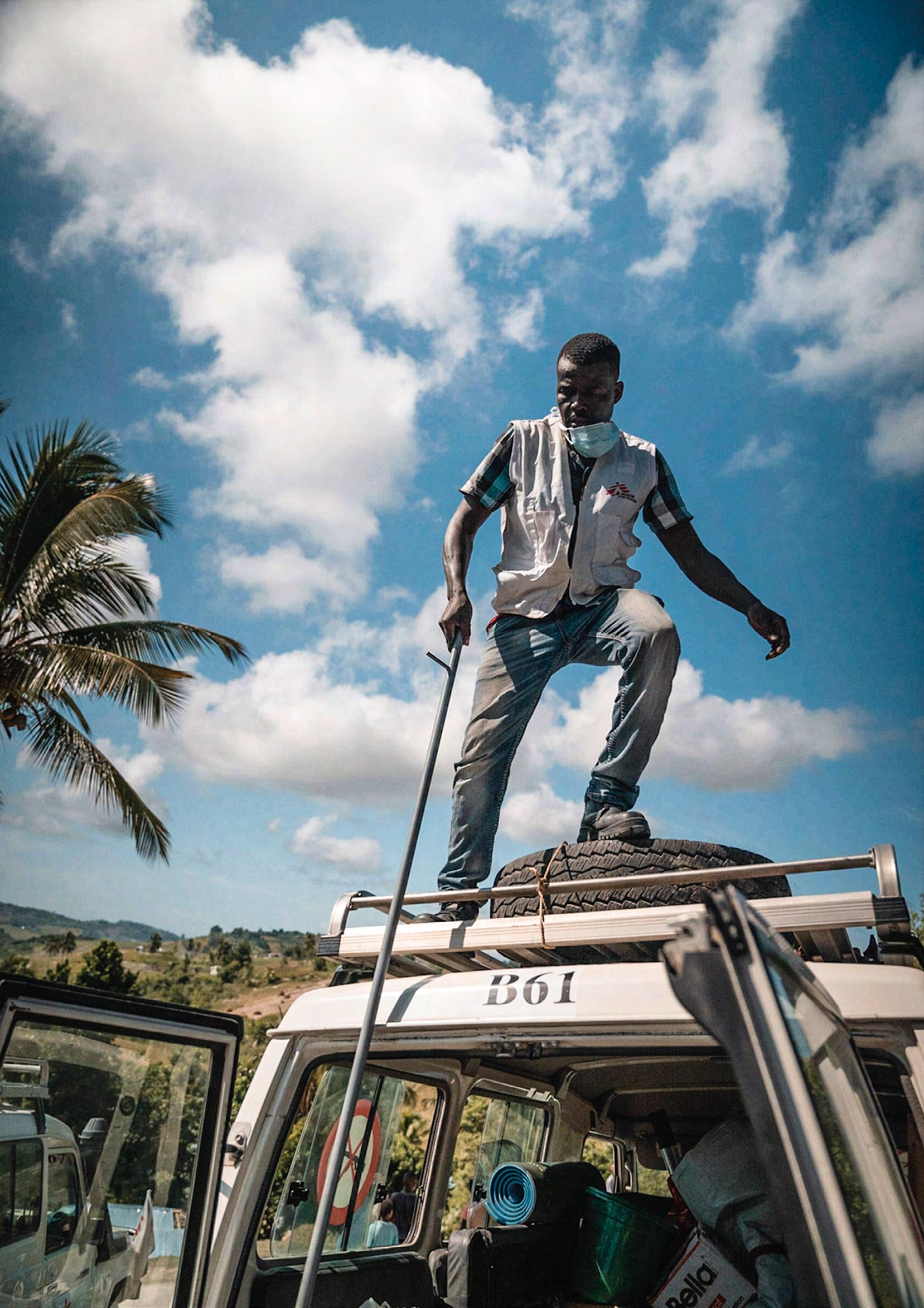 Watson, a Médecins Sans Frontières driver, supports mobile clinic activities during the response to the earthquake in Haiti.© Pierre Fromentin/MSF
Watson, a Médecins Sans Frontières driver, supports mobile clinic activities during the response to the earthquake in Haiti.© Pierre Fromentin/MSF
Médecins Sans Frontières Australia
ABN 74 068 758 654
PO Box 847, Broadway NSW 2007, Australia
Phone: +61 2 8570 2600 1300 136 061
Email: office@sydney.msf.org
© 2022 Médecins Sans Frontières Australia www.msf.org.au
